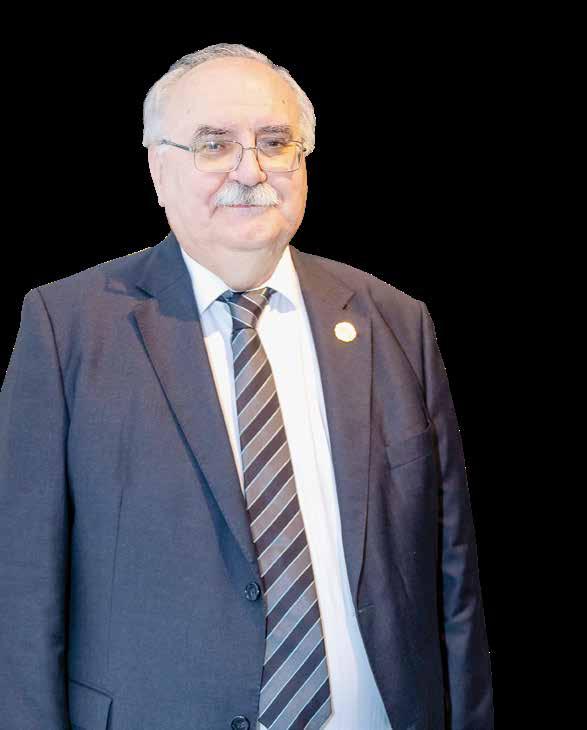







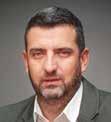








interviews opinions news comments events www.cordmagazine.com OCTOBER 2023/ ISSUE NO. 228 9 771451 783002 ISSN1451-7833
NALED
LET’S PROTECT THE PLANET
SUPPORT FOR RESULT-ORIENTED DIALOGUE
Slobodan Krstović Director of the
Sustainable Development Department
H.E. Silvia Davidoiu Ambassador of Romania to Serbia
TV MAINLY SERVES THE AUTHORITIES COMMENT The Regatta Principle Would be an Apt Response FOCUS EU Enlargement: Awaiting a Sea Change Strong Partnership THE WORLD IN MOTION STRIVING FOR SUSTAINABILITY Radical Change to the Dominant Model of Culture Required EXCLUSIVE Academic Zoran Knežević President of the Serbian Academy of Sciences and Arts (SANU)
Jovan Memedović journalist and television presenter


06 THE REGATTA PRINCIPLE WOULD BE AN APT RESPONSE SLOBODAN ZEČEVIĆ
18 AWAITING A SEA CHANGE EU ENGLARGEMENT FOCUS

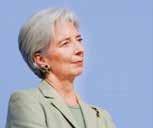
43 BUSINESS DIALOGUE

EDITOR IN CHIEF: Neda Lukić n.lukic@aim.rs

DESIGN: Slađan Radosavljević Zoran Perović design@aim.rs
COPY EDITOR: Mark Pullen
TRANSLATION & EDITING: PULLEN EDITORIAL HALIFAX
CONTRIBUTORS: Ljubica Gojgić, Zoran Panović, Radmila Stanković, Maja Vukadinović, Mirjana Jovanović, Miša Brkić, Rob Dugdale, Steve MacKenzie, Zorica Todorović Mirković, Sonja Ćirić, Miloš Belčević
PHOTOS: Zoran Petrović
69 IS THE GALLERY DEAD? ART
SALES MANAGERS: Biljana Dević b.devic@aim.rs Mihailo Čučković m.cuckovic@aim.rs

Nataša Novković n.novkovic@aim.rs
OFFICE MANAGER: Svetlana Petrović s.petrovic@aim.rs
FINANCE: Dragana Skrobonja finance@aim.rs
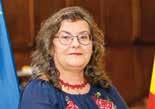
EXECUTIVE DIRECTOR: Maja Vidaković m.vidakovic@aim.rs
DIRECTOR: Ana Novčić a.novcic@cordmagazine.com
PUBLISHER: Ivan Novčić i.novcic@aim.rs


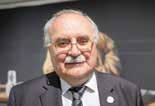
PRINTING: Rotografika d.o.o.
Segedinski put 72, Subotica
CorD is published by: alliance international media d.o.o.
Prote Mateje 52, 11111 Belgrade 17, PAK 125806, Serbia
Phone: +(381 11) 2450 508
E-mail: office@aim.rs

office@cordmagazine.com www.cordmagazine.com www.aim.rs
ISSN no: 1451-7833
All rights reserved alliance international media 2023
04 october
Contents
“CorD does not criticise or critique. We are a place where people can inspire and be inspired by others”
The views expressed in this publication are those of the presenter; they do not necessary reflect the view of publications published by alliance international media @CorD_Magazine @cordmagazine @thecordmagazine cordmagazine
27 STRIVING FOR SUSTAINABILITY 59 THE WORLD IN MOTION 74 TV MAINLY SERVES THE AUTHORITIES JOVAN MEMEDOVIĆ journalist and television presenter 24 CHRISTINE LAGARDE’S GIFTS TO POPULISTS BY YANIS VAROUFAKIS OPINION 08 RADICAL CHANGE TO THE DOMINANT MODEL OF CULTURE REQUIRED ACADEMIC ZORAN KNEŽEVIĆ President of the Serbian Academy of Sciences and Arts (SANU) 12 SUPPORT FOR RESULT ORIENTED DIALOGUE H.E. SILVIA DAVIDOIU Ambassador of Romania 56 THE ARCHITECT OF MODERN ASSET MANAGEMENT
FINK 67 EVERY DAY IS AN OPPORTUNITY TO DO GOOD TATJANA DRAŽILOVIĆ
of NGO Centre
86 FACES & PLACES STRIVING FOR SUSTAINABILITY THE WORLD IN MOTION
LARRY
founder
Star - Centar Zvezda

sometimes wonder whether it’s even possible to be a Serbian patriot and not to love France, or to be French patriot while opposing the Serbs? A special bond was forged between the two countries and peoples in the first half of the 19th century. After the restoration of Serbian statehood, the country sent its top cadets to French universities, thereby gaining a national elite that would go on to create one of the most pro-
The Regatta Principle Would be an Apt Response
By Slobodan Zečević Ph.D.
Following two decades of fruitless pre-accession activities, the EU is losing credibility in the Western Balkan countries, making it an imperative to find solutions that tangibly advance the Union’s enlargement policy. This September’s report of the Franco-German expert group could represent a positive step in that direction

de Gaulle. During the post-war period, members of the Serbian community contributed to redeveloping the French economy, while Serbian artists created their works in France, or with French encouragement and support.
gressive, democratic states in the Europe of the early 20th century. Fighting side by side in the trenches of the Great War, Serbian and French soldiers quickly established a relationship of brotherhood and solidarity, despite speaking different languages. Thousands of Serbian children were also saved from the maelstrom of war and educated at French primary and secondary schools. During World War II, General Dragoljub ‘Draža’ Mihajlović, leader of one of the two resistance movements in the then occupied Kingdom of Yugoslavia, maintained close relations with the leader of the Free French forces, General Charles
France and Serbia are today connected by new political challenges, and Serbia primarily desires to join France in the EU. Following two decades of fruitless pre-accession activities, the European Union is losing credibility among the citizens of Western Balkan countries. That’s why it’s necessary to find solutions that tangibly advance the Union’s enlargement policy. This September’s report of the Franco-German expert group, which received the support of ministers for European integration, could represent a positive step in that direction. It should be noted that difficulties in the functioning of the EU’s institutional system ensure that it isn’t able to receive a larger number of new member states simultaneously. Furthermore, current candidate countries find themselves at different stages of European integration and economic development. As such, the Franco-German idea of applying the regatta principle would represent an appropriate response. It is my consideration that Serbia and Montenegro, as the countries that have advanced the most in accession negotiations, should
be accepted as members by 2030. The Union would thus send a clear signal validating its pre-accession policy. In the meantime, it is necessary to enable these two countries, but also other candidate countries, to be included in EU programmes in stages and to receive the same funding from the pre-accession funds as existing member states.
Viewed from a Serbian perspective, the Franco-German plan for Kosovo includes two compromise solutions and several others that would be difficult to implement. Firstly, the establishment of the Community of Serb Municipalities (ZSO) offers partial implementation of the 2013 Brussels Agreement for the ethnic Serb community in Kosovo. Unfortunately, the powers and responsibilities of the ZSO, as envisaged in the original text of the agreement, are being brought into question. Serbia will not be obliged to formally recognise the independence of Kosovo in the period ahead and, in return, will recognise Kosovo’s formal documents (passports, identity cards, stamps/seals), agree for Kosovo to appear at international summits without the star indicating that it is a territory under UN protection and allow Kosovo to become a member of international organisations. These demands will shake the very foundations of Serbian foreign policy.
06 october
I
COMMENT
For France, due to historical and political reasons, Serbia is a key partner on the territory of the former Yugoslavia
Centre Star’s souvenirs are handmade by young people who have left state care or come from dysfunctional families.


All money from the sale is used for the realisation of the programme that helps them become independant.
OUR PRODUCTS
Scented candles
Christmas decorations
Door wreaths
Coasters
Pen holder
Table ikebana
Wooden children’s puzzle Christmas boxes...


Each of our products bears the name of a young person whom we have helped...

All products can be branded

The product catalogue is available by request request, by e-mail centarzvezda@gmail.com






Radical Change to the Dominant Model of Culture Required
Academic Zoran Knežević
President of the Serbian Academy of Sciences and Arts (SANU)
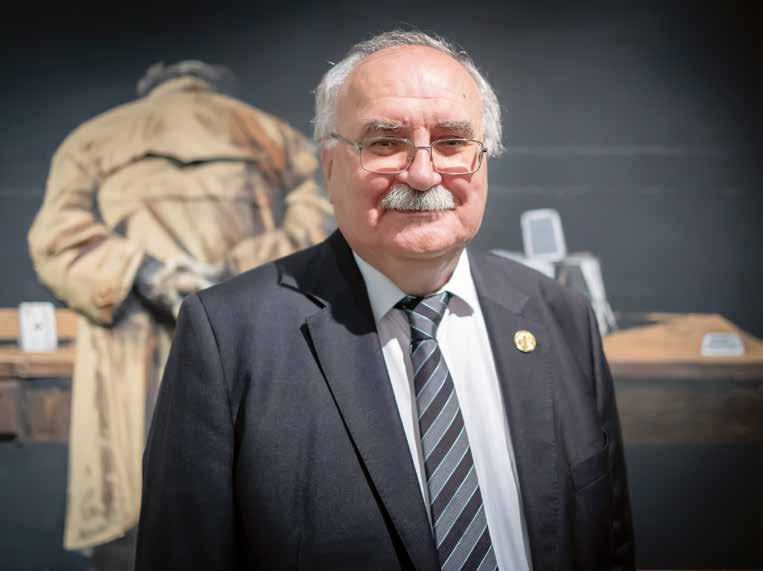 By Ljubica Gojgić
By Ljubica Gojgić
EXCLUSIVE INTERVIEW
08 october
There is no guarantee that we will succeed in this endeavour, at least not in the foreseeable future, especially when it comes to breaking the SANU Gallery’s impressive attendance record that has stood since 1984. However, we could at least state with a clear conscience that we have exerted efforts to leave behind a better world for our children than the one we inherited from our parents – adds SANU President Zoran Knežević in this interview for CorD Magazine.
Mr Knežević, SANU is currently commemorating the centenary of the birth of great painter, writer, filmmaker and Academy member Miodrag ‘Mića’ Popović. Apart from the two exhibitions that have already been unveiled – a smaller one at the SANU Library and a larger retrospective exhibition at the SANU Gallery – how else is the Academy celebrating the legacy of this distinguished former member? – Permit me to remind your readers that the Serbian Academy of Sciences and Arts is this year commemorating the centenary of the births of two important academics and painters: Miodrag ‘Mića’ Popović and Milorad ‘Bata’ Mihailović. To mark this exceptionally special occasion, large retrospective exhibitions have been arranged at the SANU Gallery to present the works of these two great artists and friends, rebels against the dogma of socialist realism in art, who were connected, among other ways, by hav-
ing both belonged to the famous “Zadar Group”, which they co-founded with a group of their fellow students. The exhibitions are accompanied by outstanding catalogues that have been published by the Academy, with the one representing Popović’s work having been prepared by art historian Dr Vesna Kruljac, assistant professor at the University of Belgrade Faculty of Applied Arts. Throughout the exhibition’s run, visitors are able to watch excerpts from Popović’s films, while
lectures by Dr Kruljac and other experts have also been organised, dedicated to researching and interpreting Popović’s creative work. Apart from the exhibitions, the central event with which SANU is commemorating the legacy of its prominent members is a scientific conference under the working title “Polemic Aspects of Post-1945 Serbian Modernism With A Particular Focus on the Actions of Zadar Group Members”, which will take place at the Academy on 17th and 18th October and will focus on shedding light on Serbian modernism from a new perspective and re-evaluating the Zadar Group’s contribution to our fine art scene. You have already mentioned the smaller, chamber exhibition dedicated to Mića Popović at the Library of the Academy, while SANU has also used the Popović works preserved in its collection to participate in exhibitions at other galleries in Belgrade, Kikinda and elsewhere.
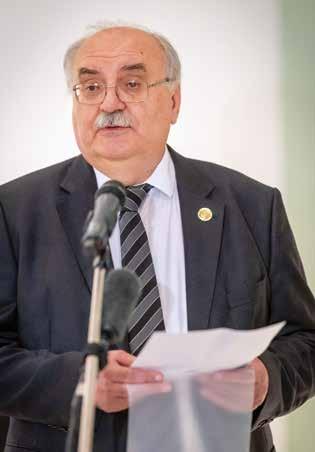
The title of the Popović retrospective exhibition includes the wording “The Art of Permanent Rebellion”. In the case of this academic and painter, that rebellion wasn’t merely artistic, but rather also implied an engaged, critical perspective on events occurring in society. This brings us neatly on to the unavoidable and eternal question of determining the correct relationship between the Academy and politics?
— I think this question needs to be observed in the context of the position of the Academy, as defined by the Law on SANU and the Statute of the Academy, as “the highest scientific and artistic institution of the Republic of Serbia”, and then for such a designation to determine its appropriate role in society. In a broader sense, this position is also determined by the dual nature of the Academy, i.e., its operational and honorary roles.
It could be stated that SANU’s authority is unquestionable in our scientific and artistic milieu, that what the Academy does and says is highly re-
cordmagazine.com 09
It could probably be stated that SANU’s raison d’etre, at least to a certain extent, is identified with its permanent active participation in the ambitious endeavour of creating a modern, more humane and more tolerant society, within that framework of social and political awareness, and many view this as a natural and implied obligation of the Academy ~ academic Zoran Knežević
spected; beyond its own framework, in the political sphere, the Academy – in accordance with the aforementioned definition – rarely speaks out, and particularly not with regard to daily political issues, because it isn’t organisationally structured like a political party that formulates an opinion or common stance that it then promotes publicly. In accordance with its structure, the Academy is an assemblage of independent individuals, intellectuals who can, and often do, have completely contradictory political views and opinions, with which they appear in public of their own accord, independent of the Academy, individually or in groups, on the basis of their own feelings and needs. In this regard, a question arises as to the extent to which decisionmakers in society are prepared to listen to the well-intentioned and science-based assessments and advice of their own top scientists that have been formed through, among other things, national academies, but also the responsibility of academies for the advice that they offer.
The Academy maintains its relations with the state and its executive bodies primarily via an open and constructive dialogue, but also through collaboration with every opportunity for the competences of the Academy to be beneficial to the state and society. In so doing, the Academy acknowledges and appreciates the various social frameworks in which we operate, with the essential political distancing that results from the requirement for the Academy to be independent and to operate primarily in the service of the general good, and not any particular interest.
You were elected SANU president this March. In accepting to take on the position, you promised continuity and to direct SANU “towards safe harbours”. What would you single out as your priorities?
– The leadership of the Academy is confronted by many obligations and responsibilities, alongside the performing of daily tasks. I would use
this opportunity to single out just a few of the most important activities that marked the first months of my mandate to a large extent.
Partly due to circumstance, in the first few months of its mandate, alongside its regular work related to providing the institution with the conditions required to operate and function, the new SANU leadership devoted the great-
of having very wide international cooperation and visibility.
Numerous activities that are in the focus of the attention and engagement of the leadership unfold constantly at the Academy, including the holding of numerous scientific gatherings, lectures, panel debates and roundtable events, exhibitions and concerts. All these activities are progressing at full steam, and let me note with satisfaction that they are also prepared in a very high-quality way and are well attended.
est attention to advancing our Academy’s international cooperation with academies across the region, but also in a broader European and global context, as well as improving SANU’s cooperation with international academic associations, universities and the like. Numerous contacts were established, multiple meetings were held, and we had several visits and encounters. So, it could be said that we renewed some important collaborations and improved some others, and – together with what we inherited from the previous period on this front – SANU can now boast
We are awaited in the year ahead by elections for new regular, correspondent and foreign members, so at this moment the Academy and its leadership are already somewhat turning –through a series of preparatory activities – towards that challenge and the important work that lies ahead of us.
Work is also continuing on capital national projects, such as the compiling of the SANU Dictionary and the Serbian Encyclopaedia, which require the constant attention and engagement of the SANU leadership and members.
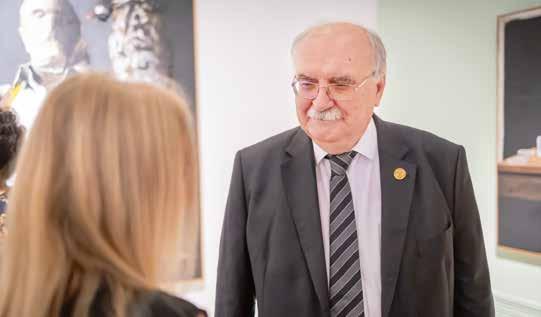
New volumes and books are expected soon, constant care of the Serbian language and script is taken etc.
SANU has responded to numerous existing challenges over the previous period. Its scientific summits
10 october
I would remind your readers that SANU is this year commemorating the centenary of the births of two important academics and painters: Miodrag ‘Mića’ Popović and Milorad ‘Bata’ Mihailović
POLITICAL VIEWS
In a broader sense, SANU’s political position is also determined by the dual nature of the Academy, i.e., by its operational and honorary roles
have contributed to discussions regarding healthcare (during the Covid-19 pandemic) and energy sources (with reference to smallscale hydro power plants and mining practises), as well as declaring its position on Kosovo. Should the Academy continue down that path? — I am able to state unreservedly that SANU has – with the work and activities it has carried out over the previous period, coupled with the values it promotes and the standards it applies – achieved significant results and become an exemplary, well-organised, functional institution and a centre of cultural, scientific, artistic and intellectual life generally in our neighbourhood. It is thus completely self-evident that the central pillar of the work programme of the new SANU leadership is “rational and realistically achievable continuity in the work and activities of the Academy, or in the managing of its affairs in accordance with the highest standards appropriate to our house”.
The answer to your question is therefore a simple ‘yes’: the Academy should, and is, continuing along the same path and responding to current challenges, with an additional essential clarification: that it does so wherever it possesses the required competences to address a given problem and wherever it is able to contribute realistically and constructively to resolving said problem.
The tragic shooting at Belgrade’s Vladislav Ribnikar Primary School has led to talk across Serbia about a crisis of education and the disruption of the system of values that largely develops during the school education process. What would you say about the current state of Serbia’s education system?
COLLABORATION
In the first few months of its mandate, the new SANU leadership devoted the greatest attention to advancing our Academy’s international cooperation with academies across the region, Europe and worldwide
— The Academy devotes a lot of attention to education, as evidenced –among other things – by the fact that operating actively under its auspices are the SANU Board for Education and the SANU Board for Higher Education. In the context of your question, the best answer – to which I have nothing to add personally – was provided two years ago, when a large scientific conference was held at SANU under the title “Education: status, perspectives and role in the development of Serbia”. This conference included the presentation of a voluminous publication
CHALLENGES
The Academy should respond to current challenges, wherever it possesses the required competences to address a given problem and is able to contribute to resolving it realistically and constructively
have been organised at the SANU Gallery of Science and Technology.
containing key data points on the state of education in Serbia, as well as the defining of recommendations for improving education in Serbia, which were then submitted to the public and all relevant state bodies and national educational organisations and institutions, while the conference ‘Proceedings’, representing a collection of works presenting transcripts of authorised discussions from the conference, were also published. I would also mention the fact that multiple lectures and panel debates held at SANU in recent times have also addressed various relevant topics related to education, while several exhibitions covering the topic of education
Returning to the exhibition of Popović’s paintings, it has been stated that half a million people saw his 1984 exhibition, which set a SANU Gallery record. At this time when there is plenty of talk of the need to redefine the model of culture, particularly among young people, what needs to be done to break that 1984 exhibition attendance record? — It could probably be stated that SANU’s raison d’etre, at least to a certain extent, is identified with its permanent active participation in the ambitious endeavour of creating a modern, more humane and more tolerant society, within that framework of social and political awareness, and many view this as a natural and implied obligation of the Academy. Many people will probably also agree with the ascertain that our society needs a radical change to the predominant model of culture, if not “conceptualising a completely new world” – to paraphrase the words of my esteemed predecessor as SANU president, academic Vladimir S. Kostić. I couldn’t say that I know for certain what needs to be done and how in this sense, but I am certain that this must be the goal, at least in principle, that we all strive to achieve, including the Academy. There is no guarantee that we will succeed in this endeavour, at least not in the foreseeable future, especially when it comes to breaking the SANU Gallery’s impressive attendance record that you mention. However, we could then at least state with a clear conscience that we have exerted efforts to leave behind a better world for our children than the one we inherited from our parents.
11 cordmagazine.com
We are awaited in the year ahead by elections for new regular, correspondent and foreign members, so at this moment the Academy and its leadership are already somewhat turning – through a series of preparatory activities –towards that challenge and the important work that lies ahead of us
Support For Result Oriented Dialogue
H.E. Silvia Davidoiu Ambassador of Romania
By Ljubica Gojgić
Romania has a consistent and principled position on the non-recognition of Kosovo’s unilateral declaration of independence. We maintain a constructive approach on the issue, without prejudice to our national position. It is the primary responsibility of Belgrade and Pristina to reach a comprehensive and definitive solution ~ Silvia Davidoiu
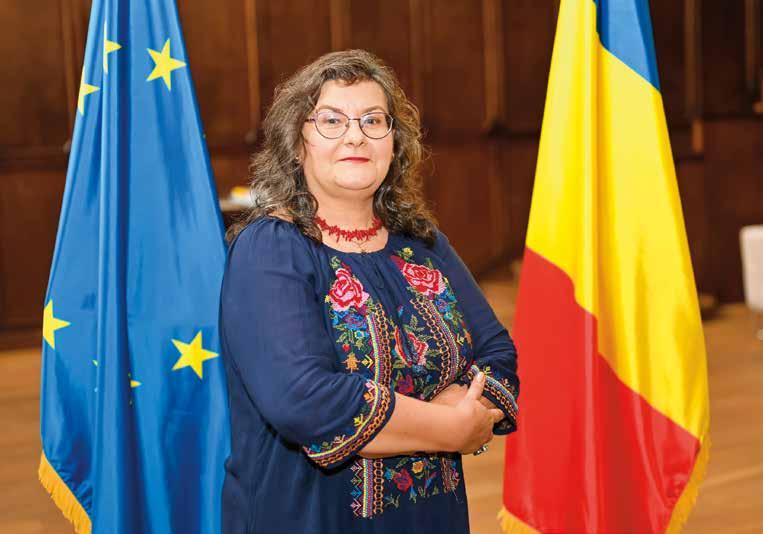
12 october INTERVIEW
Romanian Ambassador to Serbia Silvia Davidoiu speaks enthusiastically about the strengthening of economic cooperation between the two countries. Speaking in this interview for CorD Magazine, she says that she is looking forward to the next few years. “I expect the fruition of our ambitious, long-planned strategic connectivity projects, and the launching of new partnerships in the agriculture, IT and energy sectors”. And this cooperations is set to be crowned with the construction of a motorway that will reduce travel times between Belgrade and Timișoara to just one hour.
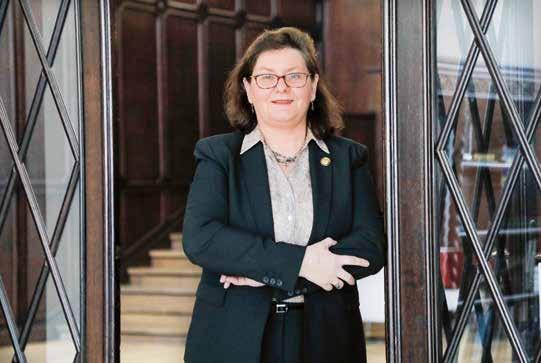
Your Excellency, as the Ambassador of a country that enjoys a high level of understanding and cooperation with Serbia at the political level, you often mention the various possibilities of advancing bilateral economic cooperation. Could you cite progress achieved in this area over the past two years?
— Economic cooperation has substantial potential to further our countries’ growth, having a direct impact on the wellbeing of our citizens and the substance of our bilateral relations. Moreover, it provides a comprehensive vision and additional means to further develop our ties.
One short answer to your question refers to the formal agreements on transport connectivity (e.g., the Timisoara-Belgrade highway/expressway), positive developments in bilateral trade, with a total value surpassing €2.6 billion in 2022, and new initiatives on energy security, aside from the Arad-Mokrin gas interconnector. Over the past two years, we have also diversified our presence on the Serbian market with additional domains (apart from industry) attracting Romanian entrepreneurs. As an example, during this period, Instant Factoring, a Romanian company in the fintech sector, has offered innovative and accessible financing solutions to Serbian SMEs. In April 2023, we also organised a business forum as a pre-
liminary step towards new, regular B2B meetings between Romanian and Serbian companies (operating in the agriculture, energy, construction, industry, ITC and other sectors), aimed at strengthening bilateral economic relations through mutual investments and exchanges. We are committed to implementing all these projects and count on the Serbian side’s engage-
Cross-border cooperation between Romania and Serbia, with the support of IPA funds, has a long history of successful partnerships. In the 2014-2020 programming period alone, 84 projects were contracted
ment in this regard. We are active in some of the economic areas that are most relevant to Serbia’s comprehensive security and sustainable development.
I look forward to the next few years. I expect the fruition of our ambitious, long-planned strategic connectivity projects, as well as the launch of new partnerships in agriculture, IT and energy – all sectors that are ex-
panding in Romania, possibly with an external expansion outlook. To give you an example, with my country currently exploring offshore gas reserves, implementing SMR technologies for nuclear power and capitalising the investments of top Romanian players in renewables, I expect my country to consolidate its position as a net energy provider for the region, including Serbia.
How do Romania and Serbia utilise the European Union funds that are provided through the IPA funding mechanism to improve cross-border cooperation?
— Cross-border cooperation between Romania and Serbia, with the support of IPA funds, has a long history of successful partnerships. In the 20142020 programming period alone, 84 projects were contracted, representing 99.98% of the programme budget, with an absorption rate in excess of 95%. This impressive track record encourages us to believe that this IPA instrument will continue to forge new forms of collaboration between our countries.
As for the 2021-2027 period, the Interreg IPA Romania-Serbia Programme
13 cordmagazine.com
was the first of its type to be adopted by the European Commission. It focuses on promoting energy efficiency and renewable energy, reducing emissions of greenhouse gases and all forms of pollution, improving equal access to inclusive and quality services in education and health, enhancing the role of culture and sustainable tourism in furthering economic development, and increasing border management capacity. Climate and energy objectives receive 35% of the total allocation of the IPA Interreg Romania-Serbia Programme in the 2021-2027 cycle, as a direct contribution to the European Green Deal and the Green Agenda for the Western Balkans. Moreover, 52% of the Programme’s financial package is dedicated to projects of strategic importance and large infrastructure projects in the fields of healthcare, border management, risk management and emergency situation response.
We are seeing EU accession enthusiasm waning in Serbia, with many believing that this is due to the slowness of the integration process. Serbia has opened only slightly more than half of the accession negotiation chapters, despite the process having started more than a decade ago. It was almost two years ago that the last cluster was opened, which is also when you arrived in Serbia. Does such a tempo contradict the messages coming from the EU about a strong new commitment to the expansion of the bloc to encompass the Western Balkans?
— The EU’s commitment to the European perspective of the Western Balkans is firm and unabated, as reiterated in the European Commission President’s State of the Union Address on 13th September. However, the pace of negotiations depends entirely on candidate countries fulfilling the necessary criteria, particularly on the fundamentals.
EU accession is a two-way street, with regard to the EU’s capacity and willingness to accept new members
and candidate countries’ consistent and measurable efforts to meet clearly-defined benchmarks. This has been a constant feature, regardless of the revisions of the process conducted over previous years.
tries were granted EU candidate status over the past year, including one from this region. The process is therefore advancing and the messages do match the actions.

On the other hand, the second track of European integration relates to their merit-based quality and it is thus the sole responsibility of candidates and potential candidates to determine the pace of reform. This implies that, by the time of accession, these countries should be strategically aligned with the EU and fully harmonised with the acquis, including when it comes to respect for fundamental rights and compliance with the EU’s Common Foreign and Security Policy. This is a key aspect that ensures the sustainability of political and economic partnerships with candidate and potential candidate countries, creating the conditions for a strengthened EU.
The statement of the President of the European Council regarding some countries of our region being possibly admitted into the EU in 2030 garnered a lot of negative comments in Brussels. Can we continue to take the enlargement process seriously without specific dates for the next round of enlargement?
On the one hand, the messages from the EU and its Member States clearly testify to the first track of this process being open and unobstructed for those Western Balkan and Eastern European countries that fulfil the accession criteria. That represents encouragement for these partners to internalise European values and principles in their entirety. Three more coun -
— Charles Michel’s recent reference to the bloc’s readiness to accept new members is firstly a confirmation that enlargement remains a top priority for the EU over the coming years. It is also encouragement for candidates to increase the tempo of key reforms in order to secure solid and irreversible achievements that are in line with each partner’s relationship with the EU, in a dynamic and merit-based approach. It therefore represents an appeal for active and consistent engagement on all sides for the new enlargement of the EU. The President of the European Council was explicit in his speech in Bled about the imperative of ensuring the process remains credible. This is dependent on the EU’s openness to continue the enlargement process, but also on candidates’ fulfilment of necessary bench-
14 october
The messages from the EU and its Member States clearly testify to the first track of this process being open and unobstructed for those Western Balkan and Eastern European countries that fulfil the accession criteria
DIALOGUE
Romania reasserts its full support for the EUmediated Political Dialogue, which represents the only adequate framework to normalise relations between Belgrade and Pristina
marks. Again, the twin-track approach of advancing on the basis of merit remains in place, so there is consistency in messaging, just as we are on the same page in our understanding that Western Balkan (and Eastern European) states belong within the Union. Whether we manage to meet this mutual goal within a specific timeframe depends on all of us. We all need to take the process seriously in order to make EU integration happen and to keep it within the lines of a successful policy for the transformative effect on candidates and potential candidates and the bloc’s internal coherence and external appeal and action.
There are frequent calls coming from within the EU that encourage Serbia to change its stance on Kosovo, but also the EU Member States that have chosen not to recognise the unilaterally declared independence of Kosovo. Will Romania maintain its stance on this issue?
— First, allow me to offer a few clarifications: we have not experienced any calls or pressure to change our stance regarding the status of Kosovo. The interactions we have had with third parties on this topic were more in line with evaluating our position in the context of our common renewed interest in firmly advancing the dialogue and reconciliation between Belgrade and Pristina. This is an approach that we welcome and encourage in an effort to dispel any misunderstanding.
Romania has a consistent and principled position on the non-recognition of Kosovo’s unilateral declaration of independence. We maintain a constructive approach on the issue, without prejudice to our national position. It is the primary responsibility of Belgrade and Pristina to reach a comprehensive and definitive solu-
ENERGY
I expect my country to consolidate its position as a net energy provider for the region, including Serbia
EU
Charles Michel’s recent reference to the bloc’s readiness to accept new members is firstly a confirmation that enlargement remains a top priority for the EU over the coming years
— Our respective national minorities have anchored our relations in a state of mutual respect and good neighbourliness, despite the changes experienced by our countries in recent history. They are also a source of constant enrichment for our historic ties and provide a reference point to the quality of the overall Romanian-Serbian dialogue. We cherish this outstanding bond and remain constructive, open and transparent in our support for the rights of those belonging to our ethnic minorities.
Romania’s constant interest in the preservation of the cultural ethos of its national minority, its mother tongue and religious identity, is consistent with European standards in this field, which are crucial for a democratic society.
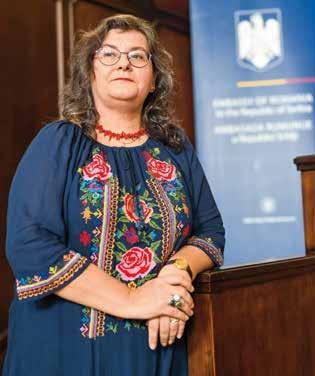
tion. My country joined the efforts of the EU and other relevant actors in supporting the normalisation process through result-oriented negotiations between the two parties.
Romania reasserts its full support for the EU-mediated Political Dialogue, which represents the only adequate framework to normalise relations between Belgrade and Pristina. Against the backdrop of persistent tension, the two sides need to reengage in this framework to identify a solution that reflects their respective interests and contributes to the peace and stability of the region, with full respect for all agreements reached to date in the EU-facilitated dialogue process.
Are you satisfied with the status and treatment of members of the ethnic Romanian community in Serbia?
Serbs in Romania enjoy all the rights stipulated by the relevant international documents: parliamentary representation, education, religious services and media in their native language. They are active in local administrations and provide an important contribution to our society. We would like to see all citizens that identify as Romanian in Serbia fully enjoying the rights provided by the national legislation and international documents signed by the state, and provided by requirements on the EU accession path. Differences nonetheless persist, with Romanians in Eastern Serbia having restricted access to education, media and religious services in their mother tongue, as well as limited representation in local and national administration, in contrast to those residing in Vojvodina. These issues should be substantively tackled within the framework of the Romanian-Serbian Joint Intergovernmental Commission for National Minorities, the third protocol of which is currently being negotiated.
15 cordmagazine.com
We have positive developments in bilateral trade, with the total value surpassing €2.6 billion in 2022
Global Diary Mediterranean Storm Daniel Passed Through Libya

On September 11, two dams collapsed, sending 30 million cubic meters of water into already inundated areas. The eastern Libyan city of Derna, home to less than 100,000 people, was hit worst, with 25% of the city disappearing. With so much damage to internal infrastructure, there are fears that infectious disease from the dirty flood water and damaged sanitation system could soon take
The International Federation of Red Cross and Red Crescent Societies (IFRC) has announced an emergency appeal for 10 million Swiss Francs to scale up the Libyan Red Crescent’s relief efforts in response to the floods caused by Storm Daniel in north-eastern Libya.
78th Session of the UN General Assembly
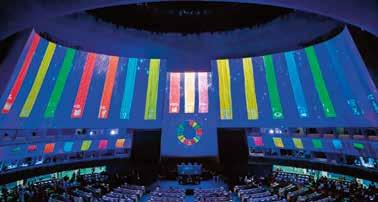
EU and world leaders gathered in New York for the 78th session of the UN General Assembly. Much of the focus during the gathering was on tackling the effects of climate change, conflict resolution and the implementation of the UN’s 2030 Sustainable Development Goals (SDGs).
While the UN appears to be falling short on climate change efforts and conflict resolution, EU countries demonstrated some positive progress with regard to the implementation of the SDGs. After receiving more than 100 applications to take part, the UN released a list of 41 speakers which did not include China, the United States, the United Kingdom, Japan, or India.

Rupert Murdoch Steps Down as Fox and News Corp. Chairman
Rupert Murdoch (92), whose sheer force of will allowed him to build a media empire that influenced the course of national politics in the U.S., U.K. and Australia, will step down as the titular head of the companies he controls, Fox Corp. and News Corp. — a move that could raise new questions about the fates of both assets.
Lachlan Murdoch, his son, will take over the chairman role at both companies, which between them operate Fox News Channel and The Wall Street Journal in the U.S. and The Times and The Sun in the U.K. Rupert, will shift into an emeritus role.

16 october
“The UN governance system has become dysfunctional. The system must be reformed to make it fairer and more inclusive.”
Charles Michel European Council President
Rupert Murdoch and Lachlan Murdoch
Deadly Clashes in Northern Kosovo
In one of the worst confrontations since Kosovo declared independence from Serbia in 2008, about 30 masked men opened fire on a police patrol near the village of Banjska early September 24th then broke down the gates of a Serbian Orthodox monastery and barricaded themselves with the priests and visiting pilgrims. The violence further raised tensions in the Balkan region at a time when European Union and U.S. mediators have been pushing for a deal that would normalize ties between former wartime foes Serbia and Kosovo.
A daylong shootout between armed Serbs and Kosovar police left one officer and three gunmen dead.
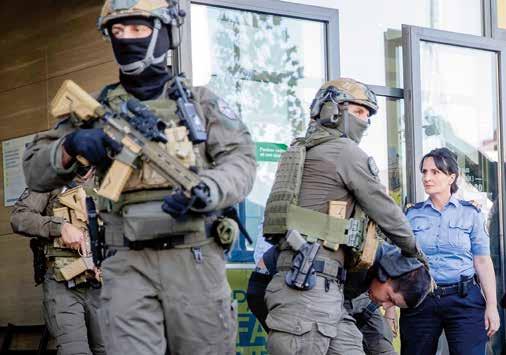
Trump and Company Liable for Fraud

A judge has ruled that Donald Trump committed fraud for years while building the real estate empire that catapulted him to fame and the White House.
Former US president Donald Trump and his family business have been found liable for fraud in a New York court. He is accused of lying for a decade about asset values and his net worth to get better terms on bank loans and insurance Trump and his family business were found liable by a New York judge in state Attorney-General Letitia James’s civil lawsuit accusing the former US president of illegally inflating his assets and net worth. Trump inflated his net worth by as much as $3.4 billion.

Exodus of Karabakh Armenians Continuess
Thousands of ethnic Armenians have left the territory of Nagorno-Karabakh end last month, following the short Azerbaijani military operation on 19 September.
Official Armenian sources said that by 26 September, 28,120 persons had crossed over to the territory of the Republic of Armenia. Of these 3,253 were provided with temporary accommodationthe rest saying that they were making their own arrangements.
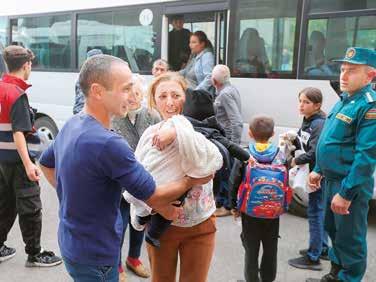
17 cordmagazine.com
“Climate action is not a Global North issue or a Global South issue. It is our collective challenge, and it affects all of us. We need to come together to find common, global solutions.”
William Ruto President of Republic of Kenya
Awaiting a Sea Change

The Russo-Ukraine conflict has certainly reinvigorated the focus on strategic planning within the EU, but this potential shift towards a more favourable outlook for the integration process doesn’t mean that there will be shortcuts for less enthusiastically engaged candidate countries
European enlargement has encountered a standstill over the previous two decades, due both to enlargement fatigue among existing EU member states and differing approaches among the countries of Southeast Europe that don’t always push hard enough for accession. However, the conflict between Russia and Ukraine has ignited a renewed focus on strategic accession plan-
ning within the EU. Speaking in a recent address, Commission President Ursula von der Leyen outlined the potential for an expanded EU, particularly in the domains of defence and geopolitics. This shift has prompted lively public debate about the EU’s role in Ukraine, but also its strategic place in the new geopolitical circumstances. This prompted us to ask our interlocutors how they see this sea change.
18 october EU ENGLARGEMENT
FOCUS
Bojana Selaković Coordinator of the Serbian Nation Convention on the European Union

Phased Enlargement
The Ukraine crisis opened a new chapter in geopolitical relations, which has certainly been reflected in the EU enlargement process. It is today clearer than ever that the Western Balkan region must maintain strong ties with the Union. Enlargement to encompass the Western Balkans has primarily become an issue with security implications for the EU, and has thus recreated the conditions to restore credibility to a process that has been in question for several years. This, on the one hand, was a consequence of the unwillingness of candidate countries to truly get to grips with essential reforms, while on the other hand it reflects the unwillingness of the European Union to monitor these processes consistently, due to a lack of political consensus on enlargement and the need for internal EU reforms. In Serbia, this situation, coupled with the constant strengthening of soft Russian influence via different figures in society, has led to a significant increase in Euroscepticism, which has created space to further promote anti-European perspectives in the political sphere. Only the aggression against Ukraine has demonstrated possible long-term consequences of these processes for the region as a whole, and thus also for the Union itself. Accordingly, we have seen the intensifying of numerous processes which have the role of, on the one hand, restoring confidence within candidate countries regarding the seriousness of the EU’s enlargement intentions, while on the other hand their role is to motivate the speeding up of reform processes without which there can be no progress on accession. When it comes to the specific timeframe that’s currently on the table, it should also be viewed in the context of the EU’s recent Economic and Invest-
ment Plan for the Western Balkans, which was presented by EC President Ursula von der Leyen. Phased accession is probably a realistic plan, given the current capacities of the candidate countries, while it simultaneously also reflects a clear political intention to pursue enlargement, around which there is consensus among all member states.
However, from the perspective of obligations, this changes almost nothing for us, because one of the four pillars of the aforementioned Plan is still related to reforms and progress, especially within the framework of political criteria and the rule of law, which are areas where Serbia has received the harshest criticisms. The difference lies in the fact that institutions and citizens could now feel some tangi-
ble benefits long before the concluding of the accession process, such as, for example, access to the European single market or funds which, in previous rounds of enlargement, only became available with formal membership status. Experiences from previous enlargement rounds showed that there must be no turning a blind eye in these most sensitive areas, such as the rule of law and the struggle to curb corruption and fight crime, as this would threaten the fundamental values of the EU that set it apart from all other political alliances, now or at any previous time in history.
19 cordmagazine.com
FOCUS
When it comes to a specific timeframe for the accession of Western Balkan countries, it is realistic to assume this will be a process that unfolds in stages, given candidate countries’ capacities
Even though the European integration process could speed up significantly, candidate countries must still fulfil all set obligations
Florian Bieber
of
No Clear Plan to Make Enlargement Work
The Ukraine crisis has reinvigorated the political significance of the accession process, potentially aiding Western Balkan integration into the EU, but the current state of regional governments’ commitment to EU integration appears to be lacking genuine prioritisation
There is no doubt that EU candidate status for Ukraine and Moldova has changed the dynamic of integration into the Union. Not only are there now 10 potential new members – if we also include Turkey – but Ukraine is a country that is not just twice the size of the Western Balkans, but also makes a much more enthusiastic claim for membership. I would say that the effects for the Western Balkans have so far been positive. Firstly, it forces the EU leadership to reconsider the current enlargement process. While it is clear that there will be no shortcut to membership for Ukraine, the EU is willing to think much more creatively about the process than it has for a long time. This can only benefit the Western Balkans, as the region is not going anywhere under the current dynamics. There is, however, no clear, unified plan of how to make enlargement work. Overall, there are two ideas that have been gaining support. The first is the notion of a timeline, such as the year 2030 that was mentioned by Charles Michel. However, if this is just a talking point without foundation, it is meaningless. After all, former Commission president Juncker launched the year 2025 for Montenegro and Serbia not that long ago, and today that has been forgotten and rendered irrelevant. Thus, to make such a date useful, it has to be based on a broad EU commitment to enable the countries to join by that date if they are ready. This also entails establishing a clear timeline in order for governments to understand precisely what they have to do to complete the necessary steps to join by that date. Let’s keep in mind that 2030 is not as far away as it sounds. To join, negotiations have to be completed around two years earlier, which means that ac-
cession talks need to be completed by 2028, i.e., five years from now. This means that many laws and other decisions have to be taken and countries have to show a track record. This will not be easy and will require a much more tightly managed process, one that will also enable the public to see which country is lagging where and why.
A second idea that has been gaining support is that of joining the EU in stages, as proposed by the European Policy Centre in Belgrade and the Centre for European Policy Studies in Brussels. The idea here is that a country joins the EU in several stages. It initially receives some benefits prior to joining, such
as access to EU funds and more inclusion in EU institutions, albeit without voting rights. Then, once it joins, there are some limitations that are only lifted after a transition period. In brief, it suggests a stepby-step process, rather than seeing the EU as being in or out. A number of EU governments, such as those of Austria and France, seem to like the idea, but it is unclear if it can gain the full support of the majority of EU member states. It certainly makes sense to combine these two ideas and create a new dynamic for enlargement.
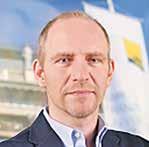
20 october FOCUS
Although there is no quick path to EU membership for Ukraine, the EU is now open to considering a more innovative approach to the accession process than it has been for a while
Professor
Southeast European History and Politics and Director of the Centre for Southeast European Studies at the University of Graz
Milena Mihajlović Programme Director of the European Policy Centre (CEP)
Geopolitics is the Name of the Game
Growing awareness of the importance of preventing a malign Russian influence in Eastern Europe and the Western Balkans is progressively convincing EU stakeholders that tangible incentives need to be offered to EU candidate countries on their path to membership

Russia’s aggression against Ukraine poses the greatest threat to European security since WWII, prompting the EU’s political elites to recognise that enlargement is the best way to secure the EU’s position in the parts of Europe that remain beyond the Union’s borders. The most visible change in terms of enlargement policy was the inclusion of three Eastern European countries in that process with the granting of candidate country status to Ukraine and Moldova, as well as offering broader European prospects to Georgia. The EU also exerted substantial efforts to overcome the obstacles hindering the opening of accession talks with Albania and North Macedonia, as well as granting candidate country status to Bosnia-Herzegovina. Furthermore, EU leaders have also acknowledged that the EU should prepare itself institutionally for the next round of enlargement.
By explicitly mentioning 2030 as a potential year for EU enlargement, the President of the European Council broke a long-standing EU taboo. At the same time, the European Commission continues to back the stance that the accession process must remain merit-based, and thus any promised dates are contingent upon the fulfilment of necessary reforms. In that context, promising a date can be viewed as superfluous and arbitrary. However, the European Policy Centre believes that these two views are far more complementary than they initially appear. Namely, predictability and credibility, as key values of the accession process, can only be achieved if the process is fully merit-based and if accession countries are being gradually rewarded for their improvements in the process. However, at the same time, these two values of the enlargement process could be seriously undermined if there is no
indicative timeframe that would serve to motivate candidate countries to remain committed to the reform process, which will eventually result in them joining the EU, provided the required level of preparedness is reached by a mutually agreed date. In that context, the proposed target year should be viewed as a target towards which both sides (the candidate countries and the EU) should work together, rather than as a promised date of accession for any candidate country.
Membership in the EU requires that aspiring countries fully align with the EU acquis, prepare to compete on the EU’s Single Market and duly strengthen their public administration to handle this important step. Considering this long list and how difficult it has proven to be for Western Balkan countries that are already 20 years into the integration process, the road will most certain-
ly be challenging for Ukraine and other Eastern European countries. In that context, the 2030 target sounds quite optimistic as a timeline for completing all the necessary reforms, especially given the ongoing war and all the devastation it is bringing to Ukraine. On the other hand, Ukraine last year managed to answer the Commission’s questionnaire in record time and secure candidate country status quicker than anyone expected. This certainly constitutes a basis for optimism.
21 cordmagazine.com FOCUS
Setting a target year for the next round of enlargement might prove a crucial booster for reforms on the ground and trigger a much more dynamic accession process among candidate countries’ governments
Nemanja Todorović Štiplija Editor-in-Chief of portal European Western Balkans

Positive Signs, but No Simple Solutions
The first real sign of whether the EU has changed its opinion on the issue of European integration will come after next year’s European elections and the appointment of a new Commissioner for Enlargement. Similarly, it is important whether the reform of decision-making processes in the EU will be initiated, as this is an informal prerequisite for enlargement
The war in Ukraine has elevated the issue of enlargement on the list of EU priorities. It is enough to observe the rhetoric of the French leadership. Prior to the war, this country was rightly perceived as the top sceptic when it comes to accepting new members. However, speaking at the recent Bled Strategic Forum, France’s Secretary of State for European Affairs, Laurence Boone, insisted that “there will be no stability and security in the EU and neighbouring countries without enlargement”. The same panel included Natalie Tocchi, director of Italy’s influential Institute of International Relations, who wrote in a recent editorial piece for Brussels-based Politico Europe that the geopolitical argument in favour of EU enlargement must prevail in the near future.
Nevertheless, not everything is so simple. Although the war has significantly strengthened pro-enlargement currents within the EU, a consensus has yet to be reached. Over the past year and a half, there has been plenty of stumbling when certain steps needed to be taken, such as opening accession negotiations with North Macedonia and Albania. Viewed as a whole, no significant developments should be expected ahead of next year’s European elections. After that, the main elements that the region needs to pay attention to are who will be the new Commissioner for Enlargement and whether the reforming EU decision-making processes will be initiated, which represents an informal precondition for enlargement.
Now that the EU seems readier to accept new members, candidate countries also need to demonstrate their commitment. However, the signals sent to date
are disappointing. The Albania PM and Serbian MFA immediately expressed scepticism over dates, with Serbia’s highest representatives – the president and prime minister – having so far completely ignored the announcement mentioning 2030. One gets the impression that those claiming that many political elites across the region are more comfortable with the status quo than a more serious commitment to the enlargement process are correct.
The year 2030 is indeed realistic for some candidate countries - those that will be ready for accession by that time. Although the Ukraine situation has reinvigorated this process, it is difficult to expect that
it could achieve this state of readiness itself, which is certainly an impossibility while the war continues. On the other hand, Montenegro could achieve it, and probably also North Macedonia, and Serbia could make it too, provided it “buckles down” immediately. The fulfilling of the Government’s programme to adopt EU legislation has remained at a very low level in recent years. Serbia’s Minister of European Integration recently announced that the pace of reforms will be accelerated, and let’s hope that this will be the case – provided new extraordinary elections aren’t prevented in the meantime.
22 october FOCUS
Now that the EU seems readier to accept new members, candidate countries also need to demonstrate their commitment. However, the signals sent to date are disappointing












Christine Lagarde’s Gifts to Populists
By Yanis Varoufakis
Christine Lagarde’s three blunders as president of the European Central Bank
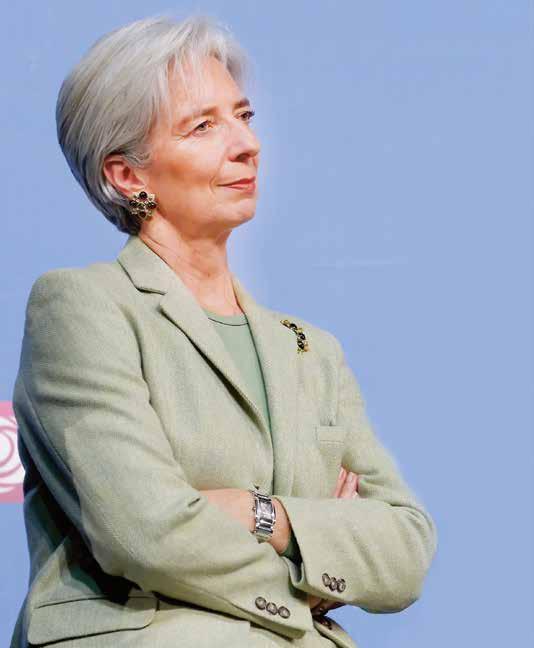
Europe;
The first gaffe cost Italy billions, and the ECB many of the reputational gains that Mario Draghi, Lagarde’s predecessor, previously worked so hard to secure. Recall March 2020: the world was gripped by pandemic-induced anxiety and markets were panicking, especially about the solvency of Italy, a country with gigantic debts and no central bank of its own to print money the way the U.S. Federal Reserve, the Bank of Japan, and even the Bank of England could do.
When asked at a scheduled press conference if the ECB would stand by Italy’s debt to contain interest-rate spreads (the difference in borrowing costs between member-state governments) within the eurozone, Lagarde did not reassure markets and the public by repeating Draghi’s famous promise to do “whatever it takes.” Instead, she did the opposite, declaring: “We are not here to close spreads.” Within seconds, Italy’s debt-servicing costs skyrocketed. While Italy’s government was apoplectic at this, populist opposition leader Giorgia Meloni, who has since become prime minister, was undoubtedly delighted.
The second blunder was less visible, but has had deeper, longer-lasting effects. Ever since the crash of 2008, the ECB has been pushing a wall of money toward Europe’s permanently fragile banks in the hope that they would lend it on to businesses and thereby revive Europe’s flagging econ-
24 october
OPINION
did not cause the revival of right-wing populism across
but they have reinforced it mightily
omy. After 2014, when official interest rates were negative, the ECB was essentially paying bankers to accept hundreds of billions of euros in their ECB accounts. But instead of lending that money to businesses, the bankers simply kept it in their ECB accounts and continued collecting the bribes the ECB was paying them in the form of negative interest rates.
Now that inflation has returned with a vengeance, the same bankers have kept billions parked in their ECB accounts to collect on the higher interest rates, while continuing to pay their depositors minuscule interest. Yet instead of using the ECB’s powers to put the fear of the divine into these bankers, Lagarde has let them run rings around the institution at the expense of small businesses and depositors.
Once again, this has played right into the hands of populist politicians like Meloni, who is benefiting politically by calling for a windfall tax on
bankers. As if that was not bad enough, Lagarde and the ECB have responded to this proposal by taking the bankers’ side. I, for one, cannot imagine a more efficient way to boost the ap-
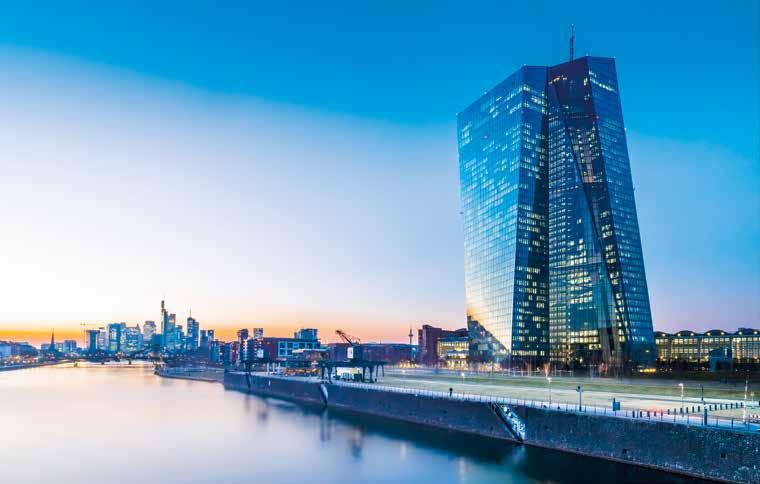
ness, Draghi, too, had presided over terrible forecasts while consistently failing to hit the ECB’s 2% inflation target. But the dragon that he could not slay was deflation – negative or very low inflation – which forced him to cut interest rates first to zero and then to minus 0.5%.
These ultra-loose policies made him an object of hatred among German savers, particularly the proverbial “Swabian housewives.” Still, most workers in Germany and beyond took little notice, because their real (inflation-adjusted) wages were unhurt by deflation, and because they had precious few savings.
peal of right-wing populists in Italy and beyond.
Lagarde’s third blunder was her slow reaction to rising inflation, reflecting a long sequence of spectacularly disastrous ECB forecasts. In fair-
That all changed under Lagarde, when inflation turned positive – and in a big way. Unlike deflation, inflation hits the entire population, especially workers and middle-class households struggling to make ends meet. Any central banker who fails to anticipate it is thus guaranteed
25 cordmagazine.com
Unlike deflation, inflation hits the entire population, especially workers and middle-class households struggling to make ends meet. Any central banker who fails to anticipate it is thus guaranteed vilification from all walks of life
vilification from all walks of life. We saw this in the 1970s and are seeing it again now – except that this time it’s even worse.
In the 1970s, trade unions were strong enough to claw back workers’ inflation-driven losses through higher wage bargains. Moreover, since women’s labour-market participation was still low, households managed to maintain their living standards by dint of women entering the workforce.
Today, by contrast, trade unions are a shadow of their old selves, and most women are already in paid employment. Unemployment may be low, but as prices have continued to rise over the last two years, the average working-class household’s spending power has taken a beating unlike anything seen in the 1970s.

In this sense, Draghi was lucky, at least compared to Lagarde. His policy toolbox worked reasonably well under deflationary conditions because the ECB at least could pretend that the aim of its unlimited money-printing was not to save Italy (which the ECB’s charter formally prohibits), but to ensure that the low (often negative) interest rates were reaching every part of the eurozone.
Lagarde’s luck ran out early on in her tenure when pandemic-in -
duced supply-chain disruptions triggered inflation, which Russian President Vladimir Putin later turned into an even bigger problem by invading Ukraine and causing a nightmarish energy-cost crisis. Before long, Lagarde was saddled with a cruel di-
Could Lagarde have done something different? As I argued at the time, yes: she could have increased interest rates earlier to burst the housing bubble while buying (or merely promising to buy) bonds issued by governments, the European Commission, the European Investment Bank, and even private companies, with the proceeds going exclusively to finance a green public investment drive. Instead, she wasted her energy and political capital on calibrating the ECB’s collateral policy to favour phony ESG (environmental, social, and governance) commitments, which did nothing to increase the supply of clean energy just when it was most needed.
lemma. She could keep interest rates below 5%, let inflation run away from her, and unwittingly do the bidding of the right-wing Eurosceptic German opposition party, Alternative für Deutschland (AfD). Or, she could raise interest rates to levels that would quell inflation but bankrupt Italy and many European banks and corporations in the process. In the event, she chose to delay until falling between these two stools.
Moreover, instead of advocating EU Treaty changes that would spare the ECB from always having to keep our governments solvent, she gave misguided speeches foreshadowing the impending replacement of the dollar as the world’s reserve currency.
Where are we now? Lagarde’s rare blend of ineptitude and conceit has helped revive the political fortunes of the AfD in Germany, Meloni in Italy, the right-wing Vox party in Spain, and so forth. All we can do now is hope that these parties’ own incompetence will lead them to squander their gains before next year’s European Parliament elections.
26 october
Could Lagarde have done something different? As I argued at the time, yes: she could have increased interest rates earlier to burst the housing bubble while buying bonds issued by governments, the EC the EIB, with the proceeds going exclusively to finance a green public investment drive
STRIVING FOR SUSTAINABILITY
SUSTAINABLE DEVELOPMENT 2023

CONTENTS
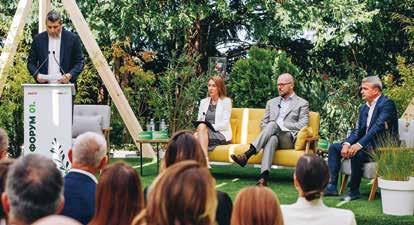
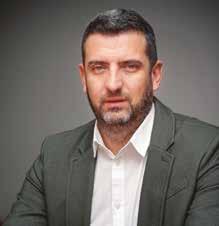

28 SUSTAINABLE DEVELOPMENT 2023
30 Let’s
Protect the Planet
34 OUR SUSTAINABLE COMMUNITY NIS
Slobodan Krstović Director of the NALED Sustainable Development Department





cordmagazine.com 29 SUSTAINABLE DEVELOPMENT 2023 36 PPPs SHAPE A BRIGHTER FUTURE FOR ALL
37 SIMPLE SOLUTIONS MOTIVATE ENGAGEMENT Milica Begenišić
40 SHARED COMMITMENT TO ADVANCE TOWARDS TO 2030 UN SDG Summit 2023 35 NAVIGATING THE EU’S NEW GREENWASHING REGULATION
Jelena Tadić Executive Director, PPP Investment
ESG Manager, Yettel
38 SUSTAINABLE WORD FOR SUSTAINABLE OPERATIONS
Brewery
MaŠa Njegovan ESG & Sustainability Leader, Risk Advisory, Deloitte Serbia
Apatin
SLOBODAN KRSTOVIĆ Director of the NALED Sustainable Development Department
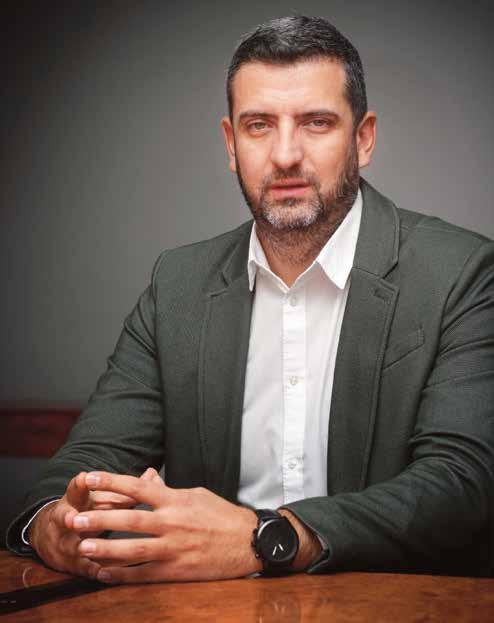
INTERVIEW
LET’S PROTECT THE PLANET
NALED offers expert support in achieving optimised solutions, conducting various initiatives and projects in the fields of environmental protection, the use of renewable energy sources and energy efficiency, as well as on healthcare advances
Here we speak with the director of NALED’s Sustainable Development Department, Slobodan Krstović, about the use of natural resources, environmental protection, building communities that are sustainable over the long-term, climate change, the UN’s Sustainable Development Goals, socially responsible companies, measures, strategies and projects that will help us protect and preserve the planet.
If we take as our starting point the definition of sustainable development as development that satisfies present needs without jeopardising the ability of future generations to satisfy their own needs, a question arises over what we leave behind as a legacy to future generations. How much have we done on this front? — We are striving to ensure that we don’t leave them with fewer resources than we have today. And here I’m not only referring to the finite resources that we are constantly losing, but also the renewable ones that we are currently placing under great pressure due to the influence of pollution, climate change and global warming. We haven’t done enough, and testifying to this claim is the fact that we entered into a state of “environmental indebtedness” at the beginning of August, i.e., that we consumed what nature needs a year to replenish in just the first seven months of the year.
Through its cooperation with businesses, academic institutions and decisionmakers at the national and local levels, NALED offers expert support in achieving the most optimal solutions that are applicable. Within the scope of our working bodies, we take advantage of the expertise of our members, couched in the context of current events and sustainable development trends, and provide decisionmakers with a balanced and applicable solution.
30 SUSTAINABLE DEVELOPMENT 2023
We have seen increased interest in issues related to the environment over recent years. Have significant strides towards solving such issues been taken?
— The process ahead of us is a long one, which is why it might seem as though no major strides have been achieved, but we must be patient in achieving all the defined goals. Certain progress is evident, for example in terms of the construction of regional waste management centres and wastewater treatment plants, and in terms sewage networks –for which financial resources have been provided from various sources of funding. It is extremely important to build capacities at the local level, not only for managing these fundamental systems, but also for training personnel in a systematic way to deal with other current issues in the field of environmental protection, circular economy, achieving climate neutrality etc.
Serbia is among the signatories of the UN’s Agenda 2030, representing a universal strategy that calls on us to mobilise all resources to achieve the Sustainable Development Goals by 2030. How far away from achieving that are we?
— Progress in meeting such broadly defined sustainable development goals is always dependent on political will the most, but also on financial support for specific solutions and investment in education and raising awareness among citizens. In the domain of environmental protection, the focus is on the circular economy and decarbonisation. The Law on Climate Change has been adopted and the drafting of an environmental protection strategy is underway, while we also have a Circular Economy Development Programme for the first time.
Striving to achieve EU accession by 2030 is now a realistic goal for us; to meet some of the goals by
then, and to also ensure subsequent continuity in the reform process. In the area of environmental protection alone, it is estimated that we need in excess of ten billion euros to meet the applicable standards and build essential infrastructure, with just 5.4 billion euros needed, for example, to resolve the issue of wastewater.
Apart from the 2030 Agenda, there is also the UN’s 2050 Agenda for Sustainable Development. Why is climate change among the biggest challenges today?
— The European Union is exerting efforts to realise the vision of the European Green Deal, according to which the continent should become climate neutral by 2050. Introducing various climate policies that are aligned with the Europe-
How do companies in Serbia conduct their efforts towards achieving the SDGs?
— There are companies in Serbia that represent examples to others and that endeavour to achieve the sustainable development goals. Some of them even innovate their operations before they are legally obliged to do so, by introducing green technology, switching to more acceptable inputs and raw materials, utilising by-products from other production processes and taking an integrated systemic approach to dealing with issues of the pollution that they emit. Ever more companies are accepting responsibility for the environmental damage that they cause, and are implementing preventative measures to support the sustainability of the system. We try
an Green Deal often threatens the European single market, which is why various mechanisms are being developed with the intention of motivating the EU’s trade partners, including Serbia, to take steps towards reducing their dependence on fossil fuels. It is precisely this dependence that represents the greatest challenge, while - on the other hand - needs are increasing constantly, given that we had reached a world population of eight billion by the end of last year.
Climate change represents a global problem that cannot be solved, nor even observed, in isolation, but which rather requires international cooperation in the fight against climate change, or the coordination of international activities, which represents a challenge in and of itself.
to always highlight the best local governments and companies, but also to point out instances when, under the veil of sustainable development, the attribute “green” is assigned to products and services that actually represent “greenwashing”.
Through our activities in the period ahead, we will work with companies directly on the greening of processes and products, but also on raising the importance of non-financial reporting and the use of ESG criteria. This concept is already becoming a reality in which the market position and perception of certain companies is assessed not only on the basis of financial criteria, but also according to environmental impact (E-environment), social aspects (S-social) and management culture (G-governance).
cordmagazine.com 31
IN THE AREA OF ENVIRONMENTAL PROTECTION ALONE, IT IS ESTIMATED THAT WE NEED IN EXCESS OF TEN BILLION EUROS TO MEET THE APPLICABLE STANDARDS AND BUILD ESSENTIAL INFRASTRUCTURE
What steps should we, as a country and a society, take to ensure that we achieve significant progress towards sustainable development?
— In order to build a community that’s sustainable over the longterm, we need full cooperation between the government, business world, civil society organisations and citizens. This isn’t merely a political manifesto that promises to ensure all citizens have access to drinking water, healthcare, education and specialist training, to reduce poverty and eradicate life on the extremes. These are real problems in Serbia that need to be solved in a systematic way that ensures everyone has equal opportunities to develop and advance, because that’s the only way we can secure the human capacities re-
quired to really deal with sustainable development. Education is extremely important, as is access to information and lifelong learning. Here, for example, the majority of people would say that Serbia is a country rich in water and that there’s no need to worry about water as a resource, but the reality is that we rely a lot on transit waters and are poor when it comes to our domestic autochthonous waters.
Which of the 17 SDGs do you see as being the most important or highest priority for Serbia?
— It is difficult to choose individual segments and goals in isolation from the whole, because the lack of one means that the system will not function and there will be no sustainable development. If it was necessary to single out one specific area, that might be the social segment or the environment, depending on the society’s development level. Of the 17 goals globally, I would single out access to drinking water. It is disheartening that a quarter of the world’s population currently lacks access to clean drinking water, which is a fundamental need. On the other hand, it is often noted that the first goal – the eradication of poverty –is the most important, because it is connected to the achieving of other goals: the provision of food, water, education, healthcare and economic sustainability.
When it comes to Serbia, I’m focused on sustainable cities and communities. Just as we have the ESG criteria that we use, among other things, to evaluate the desirability of a company as an employer, so local communities and what they offer, in addition to attracting investments, will result in them being classed as desirable places to live and work. It is precisely those communities that are energy-independent and provide access to healthy food and water, that are inclusive and tolerant, that will represent havens for people to live and work.
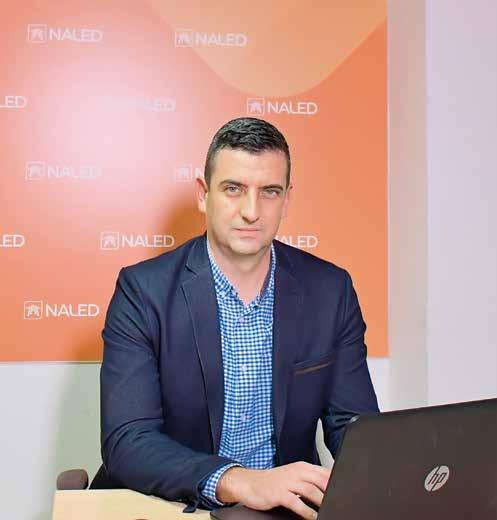
32 SUSTAINABLE DEVELOPMENT 2023
EVER MORE COMPANIES ARE ACCEPTING RESPONSIBILITY FOR THE ENVIRONMENTAL DAMAGE THAT THEY CAUSE, AND ARE IMPLEMENTING MEASURES TO SUPPORT THE SUSTAINABILITY OF THE SYSTEM
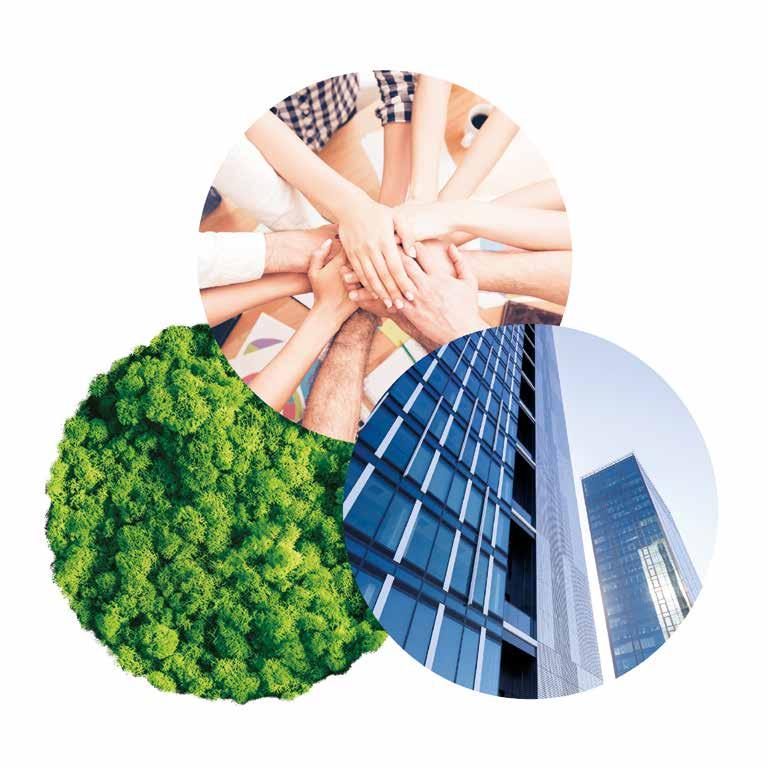
OUR SUSTAINABLE COMMUNITY
Under the organisation of company Novosti, Belgrade played host to a panel debate entitled “Our Sustainable Community”, which addressed the importance of sustainable development and contributions to the achieving of the UN’s Sustainable Development Goals and included the participation of Serbian Mining and Energy Minister Dubravka Đedović Handanović, NIS CEO Kirill Tyurdenev and Čačak Mayor Milun Todorović
planning and a lot of time is required for the result to be evident. We have adopted a ten-year plan for investments in energy infrastructure, which envisages investments of 15 billion euros, primarily in renewable energy sources, distribution and transmission networks, and reversible hydropower plants.”
CEO Tyurdenev said that energy transition is nothing new for NIS, but rather represents a path that the company has been taking for years. “Our green agenda is of great importance on this pathwe’ve invested more than 900 million euros since 2009 in environmental projects and business projects that have a positive indirect impact on environmental protection. Improving environmental protection is among our basic priorities and we implement projects with the intention of them contributing not only to our business results, but also to a better ecological picture for Serbia as a whole,” concluded Tyurdenev.
Speaking in the introductory part of the gathering, Slobodan Krstović, director of the Sustainable Development Department of NALED, stated that it is extremely important to consider what we leave behind as a legacy to future generations and that the building of a community that’s sustainable over the long term requires the synergy of numerous social factors.
The discussion placed a special focus on the need to develop human resources and conserve natural resources, but also on improving quality of life for our fellow citizens. Discussions also encompassed ways to make our community more inclusive and safer, and ways of enabling long-term sustainable development in challenging times. The issues in
focus also included that of energy transitioning to achieve the SDGs.
Minister Đedović Handanović noted that investments in energy must be a priority over the next 20 years. “We have three goals: the first is energy independence, then securing the lowest price for citizens and the economy, and the third is for us to secure the supplies and operations of our energy system. Energy is a department that demands long-term
Mayor Todorović said that stability is of great importance to citizens. “Alongside healthy and good quality air, good, healthy and tasty food, and high-quality water, people want stability in all of these elements: healthy air, power supply, water supply. The fact is that there is ever more consumption in Čačak due to industrial growth. In order for citizens to have better quality of life, we need to strengthen the economy and reinforce the infrastructure, which we are working on intensively together with the Government and relevant ministries. My personal recommendation is for local government to always be alongside its state, ministries and leadership in order for citizens to have as many benefits as possible,” concluded Todorović.
The panel also included discussion of the importance of community education as an important segment of sustainability.
NIS is among Serbia’s pioneers in the field of sustainable development reporting and in June published on its corporate website its 2022 Sustainable Development Report, which represents the company’s 13th consecutive verified report. According to this document, NIS provides a strong contribution, through its operations, to the basic principles of sustainable development: economic progress, the development of human resources, environmental protection and community support. In the field of sustainable development, NIS is led by the UN’s global goals, and in this latest report it acknowledges 12 of the 17 goals that it contributes to achieving with its activities.
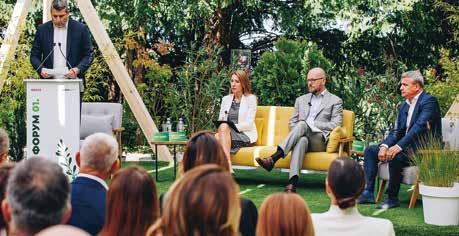
34 SUSTAINABLE DEVELOPMENT 2023
CORPORATE
NAVIGATING THE EU’S NEW GREENWASHING REGULATION
In a world where 46% of consumers are looking to brands to take the lead on creating sustainable change, greenwashing has emerged as a deceptive tactic used by some businesses to appear more eco-friendly than they truly are. The European Union is set to introduce stringent regulations to combat greenwashing, with potential penalties of up to 4% of annual revenue for making misleading environmental claims
& Sustainability Leader, Risk Advisory, Deloitte Serbia


The EU has Green Claims Directive, on which the EU reached a provisional political agreement, has the potential to become a transformative piece of ESG legislation. If adopted, it will mandate rigorous environmental footprint assessments for both products and companies. Life cycle environmental performance will have to be measured and transparently communicated for valid green claims. Environmental labels will face increased scrutiny, requiring testing, third-party verification, and regular monitoring. Crucially, it would extend its reach beyond EU borders, applying to companies outside the EU making claims for goods and services intended for EU consumers.
To meet these stringent requirements, businesses will have to establish robust environmental claims management frameworks, encompassing data gathering, life cycle assessments, and transparent messaging. External verification by accredited third parties will be necessary. Challenges may arise, from knowledge gaps to increased costs, but there are potential benefits, including reduced reputational and liability risks and improved stakeholder relationships.
The Green Claims Directive represents a turning point in the fight against greenwashing, demanding greater accountability and transparency from businesses. Companies must prepare to adapt and ensure their environmental claims align with these stringent regulations to build a sustainable and trustworthy future to all. It’s time to unmask greenwashing and pave the way for genuine sustainability.

cordmagazine.com 35
MAŠA NJEGOVAN
ESG
CORPORATE
JELENA TADIĆ Executive Director, PPP Investment

PPPs SHAPE A BRIGHTER FUTURE FOR ALL
PPP Investment has spent many years dealing with development of public-private partnership (PPP) projects in Serbia, providing municipalities with support in the form of high-quality and timely solutions in energy efficiency, public bus passenger transportation, road maintenance, zoohygiene etc.
With the right governance structures and a commitment to the public interest, PPPs have the potential to shape a brighter future for all, where innovation, efficiency and social impact go hand-in-hand.
How do PPPs contribute to sustainable development?
— PPP projects increase access to essential services and reduce social inequality, improve economic impacts and fiscal sustainability, enable environmental protection and resilience, promote the further development of projects and the standardisation of documents, and
jects. We are thus striving to bring the UN’s Sustainable Development Goals closer to municipalities. One of the significant outcomes defined by PIERS is Replicability. This is an element for which Serbia stands out from the other countries of the region, because it has created a replicable model for PPP investments. This “outcome” provides both public and private partners with better predictability of preparation and project implementation, enabling foresight on many things, especially risks and costs, based on experience possessed.
You have this year received international recognition for your projects. What exactly is this about? We were invited to present two projects of our companies at the PPP
lic lighting reconstruction project in Zaječar received special commendation from the UNECE for compliance with the SDGs and circular economy principles.
Another prestigious event, 4GAMECHANGERS, was held in Vienna and I was invited to join other distinguished panellists to discuss how we implement tech solutions in our projects and how that is shaping our society.
What characterises the projects you prepare?
— All the projects that we develop meet the criteria for public interest as defined by the Law on PPP and identified through “value for money” methodology. However, we have also broadened this approach and our projects are now harmonised with the SDGs, which we will be proven through the “value for people” and “value for the planet” methodology created by the UNECE.
involve all stakeholders in project implementation.
When we talk about sustainable development, we can’t help but mention the “PPP and Infrastructure Evaluation and Rating System (PIERS)” document that was adopted by the United Nations Economic Commission for Europe and that we have started to apply extensively during the preparation of our pro-
Forum in Athens, organised by the UNECE, because those projects were recognised for their contribution to sustainable development. One is the PPP project for public passenger transport in Bor, prepared by PPP Investment, and the other is a PPP project for the reconstruction of public lighting in Zaječar, implemented by Smart Energy Investment. We are particularly proud that the pub-
By combining the strengths of the public and private sectors, these collaborations transform infrastructure, apply new technologies, increase economic growth, address social challenges and promote sustainable development. With the right governance structures and a commitment to the public interest, PPPs have the potential to shape a brighter future for all, where innovation, efficiency and social impact go hand-in-hand.
36 SUSTAINABLE DEVELOPMENT 2023
OUR PROJECTS ARE NOW HARMONIZED WITH THE SDGs, WHICH IS PROVEN THROUGH THE "VALUE FOR PEOPLE" AND "VALUE FOR THE PLANET" METHODOLOGY CREATED BY UNECE
CORPORATE
PPP INVESTMENT Consulting company
SIMPLE SOLUTIONS MOTIVATE ENGAGEMENT
Ecology is becoming increasingly important for large companies. As a relatively new brand, Yettel has already distinguished itself in Serbia for its contribution to environmental protection and customer engagement

as a leading mobile operator, have taken that role seriously.
The first 100% green network in Serbia is determined to tackle various environmental issues, especially when the company receives positive feedback from customers. That’s why Yettel has to date recycled over 560,000 devices, 234 tons of plastic and 112 tons of paper.
For Yettel, environmental protection isn’t a mere legal obligation or fad, but an integral part of every sphere of your business. Are you looking to use your influence to drive positive change?

— Absolutely. For us, environmental and social responsibility are part of our DNA. It is how we think and work across all aspects of our business. Last year, we became the first 100% green network, as we now use only electricity from renewable sources for our base stations. In addition, green energy also powers 31 Yettel stores.
It was over ten years ago that we replaced plastic bags with paper in shops. In 2022, we abolished the use of plastic cups in the HQ and regional centres, resulting in our employees contributing to reducing the amount of plastic waste by about 22,000 plastic cups.
Large companies have the power to initiate positive changes, and we,
Yettel always aims to include customers and partners in its environmental efforts. How do people respond to them, especially the device recycling programme?
— I must say that their reaction exceeded our expectations! With our customers, we’ve recycled over 560 thousand devices over the past two years. Approximately 13 kg of gold, 8 tons of copper, 184 kg of silver, and 7 kg of palladium have been collected and returned to use. The great response from our customers demonstrates that people are becoming increasingly environmentally conscious and eager to participate in
will to tackle different environmental issues, especially when we see the positive feedback from customers. A year ago, we launched the Eco Bonus digital service, to tackle the problem of plastic and paper, on top of everything else we do as a company. By activating Eco Bonus, the customer chooses to have 4.6 kg of plastic and 2.2 kg of paper/cardboard waste recycled on their behalf, which is the amount of waste generated monthly by the average resident of Serbia. This amount of waste isn’t typically included in Serbia’s quotas or those of national recyclers - we insisted that Eco Bonus bring additional amounts, which are to be recycled in Serbia, so it really makes a difference. Over 234
preserving the environment when provided with a simple solution. With their help, we are confident that our goal of recycling a million devices by 2025 is pretty achievable.
In addition to e-waste, plastic and paper waste also pose a major problem. How can a telecommunications company tackle that challenge?
— Where there is a will, there is a way, and we definitely have a strong
tons of plastic and 112 tons of paper have so far been recycled.
In addition to the fantastic responses of our customers, I am very proud to say that our sustainability efforts were also recognised in the business society. At the recent Digital Awards 2023 conference, Yettel received the “Social Responsibility Leader” acknowledgment for our work on improving society and the environment through our business activities.
cordmagazine.com 37
MILICA BEGENIŠIĆ
ESG Manager, Yettel
CORPORATE
YETTEL RECEIVED THE “SOCIAL RESPONSIBILITY LEADER” ACKNOWLEDGMENT FOR OUR WORK ON IMPROVING SOCIETY AND THE ENVIRONMENT THROUGH OUR BUSINESS ACTIVITIES
SUSTAINABLE WORD FOR SUSTAINABLE OPERATIONS
Apatin Brewery has presented its most significant results achieved in the domain of sustainability over the past year, published in its annual sustainability report entitled: “We Gave Our Sustainable Word“. The initiatives that Apatin Brewery has continued to implement with the aim of ensuring the sustainability of its business encompass energy efficiency, cogeneration, improved management of water resources and packaging waste recycling, as well as promoting responsible consumption of alcohol
APATIN BREWERY
At the same time, all results achieved by member breweries of the Molson Coors Group are highlighted in the global report “Our Imprint Report” for 2022, which was published in July and places an emphasis on progress achieved in the scope of the strategy aimed at caring for the people and the planet.
“Considering the increasing urgency of global challenges in the area of the
environment, we are setting ever more ambitious goals when it comes to placing our seal on water, climate and packaging. Water is crucial to our production process and we devote great attention to ensuring the efficient use of this precious natural resource. We have achieved outstanding success with the constructing of our own wastewater treatment plant – following use in our production processes, we return clean water to nature, produc-
ing green energy as part of the entire process. When it comes to energy use, we are oriented towards constantly improving energy efficiency by reducing and optimising our consumption of thermal energy, electricity and water,” explains Apatin Brewery General Manager Igor Vukašinović.
Summarising the results achieved over the previous period, Apatin Brewery can boast of having reduced its energy consumption, through rational use, by as much as 22% over the past five years. This brewery also processes all wastewater as a by-product, with this process creating biogas that is used to generate electricity and thermal energy using a cogeneration plant, representing an excellent example of a circular economy. When it comes to CO2 production, Apatin Brewery is among the best breweries in the Molson Coors Group – as most of the CO2 consumed in production processes is itself produced as part of the beer fermentation process.
Apatin Brewery has remained dedicated to the “When I drink, I don’t drive” campaign for 17 years already. In partnership with the Serbian Traffic Police Administration and the Agency for Traffic Safety, the brewery promotes responsible alcohol consumption and appeals for traffic safety among its consumers.
In collaborating with partners under the scope of the multiyear project “You Recycle Too”, Apatin Brewery directs the attention of the public towards the importance of recycling and the proper disposal of packaging waste.
Among the key values of Apatin Brewery is the notion that people are always its first priority. It considers support for families, or striking the right balance between private and professional life, as being extremely important, which is why this brewery is a holder of the prestigious Family Friendly certificate, and is actually the first company in Serbia’s consumer goods sector to receive this certification. It has also introduced new benefits for colleagues over the past year, in an attempt to ensure employees can enjoy benefits that will enable them to maintain a positive balance between their work and family life.

The complete Sustainability Report is available on the Apatin Brewery website.
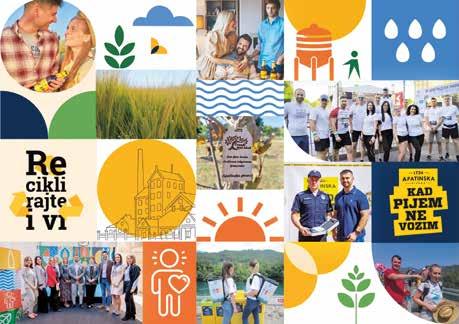
CORPORATE 38 SUSTAINABLE DEVELOPMENT 2023

“There must be a better way to make the things we want, a way that doesn’t spoil the sky, or the rain or the land”
Paul McCartney
ADVANCE TOWARDS TO 2030
Kicking off the UN General Assembly (UNGA) High-level Week, the SDG Summit adopted a political declaration reaffirming Member States’ continued resolve and shared commitment to the 2030 Agenda for Sustainable Development and its SDGs. The declaration highlights progress made and gaps and challenges that remain, and issues a call to action to turn our world towards 2030

40 SUSTAINABLE DEVELOPMENT 2023
Every four years, the High-level Political Forum on Sustainable Development (HLPF) convenes twice: under the auspices of the UN Economic and Social Council (ECOSOC) in July; and as the SDG Summit at the level of Heads of State and Government under the auspices of the UNGA in September. When the HLPF convenes twice in the same year, the Forum
adopts “only one negotiated political declaration, covering the different and complementary functions of both sessions of the forum.”
The 2023 Summit was the second meeting of the HLPF to convene under the auspices of the UNGA since the 2030 Agenda and its 17 SDGs were adopted in 2015. It marked the half-way point to the deadline for achieving the Goals, seeking to provide renewed impetus for accelerated action.
Negotiations on the political declaration had been co-facilitated over the course of several months by Qatar and Ireland. Earlier this month, the co-facilitators reported to the UNGA President that the “broadest possible agreement” on the political declaration had been reached.
The Earth Negotiations Bulletin (ENB) reports that there was “a notable sigh of relief” when the declaration was adopted without objections during the opening segment of the SDG Summit. However, some felt this was a reflection of “how low the bar is in terms of expectations.” An observer pointed to the absence of the Heads of State of the five permanent members of the UN Security Council. Delegates forwarded the political declaration (A/HLPF/2023/L.1) to the UNGA, recommending it be endorsed.
Ahead of the SDG Summit, UN Secretary-General António Guterres urged world leaders to bring forward national and global commitments to drive SDG transformation. Representing another outcome of the Summit, these commitments will be registered on the SDG Summit Acceleration and Accountability Platform. The Secretary-General encouraged Member States to report on their implementation in the context of the voluntary national review (VNR) process.
The SDG Summit was preceded by an SDG Action Weekend, which served as a platform for stakeholder engagement to maximise the impact of the Summit.
Other major events taking place during the 2023 UNGA High-level Week included the Climate Ambition Summit, high-level meetings on health and financing for development (FfD), and a preparatory ministerial meeting for the 2024 Summit of the Future.
LEADERS' FOCUS
The Summit also featured a fireside chat on what it will take to keep the SDG promise, and six leaders’ dialogues on:
• scaling up actions on key transitions to accelerate SDG progress;
• building resilience and leaving no one behind;
• applying science, technology, innovation, and data for transformative action;
• strengthening integrated policies and public institutions for achieving the SDGs;
• strengthening the multilateral system for enhanced support, cooperation, follow-up, and review; and
• mobilizing finance and investments and the means of implementation for SDG achievement.


CONVERGENCE ACHIEVED
During closing, UN Under-SecretaryGeneral for Economic and Social Affairs Li Junhua noted convergence on:
• building resilience to address the existential threat of climate change;
• expanding social protection to leave no one behind;
• localizing the SDGs in conflictafflicted and fragile states;
• pursuing transformative action through science, technology, and innovation;
• leveraging digitalization to speed up progress on the SDGs;
• strengthening integrated policies and mainstreaming SDG implementation at the national level;
• renewing multilateralism as an imperative for effective implementation of the 2030 Agenda;
• mobilizing finance and investment, including through the SDG Stimulus, climate finance, debt relief, and a reform of the international finance architecture; and
• going beyond Gross Domestic Product (GDP), including through considering the multidimensional vulnerability index.

“There is no economic imperative that will condemn us to deplete our vital resource base, but neither is there an invisible hand that will prevent us from doing so”
Jeffrey Sachs
LEADERS’




43 cordmagazine.com
Business Dialogue
MEETING
POINT
Page 44
CHRISTOS HARPANTIDIS Area Vice President of PMI South East
Europe Cluster
Page 48
BOBAN ĐUROVIĆ Municipality of Vrnjačka Banja
Page 52 New Chapter for PMI in Serbia This Spa Functions Year-Round Twenty Years of Innovation and Excellence
GORAN ĐURIĆ Owner and Director, EuroCons Group
New Chapter for PMI in Serbia
Christos Harpantidis, Area Vice President of PMI South East Europe Cluster
Celebrations marking the 20th anniversary of the acquisition of the then Niš Tobacco Industries by company Philip Morris International were crowned with the announcement of a new investment that’s
100 million dollars
to create 200 new jobs in the capital of Southern Serbia
With this latest PMI investment set to mark a major milestone in the transformation of the tobacco industry in Serbia and revolutionise this factory that has hitherto exclusively produced traditional cigarettes and will now begin manufacturing smoke-free alternatives, we spoke with Christos Harpantidis, Area Vice President of South East Europe Cluster at Philip Morris International.
In light of the announced major new investment in PMI’s factory here in Niš, how do you envisage this investment contributing to the continuing transformation of your company?
— This investment that’s been announced in Niš really represents a special moment for several reasons. One is that we are together celebrating 20 years of the presence of Philip Morris in Serbia, with the acquisition of the factory, as well as a series of investments and a very good growth story in the country. The second important element is the fact that this investment relates to innovative new products with a reduced risk, which take this factory into a completely new era. For years now, we have had a very successful business in Serbia and our local factory in Niš has been exporting to over 50 markets. However, until now, our business here has been focused on producing traditional products. We are now opening a new chapter, with products based on innovations and technology, which is extremely important for Serbia and the region. So, we expect this –together with the more than 200 new jobs that it will generate – to provide a boost to the regional economy, and to Serbia overall. This thus represents a significant mile-
stone, both for us and for the country, but also for the region of the City of Niš, as our operations here are now aligned with PMI’s vision of a smoke-free future.
Indeed, Philip Morris International is aspiring for smoke-free products to account for more than 50 per cent of its total net revenue by 2025. How will this plan reflect on local markets, for example here in Serbia, where most of the production still relates to traditional tobacco manufacturing?
— If we take the big picture perspective, at Philip Morris International we’ve committed to over 50 per cent of our net revenue being generated with the new products by 2025. Of course, 50 per cent is just a number, while the essence of this is that
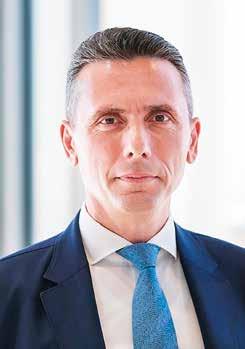
is
we are striding, with both feet, towards our vision of moving away from cigarettes. At the moment we’ve reached 35% at the global level, so we are progressing very well towards our 2025 target.
The transformation that we are going through has multiple elements. There is the element of product transformation –in that we are changing to the new generation of products that will be produced here, while we are also changing the way we operate, our culture, but also the way we commercialise our products. And we are obviously also trying to evolve and change the world around us, in terms of how the scientific community and the regulations treat these new products. This is essential to achieving our vision for a smoke-free world. We cannot do it alone: other companies also have to produce these kinds of products that are significantly better than cigarettes, and are scientifically proven as such; while regulators also need to create the right kind of regulatory environment in order to be able to give consumers accurate, science-based information.
Given that the prevalence of smoking remains high in this part of Europe, what steps is PMI taking to address potential scepticism or resistance from local communities with regard to smoke-free products?
— We firstly recognise the problems that are related to smoking, and we did so a long time ago. For over a decade, PMI invested more than 10.5 billion dollars to scientifically research, develop and commercialise smoke-free products. These scientific studies and findings are open to third-par-
44 october
worth
and
expected
ty reviews. We are therefore opening a dialogue and inviting everyone to the table in order to do something about the problem of smoking. The WHO predicts that, in 2025, we will still have a billion smokers around the world, so the question is what we can do about that. As with many other major challenges of today’s society, the idea is to produce solutions that are increasingly better until you find the ultimate solution. So, just as in the energy sector we are moving from fossil fuels to renewable energy, which is not completely harmless. That’s why we’ve taken this very seriously, done our best, placed the products on the market and opened the dialogue to discuss and make sure that we help the society move in this direction.
How would you characterise the progress of the business environment in Serbia since Philip Morris initially entered the market, 20 years ago?
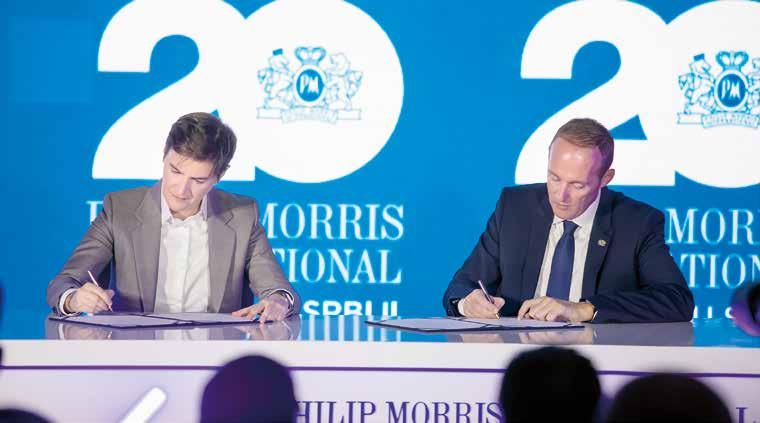
— I think our continued presence here proves that we recognise the progress that the country has made. That’s also why we’re continuing to invest. We were just discussing the numbers since the acquisition of
the traditional business 20 years ago until today. With today’s announced investment, PMI has to date invested a total of over a billion dollars in the country. And
this didn’t come with one shot, but rather has been a series of repeat investments that create new, highly-skilled jobs and advance the country’s exports. We are thus contributing to a society and country that is positive and open to new investments, especially when that’s for the benefit of consumers. I strongly believe that this is also a responsibility across the wider region of the Balkans and that we will continue to contribute in this way.
Yet more proof that we recognise the positive environment in Serbia is provided by our collaboration with the Serbian
state in supporting initiatives that benefit the society, or in creating our own initiatives in collaboration with the government. One example of that is the StarTech Project, which is intended to support innovation in different places across Serbia and has received an investment of five million dollars on our side over the last few years. It is yielding results and we plan to continue financing it. Initiatives like this form part of our sustainability efforts, as sustainability is a core strategy of Philip Morris International. Or rather, to correct myself, sustainability is THE core strategy of Philip Morris International, and we are doing our utmost across all parts of our operations – in our governance, in the way we treat our employees and business partners, in the way we measure our impact on the environment and try to improve it, and, obviously, in the way we interact with society, with projects like StarTech and others, which have very specific measurable KPIs that we use to check our progress towards ESG and the pace of our own transformation towards being a smoke-free company and one of the most sustainable companies in the world.
45 cordmagazine.com
With today’s announced investment, PMI has to date invested a total of over a billion dollars in Serbia
The Memorandum of Understanding was signed by PM Ana Brnabić and managing director Philip Morris SEE Aleksandar Jakovljević
Business Dialogue
Philip Morris Announces $100 Million Investment in Niš Facility
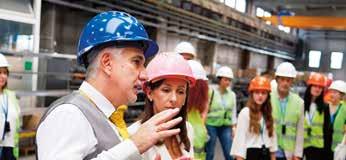

Philip Morris International is set to invest $100 million in a new facility in Niš, Serbia, creating approximately 200 new jobs, according to announcements made during the firm’s 20th-anniversary celebrations in the country. The milestone event was attended by Serbian Prime Minister Ana Brnabić, who inked a Memorandum of Understanding between the Serbian government and Philip Morris Operations in Niš. Jacek Olczak, the CEO of Philip Morris, stated that the company is taking a significant step towards its vision of a future where better alternatives replace cigarettes. Olczak lauded the Niš factory as an exemplary site of modernisation and development, yielding excellent business results by implementing cutting-edge technological solutions and innovations.
Expobank A.D. Belgrade Rebrands as Adriatic Bank


Expobank A.D. Belgrade has undergone a rebranding exercise and will henceforth operate under the moniker Adriatic Bank A.D. Belgrade, according to an official communique from the financial institution. The announcement elaborates that Adriatic Bank will unveil its business operations at a new location in Belgrade’s Skyline Tower after the name change. This venue is earmarked for the provision of private banking services. Furthermore, the bank disclosed plans to inaugurate a novel branch within the precincts of the Skyline Tower, aiming to deliver a contemporary banking experience to its clientele.
Alumil Celebrates 20 Years of Manufacturing in Serbia
Established in Greece in 1988 and building on the Milonas family’s tradition and expertise, Alumil is celebrating two decades of production in Serbia. As a leading manufacturer of aluminium profiles, with rigorous quality control throughout the production process, the company employs 400 individuals in Serbia. Supported by a strong team of 20 engineering and architectural consultants, it boasts six sales and distribution centres and an impressive showroom in Belgrade. Alumil offers unique solutions, with innovations catering not only to the Serbian market but also on a global scale. The company’s significant investments in its Novi Pazova manufacturing plant demonstrate the importance of its Serbian operations to the wider Alumil Group.
Hisense Pours £45 Million into New Factory in Valjevo
Chinese corporation Hisense has announced an investment of £45 million in a cutting-edge cooling appliance factory in Valjevo. Christened ‘Valjevo 3’, this establishment will be the production hub for advanced side-by-side cooling devices under the Hisense, Gorenje, and Asko brands, targeting primarily the demanding European markets. The advent of this new facility signifies the creation of 1,000 jobs over the forthcoming three years. Nestled alongside existing factory grounds, the new site sprawls over 45,000 square metres, boasting a state-ofthe-art production hall occupying 30,000 square metres, complemented by storage facilities and a contemporary staff canteen.
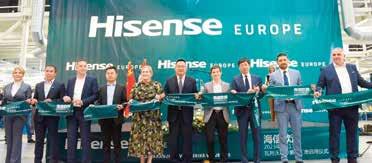
46 october LOCAL NEWS
“To date, Austria has invested €3.1 billion in Serbia, and our businesses have provided employment to 24,000 individuals”
Christian Ebner, Austrian Ambassador to Serbia
PLACEMENTS & POSTINGS
H.E. Kristin Melsom, new Norwegian Ambassador to Serbia
Born 27th June 1967 in Porsgrunn, Norway, Ambassador Melsom completed her basic military education, officer’s education and officer’s higher education at the Norwegian Air Force Academy, graduating in 1993, before enrolling in economics studies at Harstad University College (1993-’96). She subsequently (1998’-99) completed a diplomatic course at the Norwegian Ministry of Affairs. Joining the Norwegian Air Force, Air Defence department in 1987, she progressed to the final rank of Captain, posted at the Bardufoss Air Station (1993-’96). Launching her diplomatic career, she was an executive officer, diplomatic trainee, at the Norwegian MFA from 1996 to ’99, after which she served at the Norwegian Embassy in Paris, initially as Second Secretary (1999 to 2001) and then as First Secretary (2001-’03). Posted as First Secretary at the Norwegian Embassy in Ottawa from 2003 to ’06, she served as an MFA advisor and senior advisor from 2006 to ’09, when she was appointed Deputy Director of Security and Emergency Preparedness at the MFA in Oslo. She served as Counsellor at the Permanent Delegation of Norway to NATO from 2011 to ’15, after which she was appointed Minister Counsellor and Deputy Head of Mission at the Norwegian Embassy in Ankara from 2015 to ’19. Prior to arriving in Belgrade, she served as Director of the Southeast Europe Section at the Norwegian MFA. A married mother of two, Ambassador Melsom speaks Norwegian (mother tongue), English and French (fluent) German (advanced knowledge) and Turkish (basic knowledge).

H.E. Niklas Lindqvist, new Ambassador of Finland to Serbia, Montenegro and North Macedonia

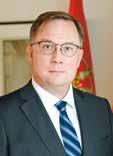
Born in Helsinki in 1967, Ambassador Lindqvist holds a Political Science Masters from Åbo Akademi University (city of Turku). He joined the Finnish Ministry of Foreign Affairs in 1996, initially engaged in its political and protocol Departments. He was posted to the Finnish Mission to the UN in New York from 2000 to ‘04, after which (2004-’07) he served as Advisor to the Under-Secretary of State (political) and Political Director at the Ministry for Foreign Affairs in Helsinki. He has served at the Finnish Embassy in Moscow twice, first as Second Secretary covering Russian foreign policy (1997-2000) and then as head of the Political Section (2007-2010). He served at the Permanent Representation of Finland to the EU in Brussels from 2010 to ‘13, responsible for the areas of Eastern Europe and Central Asia, before becoming Roving Ambassador to Central Asia, representing Finland in Tajikistan, Turkmenistan and Uzbekistan from 2013 to ‘18. Prior to his arrival in Belgrade, Ambassador Lindqvist served as Director of the Unit for Russia at the MFA in Helsinki. A married father of one son and two daughters, he is fluent in Swedish (mother tongue), Finnish, English, Russian and French.
Born in 1969 in Siem Reap Province, Cambodia, Ambassador Tan Graduated from Preston University (U.S.) and Phnom Penh’s Royal School of Administration. He first became a government official in 1989 and served at the Cambodian Ministry of Information until 1992. He joined the staff of the Ministry of Foreign Affairs and International Cooperation (MFA-IC) in 1993. During his 30year career to date with the MFA-IC, he has worked in the Press Department, Planning Department and Inspectorate General, serving as Bureau Chief, Deputy Director and Deputy Inspector General. Among his foreign postings, he has been assigned as Third Secretary to DPR Korea, Second Secretary to the Russian Federation, First Secretary to the Republic of Korea, Ambassador to the State of Kuwait – accredited to Bahrain, Qatar, the UAE and Oman, and his latest posting as Ambassador of the Kingdom of Cambodia to the Republic of Serbia. A married father of two sons and one daughter, Ambassador Tan speaks English & Khmer.
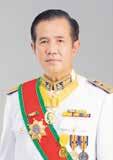
Joseph Kalala Mulamba is a senior civil servant in the Direction Générale des Migrations (DGM), where he has held various senior positions, including Provincial Director of the Direction Générale des Migrations (DGM) in Bandundu province, Central Director of the Aliens Police, before being assigned as liaison officer for the Directorate-General for Migration at the Home Office/UK from 2013 to March 2023 within the Diplomatic Mission of the Democratic Republic of Congo in London, before finally being assigned to perform the duties of ambassador of the Democratic Republic of Congo in Belgrade. He holds a Master of Arts (M.A. in TESFL and Applied Linguistics, UCNW, Bangor, 1987), a degree in general pedagogy (Institut Pédagogique Nationale de Kinshasa (IPN), 1975), and has completed a number of training courses, including one on the fight against terrorism held in the U.S. Ambassador Kalala Mulamba is a married father of five children.
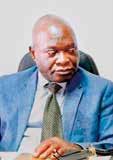
47 cordmagazine.com
H.E. Bunpa Tan new Ambassador of Cambodia to Serbia
H.E. Joseph Kalala Mulamba
new Ambassador of the Democratic Republic of Congo to Serbia
” The FIC actively represents the harmonising of regulations and supports the intensifying of Serbia’s European Union accession negotiations”
Aleksandar Ljubić Executive Director of the Foreign Investors Council
This Spa Functions Year-Round
ext year will mark the 1,700th anniversary of the start of the use of medicinal spa waters in today’s Vrnjačka Banja, which will be commemorated through all happenings, festivals and the annual carnival, as well as all other events that will be organised, but also through numerous new contents announced in this interview for our magazine by the president of the Municipality.
How are the results with which you are ending the season? Are you satisfied?
— I wouldn’t say that the season in Banja is ending, because for the past several years it has continued throughout all twelve months of the year. However, if we were to conduct a review at this juncture, I would say that results exceeded expectations by far, and we had high expectations, considering the investments made and the rich offer. We have record breaking months behind us, both in terms of visitor numbers and the occupancy rates of accommodation facilities, but also in terms of the number of events and new tourist attractions and contents. Every record broken motivates us to work with even more intensity and dedication on new projects, some of which are huge, such as the gondola lift that will connect Vrnjačka Banja and Mount Goč.
We are setting new and higher goals, and the successes that we’re recording certainly make us – both me and my colleagues –extremely proud and satisfied. From a tourist resort that lost the race on the tourism market, we have succeeded, over the course

of a single decade, in creating a tourist destination with contents that can’t be found in even the most prestigious of tourist centres. We, of course, owe thanks to the gov-
ernment for this success, to President Vučić and to our businesspeople, who have supported us and ensured that we’ve managed to develop continuously.
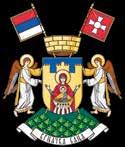
You’ve succeeded in offering something for everyone?
— Alongside our endeavours to extend the season, we also had the goal of making Vrnjačka Banja equally attractive to all age categories, children, young people, families and businesspeople, as well as the elderly population. And that’s not all! Vrnjačka Banja is the right place for both recreational amateurs and top athletes; a refuge for those wanting to spend their holiday in serenity and tranquillity, but also for those choosing active holidays that include numerous adrenaline sports and activities.
We this year organised numerous cultural and entertainment events for all ages and all generations: the Carnival of Vrnjci, which included performances by the most popular music stars from the country and the region; then the Festival of Classical Music, ZUM Festival, Wine Festival and the Film Screenplay Festival, which represents an event with the longest tradition in Serbia and which this year once again included screenings of the latest film productions and a red carpet parade of the most famous names from the world of Serbian cinematography. There is also the essential Lovefest music festival, which is intended for young people who love electronic music. With its rich programme –manifested through the staging of concerts, theatre performances, poetry evenings and
48 october N
Our goal was to make Vrnjačka Banja equally attractive to children, young people, families and businesspeople, as well as the elderly population
Vrnjačka Banja welcomed this season with the country’s largest water park, a panoramic big wheel and new four- and five-star hotels... Thanks to its rich and varied offer encompassing health, recreational and event tourism, this spa town welcomed record numbers of visitors
Boban Đurović President of the Municipality of Vrnjačka Banja
other interesting and diverse events – our spa has attracted a large number of guests with varying tastes and interests.
Complementing these events are numerous amenities, such as the Zoo, the largest water park and Panoramic Big Wheel in the Balkans, but also the Japanese Garden, Labyrinth Park, adrenaline park, sports halls, football pitches made according to FIFA standards, Sculpture Park, waterfalls, and above all 60 hectares of landscaped parklands at the heart of Banja.
One of the ideas that you’ve spent years working on is for the Spa to continue operating at full capacity even after the summer season, during the autumn and winter months. Is it time for us to stop going to Slovenian and Hungarian spas?
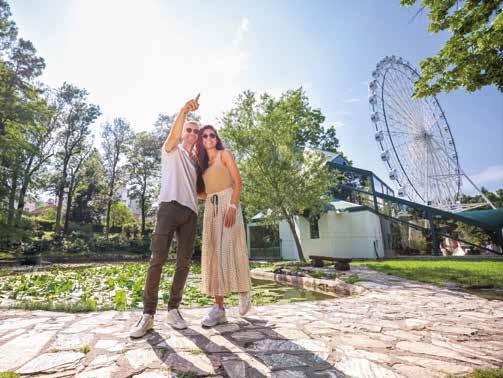
— In order to restore your strength, rest well and relax at wellness centres and spas, it isn’t at all necessary to head to Slovenian or Hungarian spas. It is enough to visit Vrnjačka Banja. Within the scope of our four- and five-star hotels, guests have at their disposal state-of-the-art wellness and spa centres offering healing mineral water treatments and enabling them to rest and relax, find harmony and restore their vitality and energy. During the winter period, guests often relax at one of our many wellness centres after skiing on Mount Goč. Judging by the number of users of these services, this combination of activities has become an attractive and welcome option for many people.
How much progress has been made on the project, in partnership with the Đoković family, to construct a cable car gondola lift connecting Vrnjačka Banja and Goč?
— Documentation is currently being prepared, while a design concept solution has been selected in the public procurement procedure and construction is expected to begin by the end of the year. This gondola will create a milieu that will enable the construction of new tourist facilities on Mount Goč: an adrenaline park, zip-line, adventure park, new ski lanes, health hiking trails etc. We will cultivate and landscape the area around Lake Selište, with new walking zones and water-based attractions, such as geysers. Plans also included the building of a mini zoo that will house wild native species,
as well as the construction of characteristic mountain tourism settlements with additional facilities: restaurants and wellness centres, without the construction of major hotels and multi-storey buildings.
Judging by the work carried out to date, but also the results and offer, we believe that you are preparing lots of new contents for summer 2024. Could you share a few of the many plans with our readers?
— Vrnjačka Banja will next year commemorate the 1,700th anniversary of the use of its medicinal spa waters. This significant jubilee will mark the spirit of the entire year. We plan to promote this anniversary through all happenings, festivals and the annual carnival, as well as all other events that will be organised in Vrnjačka Banja. Our wish is to present the ancient identity of Vrnjačka
Banja to the general public, because we are proud of historical facts dating back to the period of Emperor Constantine, when the use of Vrnjačka Banja’s thermal waters for medicinal purposes first began. Our goal is to better acquaint people with its almost two-millennia-long tradition and familiarise them with the history of our beautiful town.
Next year, after several decades, our guests and visitors will be able to follow in the footsteps of German officers from World War II in the Löhr Tunnel [named after Austrian General Alexander Löhr], which will be ceremoniously opened. There is also a plan to add a roof to the Summer Stage, thus enabling the staging of events regardless of weather conditions, as well as numerous interesting and attractive cultural and tourist activities and projects that we will reveal at the 2024 Belgrade Tourism Fair.
Considering the overwhelming dominance of Vrnjačka Banja compared to other resort towns in Serbia, we want to extend our appeal beyond the country’s borders and convince foreigners that we are keeping pace with highly developed European spa towns and can provide the same quality of service. That’s why we’re continuing to invest in new tourist facilities that will render the entire territory of our municipality equally attractive..
49 cordmagazine.com
The gondola lift will enable the construction of new tourist facilities on Mount Goč: an adrenaline park, zip-line, adventure park, new ski lanes, health hiking trails
Slovenia Records the Highest Employment Growth in the EU
The employment rate for European Union residents aged between 20 and 64 stood at 75.4% in the second quarter of 2023, marking an increase of 0.1 percentage points (pp) compared to the first quarter of the same year. Slovenia saw the most significant rise in employment rate in this period, with an increase of 1.3 pp, followed closely by Portugal and Latvia, both registering a 1 pp increase. Employment grew in 20 EU countries, remained stable in Estonia, and declined in six EU nations. The most substantial dip was in Bulgaria (0.8 pp), followed by Belgium (0.7 pp) and Romania (0.6 pp). These insights were drawn from the Q2 2023 labour market report published by Eurostat.
Elektroprivreda Republike Srpske Targets Hydrogen Production
The Bosnian utility company, Elektroprivreda Republike Srpske (ERS), has set its sights on hydrogen production within the Republika Srpska region. A pivotal step towards this ambition is issuing a public call to draft a “Hydrogen Development Roadmap and Strategy” tailored to the company’s needs. The roadmap is intended to provide a long-term vision that includes an action plan for hydrogen utilisation. This covers cultivating a novel economic chain anchored in hydrogen, encompassing hydrogen production, establishing supporting infrastructure, workforce development, new technological advancements, and manufacturing facilities based on hydrogen-centric technologies. It also aims to champion and foster awareness about the usage of hydrogen within the public sector and broader business community.

Croatia Grants Over 100,000 Work Permits in 2023


In the first seven months of 2023, Croatia granted foreign workers over 100,000 work permits. Data reveals that most of these workers hailed from Bosnia and Herzegovina, with a count of 25,213, followed closely by Serbian nationals with 17,395 work permits. Surprisingly, Nepal claims the third spot. Furthermore, in just the first half of this year, Croatia has issued over 27,000 work permits to workers from four Asian countries alone. Nepal tops this list with 11,523 permits, followed by India at 6,589, the Philippines at 5,024, and Bangladesh, which saw 3,975 of its nationals receiving permits for residence and employment. Analysing the sectors, construction witnessed the highest number of permits issued at 39,146, closely trailed by the tourism and hospitality sector with 37,022 permits. Of the total permits issued, only a fifth, or 20%, were renewals.
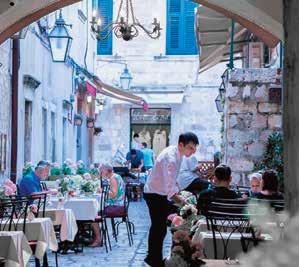
50 october Business Dialogue REGIONAL NEWS
“We aim for sustainable tourism, elite tourism, tourists who stay longer and spend more”
Mirela Kumbaro Minister of Tourism and Environment of Albania
Open Balkan Wines Showcased in Vienna
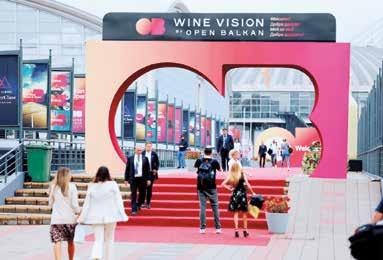
The Serbian Chamber of Commerce President, Marko Čadež, unveiled the regional wine fair, ‘Wine Vision by open Balkan’, in Vienna, featuring wines from Serbia, Albania, and North Macedonia. This presentation was orchestrated in collaboration with the esteemed magazine Falstaff. Attendees included Serbian and Macedonian Agriculture Ministers, Jelena Tanasković and Ljupčo Nikolovski, sommeliers from renowned global restaurants and hotels, wine critics, and journalists. Čadež emphasised that ‘Wine vision by open Balkan’ paves the way for numerous business prospects, with the goal of attracting a vast number of professional buyers interested in collaborative ventures.
Albania’s Green Initiatives Set to Receive Boost of €110.8M From World Bank

The World Bank has approved a loan of 110.8 million euros ($120.3 million) to Albania, aiming to bolster resilience and green development initiatives until December 2024. This programme seeks to enhance the robustness of the government sector and households, refine the energy market structure, and expand renewable energy and energy conservation efforts. Additionally, the goal is to safeguard the environment and diminish Albania’s carbon emissions. Recent steps taken by Albania include updating its fiscal policy, amending the renewable energy legislation, launching a bulk energy trading market, and prohibiting sure thin single-use plastic bags. The loan will be issued in a single instalment, with repayments starting from July 2028 and concluding in July 2040, according to the bank’s statement.
Podgorica’s Property Market Soars with Over 40% Price Increase in Two Years
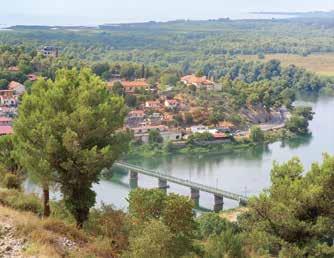
Apartment prices in Podgorica have surged by over 40% in just two years, according to a report by Pobjeda. The average price per square meter for a one-bedroom apartment now stands at €1,720, compared to €1,360 in the same period last year and €1,200 in 2021. “The boom that began in the second half of last year has continued to ascend, reaching record levels in this year’s third quarter. High demand coupled with inflation and an influx of foreign capital have contributed to this dramatic spike in apartment prices,” said real estate market analyst Darko Đikanović in an interview with Pobjeda. According to Montenegro’s statistical agency Monstat, the average price for newly built apartments in the country is €1,500 per square meter, a 9% increase from the same period last year.

51 cordmagazine.com
“The modernisation of our rail links is an important prerequisite for the promotion of the exchange of goods and services and will provide added value to Corridor 10”
Stevo Pendarovski President of North Macedonia
Twenty Years of Innovation and Excellence
The EuroCons Group is recognised on the market for its cleanroom technology, which finds wide applications in the pharmaceutical industry and medicine, but also increasingly in food production and the automotive industry. The company will this year celebrate 20 years of successful operations
– an architectural design bureau; Darnico –a construction works company; LabProva –the first laboratory in the Balkans to be accredited to verify cleanrooms and test air quality; and Econs – our company in Croatia.
We are entering a new stage in our business, with the desire to conquer the markets of Western and Central Europe with turnkey projects. We are certain that we have the required quality – says the owner and director of this company that’s unique in our region in many ways.
Your company offers the latest technological solutions in the area of cleanroom technology. Could you tell us more about “clean and dry rooms”?
— It was two years ago that we mastered the clean & dry room technology, which is essential to the production of lithium batteries, and we are currently the only company in these lands that can boast of having this technology. Our engineering sector has been part of the Belgrade Science and Technology Park since the start of this year, as we are recognised as an innovative company in the design and construction of modular & lite systems for clean & dry rooms.
We applied our acquired knowledge successfully for the project ElevenEs in Subotica, where we collaborated with the first company in Europe to produce lithium-iron-phosphate batteries. We are also proud of the 9,000m2 cleanroom that we constructed in Novi Sad for Japanese electric motor company Nidec. The entire job was implemented by employees of our group, in less than six months. The fact that we aren’t dependent on any other
companies represents our main advantage over competing firms that only cover individual segments of our business.
The EuroCons family has grown in line with the needs of the market. How is your group actually organised?
— We successfully implement turnkey projects thanks to us having created a strong system of services and products. EuroCons Group, as a parent company, is gathered around four subsidiary companies: Biro Plus


Our group is stronger to the extent that we are the exclusive representatives of more than 20 of the world’s leading manufacturers of equipment for air filtration, air humidity control, processing equipment and packaging equipment, as well as for water treatment and hydropneumatic technology. We also offer equipment installation services, commissioning, servicing and after-sales support services. We have invested major resources in our product warehouse, in order to secure supplies for all clients.
This month you are celebrating 20 years of operations. What plans and ambitions do you have as you enter your third decade of doing business?
— We will celebrate our first 20 years of doing business in Belgrade, together with our business partners and friends from Serbia and abroad. We will raise toasts to our successful projects and partnerships. We distinguish ourselves from the competition by implementing projects in accordance with standards that are only just being prepared for adoption. As such, after cooperating with us, our clients find themselves in a situation where they have already satisfied new standards, rather than having to adapt to comply with them.
In order for us to realise all these plans and remain at the top technical level, we invest constantly in educating and expanding our team. With top personnel and the partners that we represent, we are confident that we have a bright future..
52 october
Goran Đurić, Owner and Director, EuroCons Group
EuroCons Group carries out turnkey projects for clean and dry rooms, from designing, construction and installation of the equipment to commissioning, servicing and after-sales support
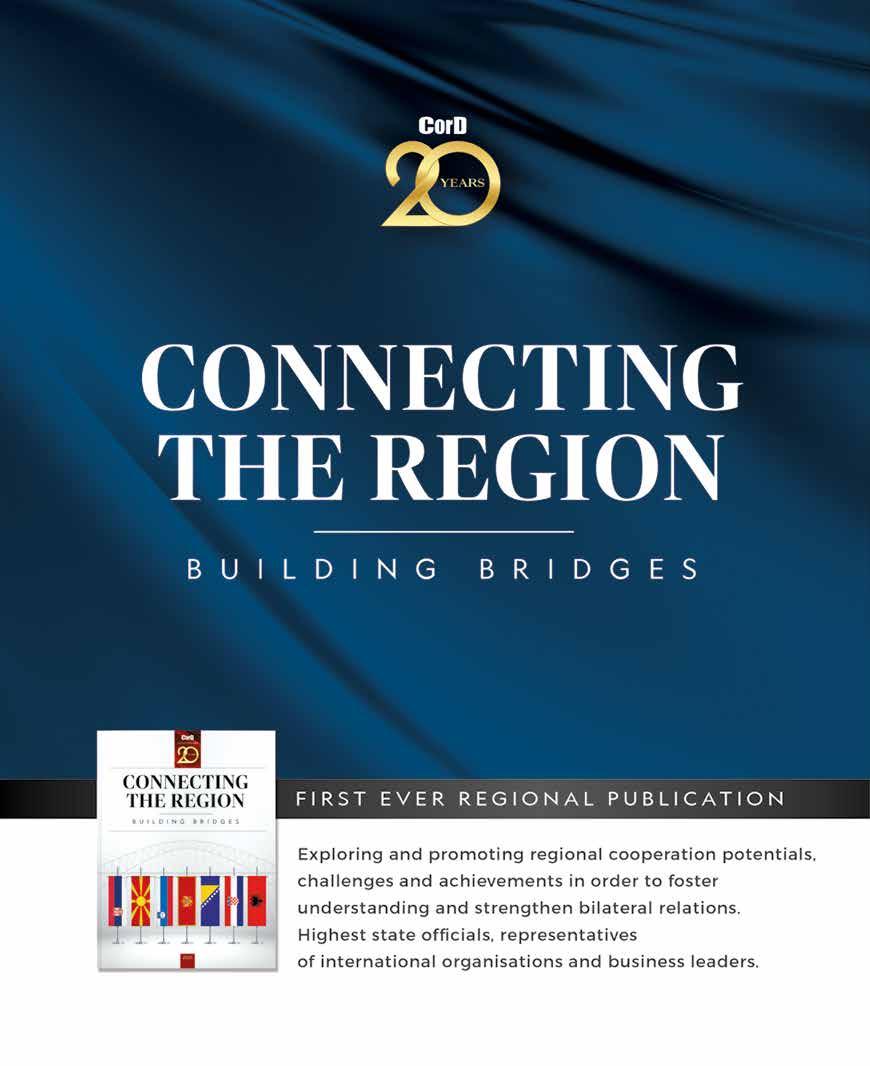
Business Dialogue


Mexico Overtakes China as the US’s Top Trade Partner
Mexico has eclipsed China to become the United States’ leading trade ally, with goods worth $263 billion exchanged between the two nations in the initial four months of this year, as the Federal Reserve Bank of Dallas reported. Trade with Mexico accounted for 15.4% of the US’s imports and exports, marginally ahead of America’s trade with Canada and China, which stood at 15.2% and 12%, respectively. Dallas Bank analysts believe this shift began with former President Donald Trump’s tariffs on certain Chinese goods and the signing of the US-Canada-Mexico trade agreement, a subtle update to the nearly three-decade-old NAFTA accord.

Belarus to Integrate its Energy System with Russia by Early 2024

Belarus is set to finalise documentation that will commence the integration of its energy infrastructure with Russia’s, paving the way for a unified energy market by the beginning of 2024, stated the nation’s Deputy Energy Minister, Denis Moroz. “Everything is on track, and we foresee no alterations. We expect to conclude the agreement by the year’s end,” Moroz announced, as the TASS news agency reported. According to Mr. Moroz, a joint agreement between Belarus and Russia is currently in the works, which will establish the fundamental rules of operation for this shared market. Moroz highlighted that requisite documents have already been signed to ensure the decision is enacted in 2024. However, the agreement is yet to be finalised.
Greeks Work the Longest Weeks in the EU, Dutch the Shortest
In 2022, the average working week for individuals aged 20 to 64 within the European Union stood at 37.5 hours, according to the EU’s statistical agency, Eurostat. The report highlighted significant disparities among EU nations: Greece recorded the longest working week at 41 hours, followed by Poland (40.4), Romania and Bulgaria (both at 40.2 hours). In contrast, the Netherlands boasted the shortest week with 33.2 hours, succeeded by Germany (35.3) and Denmark (35.4). These figures derive from the EU Labour Force Survey, encompassing full-time and part-time employees. Typical working hours refer to the usual weekly hours in a primary job, excluding weeks affected by holidays, absences, or strikes.
54 october WORLD NEWS
“The way that you communicate with people, the way that you show that you care, those all go a long way”
Hans Vestberg CEO of Verizon Wireless
Tourist Taxes in Amsterdam to Become the Highest in Europe
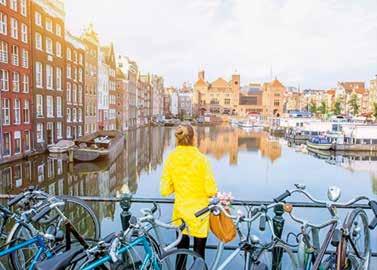
City leaders in Amsterdam have announced a significant increase in tourist taxes, positioning them as the highest in Europe. The overnight tax is set to rise by 12.5% on hotel room prices, and cruise ship passengers will now pay €11 per person, up from the previous €8. The municipal authorities have justified this increase by bolstering funds for financing shelters for the impoverished and healthcare organisations. “We don’t need to increase the costs for our inhabitants, but we will charge visitors a bit more,” stated Finance Manager Hester van Buren, as reported by local media. Amsterdam has implemented various measures to curb tourism, particularly in its overcrowded city centre, aiming to limit the number of visits to 20 million annually.
Volvo to Phase Out Diesel


Volvo will cease the production of all remaining diesel models by the beginning of 2024 as it fully pivots towards electric vehicles, marking a significant step in the automotive industry. “In a few months, the last car with a diesel engine will be produced, making Volvo one of the first automobile manufacturers to take this step,” states the announcement from the Swedish company. Volvo, majorly owned by China’s Geely, has committed to producing exclusively electric vehicles by 2030. In line with this, the company notes that in August, 33% of sales were attributed to fully electric or plug-in hybrid models.
Singapore Overtakes Hong Kong as World’s Freest Economy After 53 Years
According to a report by the Canadian Fraser Institute, Singapore has dethroned Hong Kong to become the world’s freest economy. Hong Kong has slipped to the second spot from number one for the first time since the World Economic Freedom Index was launched in 1970. Some principles used to determine the economic freedom index are based on the ease of international trade, market entry and competition freedom, and business regulations. The reports for 2023 are based on data from 2021, the latest year with available comparable statistics in 165 jurisdictions, measuring individuals’ economic freedom or ability to make economic decisions independently.
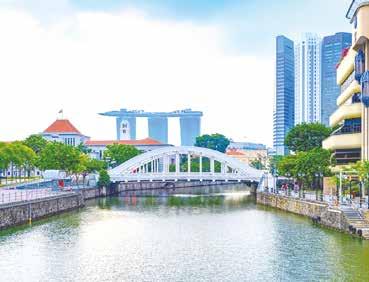
55 cordmagazine.com
“Once in a while, we see a bank in the world that decides they want to de-platform this whole industry”
Brian Armstrong CEO of Coinbase
Architect Asset Management Modern The of

LLarry Fink is far from being a mere figurehead in the financial world; he is an architect of modern asset management, the CEO of BlackRock, and a paradigm-shifter in how companies think about long-term value.
With a portfolio boasting a colossal $10 trillion in assets under management as of 2021, BlackRock under Fink’s leadership is no longer just an investment firm—it’s an institution that wields the sort of influence usually reserved for central banks and national governments.
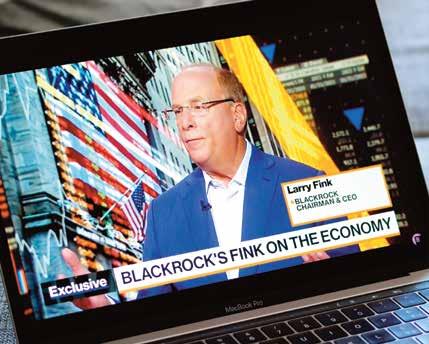
THE GENESIS OF A FINANCIER
Born in 1952 to a shoe-store owner and an English professor, Fink grew up in a middle-class family in Van
Fink founded BlackRock in 1988, along with seven other Wall Street professionals, initially as a risk management and fixed-income institutional asset manager
56 october
ENTREPRENEUR
Nuys, California. After completing his undergraduate studies in political science at UCLA, he ventured to Wall Street, joining investment bank First Boston in 1976.
At First Boston, Fink was a star in the bond department but tasted bitter failure when he miscalculated interest rates, leading to substantial losses for the firm. This setback was formative; it not only imparted him with critical lessons but also set the stage for the risk management approaches he would later instil at BlackRock.

THE RISE OF BLACKROCK
Fink founded BlackRock in 1988, along with seven other Wall Street professionals, initially as a risk management and fixed-income institutional asset manager. The firm grew
steadily but exploded onto the global financial stage after the 2008 financial crisis.
Fink’s understanding of risk had helped BlackRock navigate the subprime mortgage crisis more adeptly than most. The firm’s assets swelled
Investors, making it the largest asset manager in the world.
A STEWARD OF CAPITAL WITH A MORAL COMPASS
as it was called upon to clean up the financial mess left in the wake of the collapse of Lehman Brothers and others. By the end of 2009, BlackRock had acquired Barclays Global
In a world of quarterly earnings reports and immediate gratification, Fink has become an unlikely advocate for long-term planning. His annual letters to CEOs, akin to pastoral letters in the business community, increasingly reflect a broader societal role. In these missives, Fink has exhorted companies to think beyond just profit and consider their environmental, social, and governance (ESG) impact. He has warned that BlackRock would not hesitate to disengage from companies failing to demonstrate a commitment to longterm, sustainable value creation.
57 cordmagazine.com
Larry Fink CEO of BlackRock
Fink’s understanding of risk had helped BlackRock navigate the subprime mortgage crisis more adeptly than most
This is not mere virtue-signalling. BlackRock has followed through with palpable actions, such as siding with “Engine No. 1” in a proxy battle to replace directors of ExxonMobil who were perceived as not doing enough to combat climate change.
STYLE AND SUBSTANCE
Fink is often described as analytical but pragmatic, with a management style that blends attention to detail with an overarching vision. He is renowned for his ‘no shortcuts’ work ethic and a longterm orientation that prioritises strategic planning over tactical manoeuvring. His success can be attributed to a culture of openness and measured risk-taking, something he has fostered at BlackRock since its inception.
AN UNSETTLED LEGACY?
However, Fink’s exertion of moral and financial influence hasn’t been universally welcomed. Critics argue that BlackRock’s ESG goals are more about public relations than genuine impact, particularly given the firm’s significant investments in fossil fuels. More pointedly, BlackRock’s deepening engagement with Chinese markets, including those
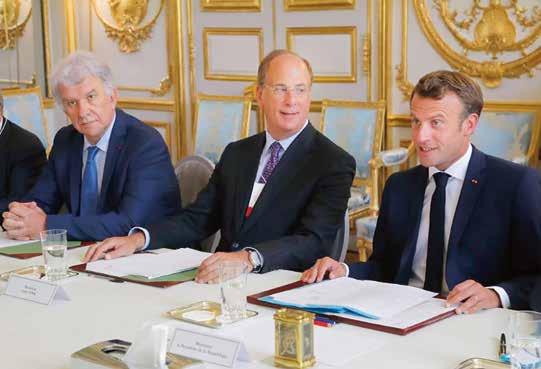
companies blacklisted for human rights abuses, has led to accusations of hypocrisy.
Moreover, BlackRock’s enormous scale and influence in capital markets have raised questions about market concentration and systemic risk, factors that regulators are beginning to scrutinise more closely.
Larry Fink is a man of many facets: a prodigious financier, a corporate moralist, and a global influencer. He has successfully turned BlackRock from a Wall Street outsider into a pre-eminent institution, impacting how both the financial industry and its regulators conceive of risk and responsibility. Yet as he continues to navigate the complex interplay between profit and purpose, his ultimate legacy remains an open question. Nonetheless, what is clear is that Fink has irreversibly altered the landscape of global finance, in ways both tangible and philosophical.

58 october
Larry has warned that BlackRock would not hesitate to disengage from companies failing to demonstrate a commitment to long-term, sustainable value creation
Larry Fink, center, the chief executive of BlackRock, with French President Emmanuel Macron, right
THE WORLD IN MOTION
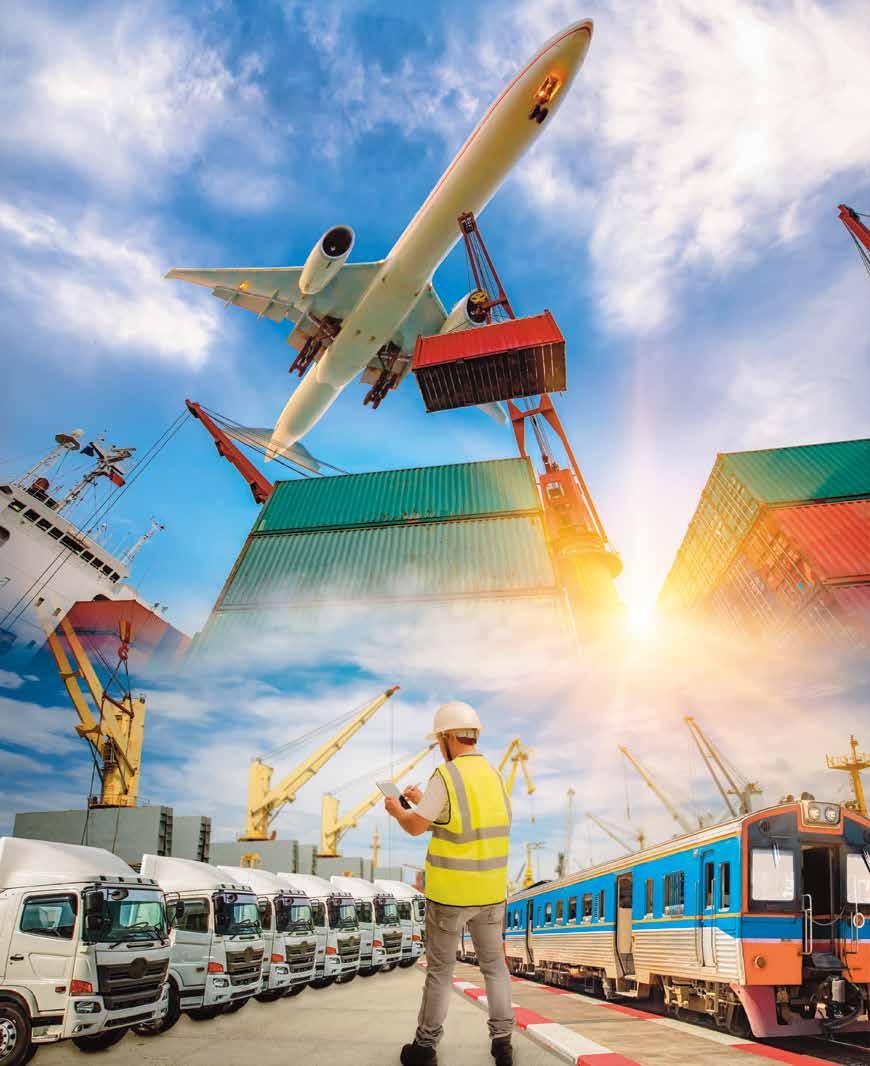
EDITION 2023
SPECIAL
COMBINED TRANSPORT IS OUR FUTURE
Transport connections, primarily freight transport links and logistics, are among Serbia’s key advantages, given the country’s strategic position on Corridor 10. However, additional efforts are required to build the infrastructure that would enable those advantages to be fully utilised
The future of transport and logistics is dependent on the continued digitalisation, automation and optimisation of processes, the increased application of robots and artificial intelligence, the deployment of drones and the mass use of electric delivery vehicles, including heavy haulage trucks

Living and working is easy in times of peace. The challenges come during times of turmoil that require continuous adap-
tation. It is then that long-term solutions that have remained unchanged for decades lose their value, particularly in areas of life and business that are strongly influenced by geopolitical happenings. And transport and logistics certainly fall into that category...
It was initially the pandemic – with its varied and numerous restrictions, but also large numbers of people infected with the Covid-19 virus – that destabilised movements of people and goods,
and threatened supply chains, but fortunately didn’t cause them to break. Despite it seeming impossible for the situation to deteriorate further, with the end of the pandemic came even greater challenges to confront the transport and logistics sector – with the war in Ukraine, the energy crisis, rising inflation, driver shortages – which no country was protected against, including Serbia.
THE TRANSPORT COMMUNITY CONNECTS THE EU AND OUR REGION
Testifying to the idea that Serbia can overcome the global crisis and find itself on the right track just by cooperating with European countries and exchanging experiences is the decision to choose Belgrade as the location for the headquarters of the Permanent Secretariat of the Transport Community, representing an international organisation founded with the aim of further developing the existing transport network connecting the EU and the countries
60 TRANSPORT & LOGISTICS 2023
COMMENT
of Southeast Europe. The Transport Community’s members include the European Union and the six countries of the Western Balkans: Albania, Bosnia-Herzegovina, North Macedonia, Kosovo, Montenegro and Serbia, while its purpose is to extend the EU transport market’s rules, principles and policies to the countries of the Western Balkans through a legally binding framework. The agreement is applied in the areas of transport by road, rail, inland waterways and maritime routes, and Serbia has obliged itself, with the adopting of the founding agreement, to harmonise its legislation with the EU acquis in these areas. Serbia attaches great importance to every project agreed and implemented in partnership with this international organisation, which has also been the case with the joint project of Slovenia, Serbia, Croatia, Austria, and probably also Italy, to develop a single rail route that would connect Belgrade, Zagreb and Ljubljana with Vienna and northern Italy, but also with talks on the inclusion of North Macedonia, Greece and Turkey in regional infrastructure projects following completion of the Belgrade-Niš high-speed railway.
SERBIA MUST UTILISE ITS GEOGRAPHICAL POSITION
In order for Serbia to take advantage of the strategic regional position that it enjoys thanks to geography, it is essential to finalise many infrastructure works, including the launched construction of roads and highways, as well as the railway to Hungary; to introduce more efficient customs procedures, accelerate digital transformation processes and implement numerous other measures that will contribute to shortening goods transport times. New investments could secure, among other things, incomparably more efficient transit con-
ditions for goods being transported from China to Europe, as well as improving Serbia’s positioning on the map of Europe.
Construction of the Belgrade-Niš highspeed railway is just one of the major investments in rail infrastructure that are long overdue. Freight transport by rail currently accounts for approximately 18 per cent of total goods transports, which is below the expected level, but is nonetheless commensurate with the current state of rail infrastructure, which is on the whole very poor, with low transit options of domestic rail routes. According to the expectations of transport experts, railways could achieve 25 per cent participation in freight transport flows over the next five years, increasing to 35 per cent over the next decade. The expansion of “dry ports”, built at intersections between important rail and road routes, would certainly contribute to achieving this goal.
RAILWAYS AND MODERNISED PORTS NEEDED

One of the Serbian Government’s strategic plans is to connect the Danube and Sava rivers to the rail and road routes of Pan-European Corridor 10. Considering that the problems hindering river and port transport haven’t been solved for years, estimates suggest that a minimum of 500 million euros needs to be invested in waterways infrastructure, but there’s no doubt that the existing picture will improve with the construction of a new port in Belgrade
and investments in the port of Novi Sad and to increase the capacities of the ports of Prahovo, Bogojevo and Smederevo.
Advancing rail infrastructure will undoubtedly lead to an increased reliance on rail transport, especially if it is accompanied by the entry of private operators and additional investments in intermodal terminals. This would lead to large quantities of goods being transferred from trucks to trains, but also to the development of combined transport that fuses road and rail and is considered the future of the sector.
Providing an additional reason to switch from road transport to rail is the fact that road haulage operations currently account for a quarter of all greenhouse gas emissions in the European Union and that pollution is a huge problem in the countries of the Western Balkans.
Apart from developing sustainable operations and reducing CO2 emissions, the future of transport and logistics includes the further digitalisation, automation and optimisation of processes, the increased application of robots and artificial intelligence, the deployment of drones and the mass use of electric delivery vehicles, including heavy haulage trucks. Demonstrating that this is neither some distant future reality nor pie in the sky is the current scene on U.S. interstate highways, where AI-controlled trucks already cruise. Europe is now trying to catch up, and its success will mean smart, autonomous trucks also arriving in our region.
cordmagazine.com 61
CONSTRUCTING ROAD AND RAIL INFRASTRUCTURE IS CRUCIAL TO STRENGTHENING THE ECONOMIES AND COMPETITIVENESS OF THE ENTIRE REGION
Director,
TURNING ADVERSITY INTO OPPORTUNITY
At Translucent Logistics they are extremely proud that the company has offered a comprehensive range of logistics solutions since its inception, with a deep understanding of the key business challenges confronting the transport and logistics sector

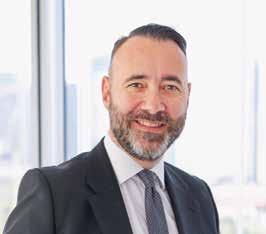
The Translucent Logistics team is deeply committed to solving the key challenges of sustainability, digitalisation and workforce availability, which they view as opportunities to innovate and advance, in the belief that this will help the company offer clients logistics solutions that are even more customised and sustainable.
uously innovating our services, maintaining a presence in key regions and offering logistics solutions at a global level, as well as transparency, sustainability and the continuous improvement of services.
Are you satisfied with your results and current market position?
—Our first year of operations really presented us with a unique series of challenges, including a major energy crisis and the continuing conflict in Ukraine. We have attempted to turn
can anticipate our clients’ demands. Our commitment to tailoring our services is driven by our understanding that every client and every shipment is unique.
What are the key issues for the transport and logistics industry; and how much attention do you devote to those issues?
What kind of initial vision and strategy did you have when launching the business?
—When we embarked on our journey in the logistics sector, we envisaged a business that would not only offer a wide range of universal logistics solutions, but that would also address the key challenges confronting the enterprises operating in this industry. Our vision from the outset was for us to become a reliable partner to companies seeking to optimise operations along their supply chain and advance the overall efficiency of their logistics.
Our strategy is built on foundations of several key principles, which include being client-oriented, accepting the latest technology and contin-
this adversity into an opportunity, and such an approach has contributed to securing our position on the global market. We are satisfied with the progress we’ve achieved, given that we’ve succeeded in establishing a strong presence in the logistics sector, serving an ever-increasing number of clients with various needs.
In the dynamic world of logistics, it is vital to monitor and keep pace with global trends that encompass, among other elements, technological advances, amendments to trade regulations, changes in consumer preferences and new sustainability practices. We adapt our services proactively to ensure that they are aligned with industry best practices and that we
—Sustainability, digitalisation and workforce availability are key issues in the transport and logistics industry, and they don’t only shape the present situation, but also have a significant impact on the future of our business. We recognise the logistics sector’s environmental impact and actively seek ways to reduce it. This includes adopting environmentally friendly transport methods, optimising routes for efficiency and investing in technologies that minimise our carbon footprint. We see digitalisation as the driving force that will enable us to continue simplifying processes and reducing costs, and that will allow us to provide even more customised logistics solutions in the future. We are fully aware that artificial intelligence and advanced digitalisation will play a key role in the future of logistics, because AI-driven algorithms are able to optimise supply chains, predict demand and improve route planning. The availability of skilled labour is vital to our industry. We invest in training and development programmes in order to nurture talented individuals in our organisation.
62 TRANSPORT & LOGISTICS 2023
JASENKO
LAZOVIĆ
Translucent Logistics
WE ADAPT OUR SERVICES PROACTIVELY TO ENSURE THAT THEY ARE ALIGNED WITH INDUSTRY BEST PRACTICES AND THAT WE CAN ANTICIPATE OUR CLIENTS’ DEMANDS
CORPORATE
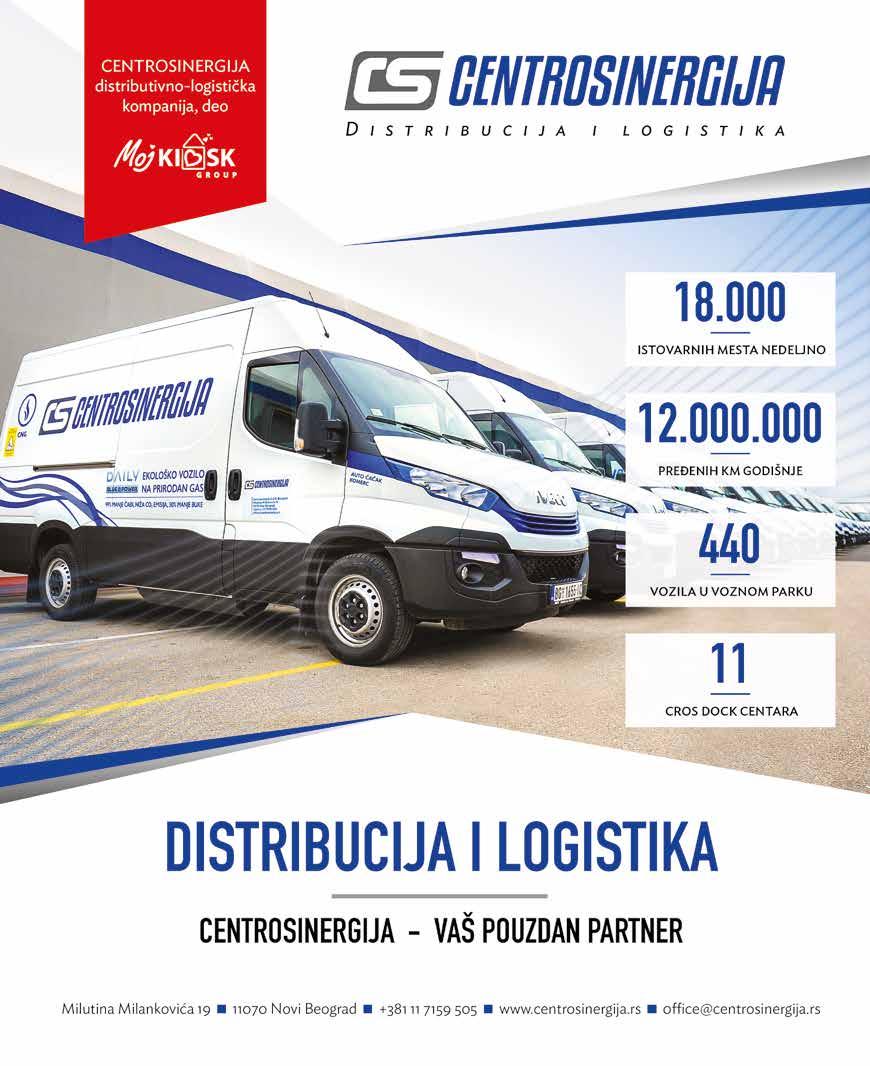
For (inland) goods transportation, 2023 is a year of stagnating tonnage and some segments will show declines. On the passenger side, however, it’s the opposite. The pace of recovery is exceeding expectations since travel has opened up post-lockdowns and restrictions. As consumers continue to prioritise travel, the double-digit rebound of aviation is helping to push growth in the global transport and logistics sector to 4%, exceeding global GDP growth. After the unprecedented drop in 2020, the sector will exceed its pre-pandemic level by the end of the year.
After digesting the initial ‘after shocks’, the global economic slowdown will have a stronger impact in 2024, leading to a more challenging year for most of the sector.
For public transport volume, 2023 is a year of continued recovery as well. Rail figures in European countries were still significantly below pre-pandemic levels in 2022. Full recovery won’t be reached in 2023, but figures are trending up and weekends are relatively busy.
On the goods side, recent stretched and vulnerable supply is helping transport and logistics companies navigate their way through a phase of lower demand. With shortages fresh in mind, companies in road transport have managed to pass on higher costs fairly well despite a sluggish market. In container shipping and logistics, locked-in higher rates – accounting for more than half of the volume – will expire in batches over 2023, leading to falling profits into 2024.
NORMALISATION COMES
The pandemic extremes are gradually fading in transport and logistics, but normalisation comes with after-shocks and sanctions are shaking up trade routes. So what does the year ahead have in store for shipping, container shipping and aviation?
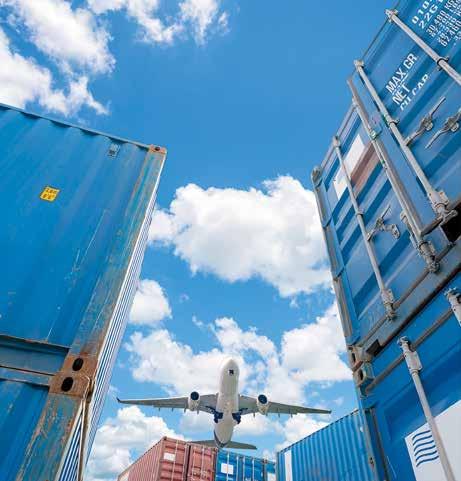

GLOBAL TRANSPORT AND LOGISTICS OUTLOOK
64 TRANSPORT & LOGISTICS 2023
THREE DEVELOPMENTS SHAPING THE FUTURE OF TRANSPORT AND LOGISTICS
Global supply chains continue to stabilise in 2023, and much of the congestion in shipping and port capacity has been solved. But it will also take time to fully digest the effects of the pandemic and war-related supply shocks. Lead times of airfreight and containerised seafreight are still longer compared to pre-pandemic standards and arrival performance rates still have upward potential. In the highly regulated aviation sector, spare part supply is an ongoing constraint and consequently aircraft manufacturers are limited in ramping up production.
Commodity trade patterns have adjusted to sanctions on Russia. This is most visible in energy commodities trade to
shortages are a reason for this, and an increase in climate change-related (extreme) weather events also pose a larger disruption risk. The restrictive low water levels on the Panama Canal – a crucial link on the AsiaU.S. East Coast trade – are a recent example, and the return of El Nino could also lead to extreme weather going forward.
Supply chain resilience remains more important for shippers in the post-pandemic world, and contract logistics can benefit from that. Shippers seem to be sticking to higher buffer stocks to increase supply chain resilience. With the lessons learned from the pandemic, supply chain management (and risks) are still high on the agenda. Logistics services are structurally more profitable than A to B transportation.
Before the pandemic, the total transport sector accounted for a fifth of global CO2 emissions, with road traffic making up three-quarters of it. From an economic and business perspective, CO2 emission development is increasingly important. CO2 emissions have their price and this will gradually be incorporated into business models, since shippers and operators are increasingly pushing for progress
A CHANGE IN TRANSPORT AND LOGISTICS
While the extremes of the Covid-19 pandemic supply shock have faded, the sector is still witnessing the ripple effects of normalisation in consumer behaviour and prolonged capacity issues. At the same time, the economy is slowing and industrial production is slumping. The supply shock from the pandemic and the impact of the war in Ukraine have also left their mark on various parts of the transport and logistics sector. Either long because of excess capacity after a historic boom (in container shipping) or short because of lagging deliveries of aircraft and capacity-absorbing rerouting because of sanctions (in shipping).
While consumer goods logistics is facing a correction, there is a sunnier outlook for aviation which is benefiting from pentup travel demand, while public transport is also becoming busier again.
Europe and more indirect trade flows. On balance, this leads to reshaped routes, less efficient trade and more sea miles –which benefits tanker shipping.
The U.S. is attempting to ramp up regional production to move away from its dependence on China, increased with digitalisation and the shift to green technologies like electric vehicles. This is a long-term process. So far, we don’t see massive deglobalisation, but rather diversification. In Europe, the Supply Chain Due Diligence Act could impact sourcing routes.
Supply chain uncertainty probably remains higher. Structural labour market
with regulatory pressure, sustainability reporting obligations and corporate ambitions. The European emissions trading system (ETS) is already introducing carbon pricing for aviation and shipping.

CO2 emissions in transport (also including autos) dropped by more than 16% during the pandemic, with falling road traffic and the collapse of airline traffic. With combustion engines returning in larger quantities on motorways in 2021 and more aircraft returning to the skies in 2022, CO2 emissions returned to 96.5% of pre-pandemic levels last year.
Given the progress in electrification within the global car fleet (in 2020, 1%
of the global stock was electric, rising to 2.5% in 2022, including plug-in hybrids), but also efficiency efforts in trucking, aviation and shipping, transport CO2 emissions are expected to continue to rise at a lower level than demand. This means the average carbon intensity of transport activity will decrease.
Electrification of the global car fleet continues, and in aviation the strong rebound in passenger numbers is likely to offset gains made by using more sustainable aviation fuels. The International Energy Agency expects oil consumption of transport to start declining after 2026.
Source: ING
cordmagazine.com 65
THE TRANSPORT AND LOGISTICS SECTOR WILL SEE 3% GROWTH IN 2024

“People who want to understand democracy should spend less time in the library with Aristotle and more time on the buses and in the subway”
Simeon Strunsky
Every Day is an Opportunity to Do Good
I have a family of a hundred children and believe there are more to come. They have taught and shaped me more than any university. I have met wonderful people and colleagues, and am living my purpose. I’m grateful for the experiences I’ve had to date and believe that even greater miracles lie ahead. And I’m able to constantly make my dreams come true, and the dreams of dozens of those who aren’t able to do it by themselves. And that is a priceless experience
began to notice that there were children who had so much potential, but who lacked the support of their family and surroundings, and were therefore condemned to never develop that potential; to endure a dissatisfied life, unhappy, unaware of everything they could achieve and become. And then begins my personal struggle, firstly to try to help those I knew from my own neighbourhood, and then also further afield.
Around 15 years later, that desire of mine to primarily help children and young people who lacked family support intensified. Encouraged by a friend, I founded the association Centre Star (in accordance with the story of the starfish), and friends helped us create a logo, website and flyers. And that’s how it started, somehow by itself, guided by some higher force, by
pletely different dimension and role –serving those in need.
Today, 10 years after that fateful decision, with all the ups and downs, I consider that to have been one of those turning points in life that change you forever. The Centre Star Association is a second home to me and my family. Despite still being insufficiently known, this small, local organisation has changed the lives of many for the better. Around a hundred youngsters without parental care have been accepted and supported until they became independent. The House of Opportunities has opened its doors in Belgrade, Niš and Kragujevac. Securing funding has been complicated, so five years ago we began making decorative candles, wooden decorations and other items, in order to ensure our self-sustainability, and work therapy
Dražilović
My story begins way back in the 1990s, during my studies. Given that I also hail from a dysfunctional family and that I grew up under conditions that were more than modest, as a student doing a work experience placement at a school, I
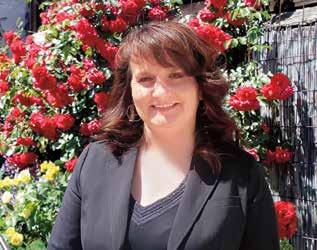
coincidences that certainly weren’t coincidental.
We launched the programme of the House of Opportunities in Belgrade in the autumn of 2015, as a pilot programme that was the first of its kind in Serbia. This is housing with support for young people who usually leave children’s care homes or foster families after turning 18. It was difficult to rent a property for that purpose and to find people who are willing to work – often completely voluntarily, to convince expert workers that we are worthy of trust; to convince organisations and institutions of our serious intentions to persevere and develop. It required that I quit my job and devote myself to engaging in an uncertain and short-term project; that I forget about fixed working hours, weekends, and days off, and that my life, as well as my family and friends, take on a com-
and a work ethic for youngsters. We sell them to companies as corporate gifts, at trade fairs and markets, and from the profits we cover our costs of property rental, food, education for young people, medical treatment, therapy and the like.
I now have a family of another hundred children and believe there are more to come. They have taught and shaped me more than any university. I have met wonderful people and colleagues, and am living my purpose. I understand that every day is an opportunity to do something good, new and different. I’m grateful for the experiences I’ve had to date and believe that even greater miracles lie ahead. And I’m able to constantly make my dreams come true, and the dreams of dozens of those who aren’t able to do it by themselves. And that is a priceless experience..
67 cordmagazine.com PROFILE
Tatjana
founder of NGO Centre Star - Centar Zvezda
Around a hundred youngsters without parental care have been accepted and supported until they became independent. The House of Opportunities has opened its doors in Belgrade, Niš and Kragujevac
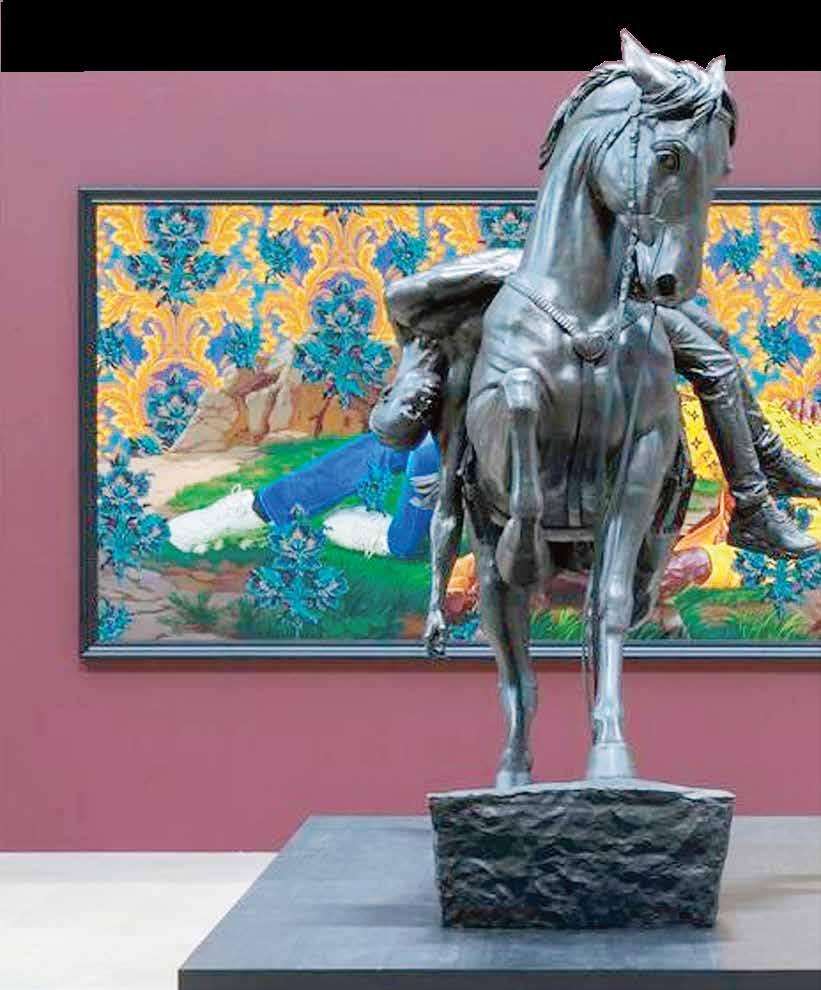
68 october
Is the Gallery Dead?
The Rise of Online Art Platforms
In an age where virtually everything is digitised, from your shopping to your social life, the art world is no exception. As online platforms for art buying burgeon, many question the future of traditional art galleries and exhibitions. Are these brick-and-mortar institutions going the way of the local bookstore and the high-street travel agent?
A NEW FRONTIER: THE ONLINE MARKETPLACE
The rise of online art platforms has been meteoric, especially catalysed by the COVID-19 pandemic, which forced galleries to shut doors and pivot to digital strategies. Websites like Artsy, Saatchi Art, and even the behemoth auction houses like Sotheby’s, have revamped their online presence. These platforms offer both
seasoned collectors and novice enthusiasts an unparalleled selection, right at their fingertips. The allure is evident: the art market, once considered insular and elitist, is now accessible to a broader audience.

IMPACT ON TRADITIONAL GALLERIES
Galleries have served as the cornerstone of the art ecosystem for centuries, offering artists not just a physical space to display their work, but also critical validation and market access. So, what happens to galleries when their primary role can be carried out online?
For some, the future looks rather bleak. Smaller galleries with fewer resources for a digital transition have been hardest hit, and even some established galleries have had to cut
69 cordmagazine.com
ART


70 october
Tata Gallery
back. According to a 2021 report by Art Basel and UBS, the global art market contracted by 22% in 2020, with a large portion of that impact felt by traditional galleries.
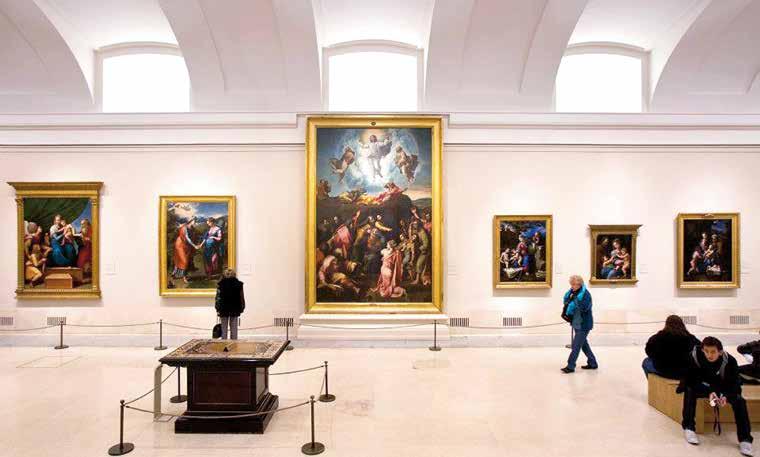
However, it’s not all doom and gloom. Many gallery owners argue that the digital experience can never truly replace the physical one. The texture, scale, and colours of an artwork can be fully appreciated only in person. Plus, galleries do more than just display art; they offer expertise, curate experiences, and foster relationships between artists and patrons—something a virtual platform cannot easily replicate.
DEMOCRATIZATION OR DILUTION?
One of the most celebrated aspects of online art platforms is their democratising effect. But does this broad access dilute the curatorial standards traditionally upheld by galleries? While online platforms

71 cordmagazine.com
Museo Nacional del Prado
offer a stage to many artists who might never have received gallery representation, this also opens the floodgates for works of questionable quality to reach the market. As a result, the role of the gallery as a gatekeeper of artistic merit is weakened, raising concerns about the longterm implications for art standards.
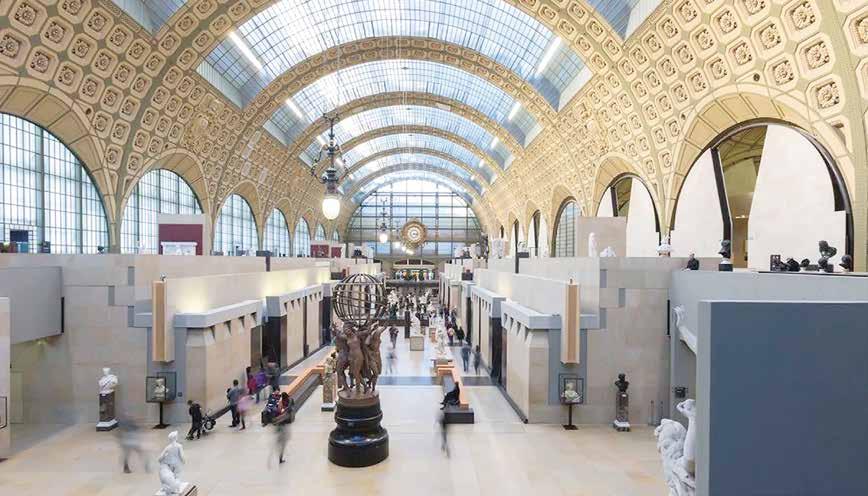
A HYBRID FUTURE
A pragmatic view suggests that, much like retail and other sectors, the future of the art world lies in a hybrid model. Online platforms and traditional galleries can coexist, each serving specific needs. High-profile artists may still prefer the prestige of a gallery showing, while emerging artists utilise online platforms to build a following. Meanwhile, collectors could use online platforms to discover new artists, but turn to galleries for expert advice and deeper engagement.
In conclusion, while online art platforms have indeed stirred the waters, they haven’t yet rung the death knell for traditional galler -

ies. Instead, they have added a new layer to the complex tapestry of the art world. As both realms continue to evolve, the challenge will be how
to preserve the strengths of each, ensuring a vibrant, accessible, and high-quality art landscape for years to come.
72 october
Musee d’Orsay


73 cordmagazine.com
Museo Nacional del Prado
Museo Nacional del Prado
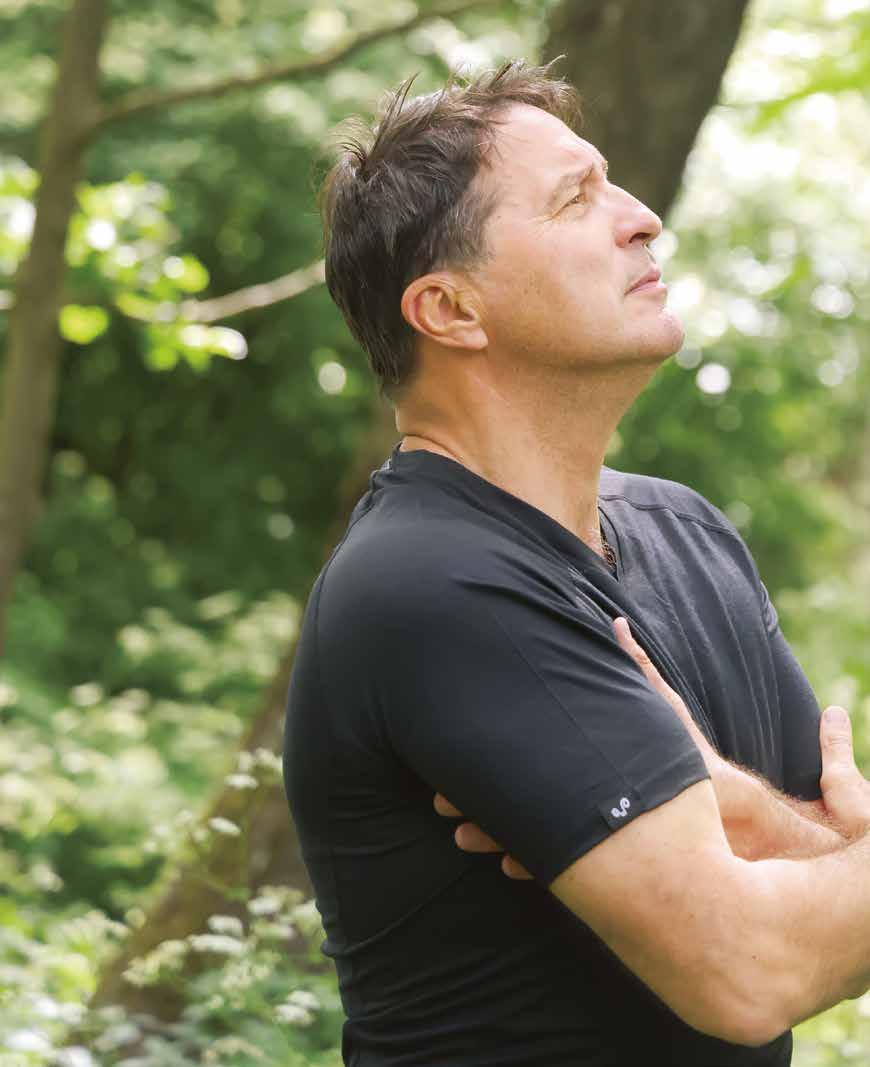
october 74
TV Mainly Serves the Authorities
Jovan Memedović journalist and TV presenter
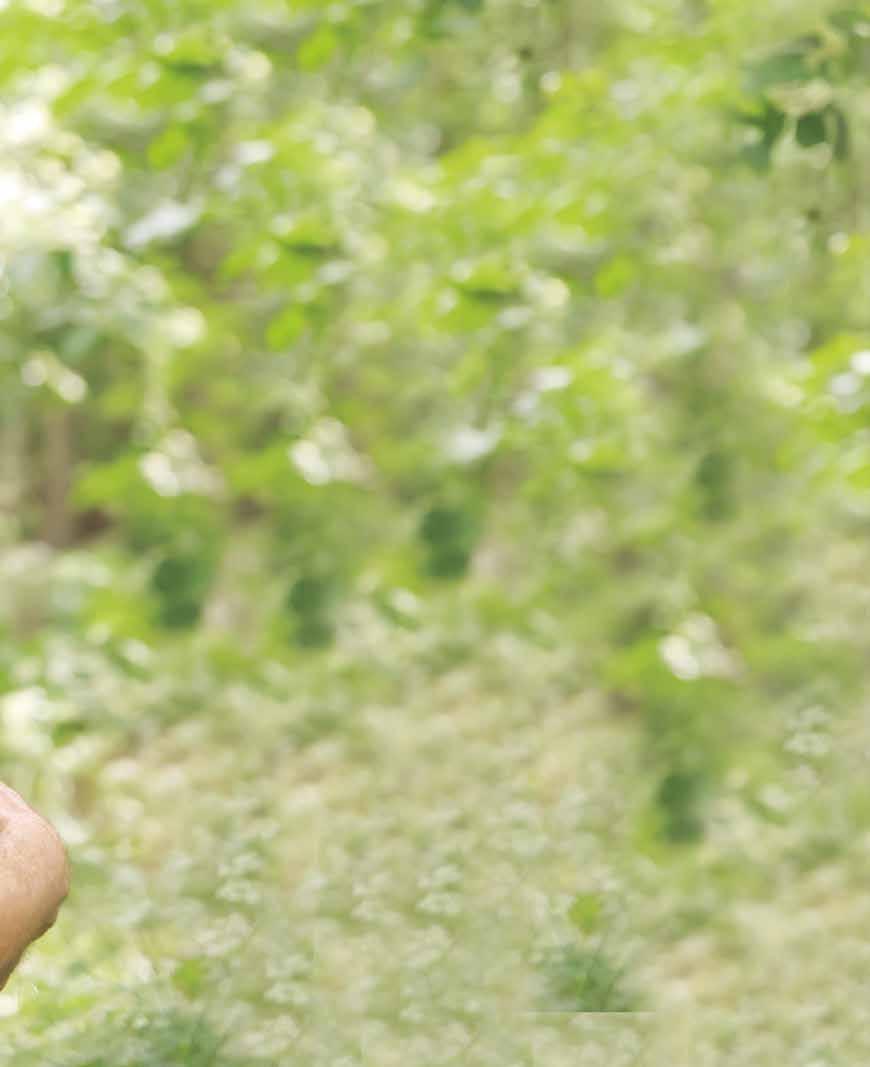 By Radmila Stanković
By Radmila Stanković
He is fortunate enough to be doing a job that he loves. And for him and what he does to be loved by the audience. In the popularity and appreciation rankings of television creators, he is at the very top. His show Sasvim Prirodno [Completely Natural] is a unique documentary testimonial about the beauty of nature and the struggles of life in it. But who really is this tireless enthusiast and investigator who keeps viewers riveted to the small screen and tuned to RTS channel 1?
75 cordmagazine.com MY LIFE
Undoubtedly the greatest living screenwriter of television shows that have occupied our small screens for decades – Better Life, Hot Wind, Happy People etc. – is Siniša Pavić, who is today still with us at the age of 90. He remains sharp witted and is an interesting interlocutor. He recently told the author of this article that he no longer really watches television because there’s nothing to watch, but he never misses the shows of Jovan Memedović, because they present the only ’normal life’ that can be found on the box today.
I’ve chosen this Sinisa Pavić statement to introduce this interview with Jovan Memedović (63), the only television journalist in the country to have long since outgrown that role and become a kind of national treasure, because he’s placed his knowledge, work and efforts in the service of preserving nature and healthy living in Serbia. He has been explaining and demonstrating for years, or more precisely decades, that there can be no strong Serbia without strong rural communities, because Serbia dies when its villages die. His most beloved comments are those that come from viewers, because he is equally good at conversing with everyone.
“I’m only incapable of conversing with politicians. I encounter them, they want to tell me something, they sometimes insist that we meet up for a chat. However, I realised long ago that they come from a completely different world and that I don’t even know how to talk with them. It is similar with civic structures in smaller towns. Fortunately, I collaborate very well with everyone else. With the villagers I’m instantly a brother, a first cousin. And I try to help them in every way I can. The common man has been sadly neglected.”
When he cruises around the country, he notices the negative consequences of our poor conduct in the natural world. And he loudly tries to draw attention to that, often going far beyond the producing of a TV
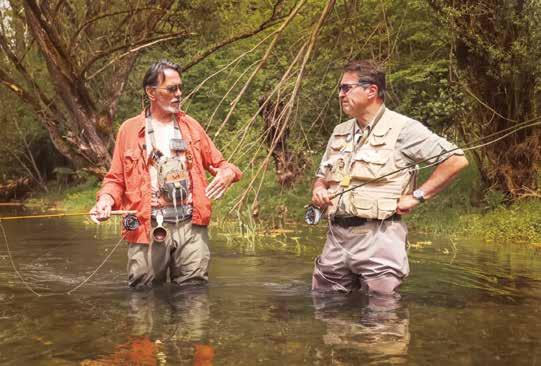
testimonial. Around a year ago, for example, he brought together volunteers to clean Lake Perućac. They packed bags with tons of rubbish and leftovers that had been dumped in and around this gem of the Drina river canyon.
He recently quit his job after a 30year career at national public broadcaster Radio-Television of Serbia, but RTS continues to air his shows – the top-rated Sasvim Prirodno [Complete-
we sat and talked. Of everyone sitting in the garden, the dog only approached his master.
Jovan’s early career interests were largely determined by his Montenegrin origins, with his father hailing from the Drobnjak area of mount Durmitor and his mother originally from Cetinje. They both died relatively young, but they first prepared him well enough to handle life. He says that he first fell in love with nature as a child.
ly Natural] and the franchised game show The Chase. Apart from being widely renowned for his work, Memedović is also a favourite among the country’s ladies, just like the former most famous presenter of TV Belgrade, Miloje Mića Orlović (1934-2013). He is also loved by animals, which I witnessed myself when watching him pet his white husky in the garden of Vračar’s Monks Bar, where
“As my parents are both from Montenegrin regions, I spent my summer holidays mostly by the sea, with my mother’s relatives in the Bay of Kotor, or on Durmitor. At the seaside I fished, while on the mountain I helped my relatives with all the household chores and their livestock. Those two interests later followed me throughout my entire life.”
He completed the 4 th Belgrade Gymnasium grammar school and lower music school, competed in judo for many years, and graduated from the University of Belgrade Faculty of Sport and Physical Education. During his studies, he had a mandatory course that included spending ten days camping in na-
76 october
Our eye no longer recognises the wilderness as an environment, but rather sees it as a danger. For city folk, the wilderness is already a potential danger
ture, and it was then that he experienced his self-discovery. He discovered the life that he belongs to.
He classifies the upbringing he received at home as being in the ‘Montenegrin paternal style’, which means that his father was a natural man who was inclined to view life in a simplistic way. His father an economist and his mother was a psychologist, and together they attempted to ensure that he and his sister acquired and developed what would be referred to as ‘good taste for life’. His sister, Olga, spent more than 20 years working as head of the UN’s developing countries department in Vienna. A top expert, she earned her doctorate in economics in the Netherlands.
His father relocated from Montenegro to Belgrade in 1957 and bought a piece of land in the Dedinje neighbourhood that was being used to cultivate corn. There he built his house, and despite spending the next 30+ years living there, his strong accent didn’t change until his dying day.
“He didn’t devote much time to me; he wasn’t overly interested in my desires and didn’t respect them much. I got used to listening to him and not arguing with him much. We didn’t socialise. My father was much closer to my sister, and I was closer to my mother. I guess that’s how it
goes. They were both quite conservative and led a patriarchal lifestyle. My mother insisted that I attend music school, that I learn English, but I wasn’t a particularly good pupil because I couldn’t calm myself in class; I could hardly wait for the class to end so I could run outside. In a practical sense, my childhood was very closely connected to nature, but under the great and strong influence of my mother – for which I’m very grateful to her.”
There isn’t a single job at TV Belgrade, or RTS, that he hasn’t done.
“For the first six years, I was a freelance journalist and even worked without being paid a dinar. As I began transferring from one job to another, my love for the work also grew. I initially wrote news, then presented shows of various profiles – informative, entertaining, sports – and was constantly considering ways to do things even better and with more
quality. The only thing that I ignored was the fact that it was very difficult to live on a television salary. Television is an underutilised medium in our country. It is mainly used in the function of something that serves the government – regardless of whether it’s this or that government. Ordinary folk are completely neglected in terms of what they can hear and get from watching television. Television isn’t used in the function of serving an ordinary person who needs to find out something, to be useful to them in their life. Television isn’t capable of doing that. And I’m not referring only to the television programming of today, but rather going back 20-odd years, because it is overburdened by politics that literally pulverises everything in front of it. Unfortunately, television is most often in the hands of people who don’t know the work they need to do; they usually don’t even know what television is capable of, and then the programming largely boils down to banality and cheering something on. In our country we have cheerleader television.”
His dedication and addiction to creating something good on television has not abated for three full decades. He has received invitations from numerous individual political figures to join this or that party, which he has always declined.
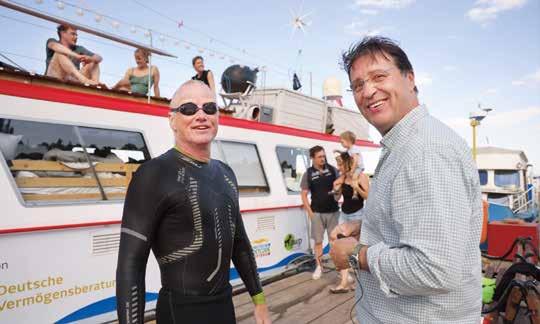
“I nevertheless persevered because I dedicated myself to life issues, to human issues, because I gave my word to some other people, and not just politicians. My life and professional motto is to present people who deserve to be heard and seen by as many people as possible because of what they do and what they’ve dedicated themselves to doing; to work together with them to demonstrate concern for preserving the natural wealth and beauty of Serbia, but also to show how much we’re incapable of preserving and how ready we are to destroy what we’ve been gifted.”
He has had to expose himself to numerous hardships in order to present
77 cordmagazine.com
Television isn’t used in the function of serving an ordinary person who needs to find out something… it is overburdened by politics that literally pulverises everything in front of it
profound events and landscapes. For instance, in order to shoot a chamois goat in the Tara River Canyon, he spent five days freezing, hiking and climbing like a goat before managing to film it from a distance of 50 metres. Elsewhere in the world, these kinds of reports are created with an incomparably larger team and over incomparably longer periods. And only willing enthusiasts like Jovan are able to work ‘tooth and nail’ and create something with four days of shooting that requires a month’s worth of footage elsewhere in the world. And when events haven’t allowed him to hesitate, he has always been the first to react.
“While the floods of 2014 were happening, I spent more time on the ground than the rescue services. Not to anger them, they were obviously there too, but here’s an illustration. It was a forbidden zone; you couldn’t get through because everything was inundated. I was considering how to get to a village that had been submerged. We took a canoe and headed around the Sava to get to the other side, only to return to the Sava and head downstream to enter the village. And we saw what it looked like. We returned to the riverbank, where my fellow journalists were standing in colourful ankle boots with microphones in hand, announcing that the floodwaters were high and returning to their newsrooms. And we went by canoe, saw how it looked, filmed the situation and brought information back directly from the scene.”
The places where he’s been for his shows sometimes seem dangerous to the viewer, but he doesn’t see it that way.
“Our eye no longer recognises the wilderness as an environment, but rather sees it as a danger. For city folk, the wilderness is already a potential danger. Going somewhere where people still live like they did a hundred years ago isn’t dangerous – it’s just far away. There were some risky situations, but I always thought of that as being part of my
duties. If I hadn’t considered that a given, would I have done this job for so many years?”
This interview revealed to me that TV shows about hunting and fishing are slowly losing their appeal, because hunters and trappers are being stamped out by environmentalists. When he did a show about hunting and fishing, he became synonymous with fishermen for millions of view-
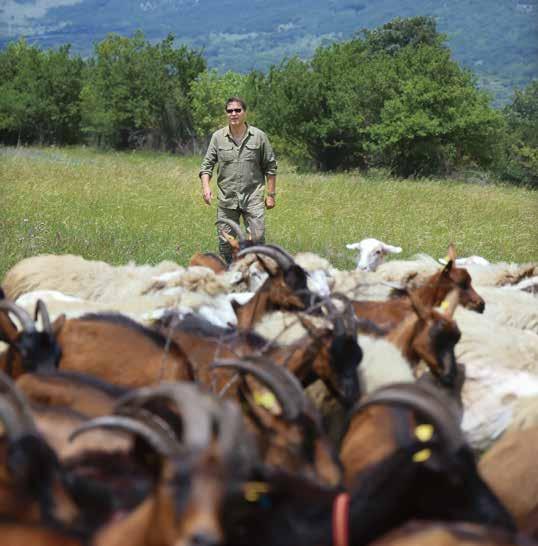
ers, and he was the first to make a show about fishing in the half-century history of Television Belgrade, then RTS. It was also watched by those who don’t distinguish a rod and a hook from a bow and arrow.
“While working on the show The World of Hunting and Fishing, I realised that it is a very narrow topic and that, while I was catching fish, I was missing out on life stories that are much more useful to a wider audience. That’s why I decided on a new concept that enabled me to address different topics and provided an opportunity to travel through nature and peer into the very soul of places and the people who live there. That’s how the documentary-travel series Completely Natural emerged, which is still running today. While working on this project, I once again visited Siberia, the Far East, the Kola Peninsula, Norway, Tajikistan, Kyrgyzstan, Svalbard, and most European countries. Of course, most of the documentary stories I shot were in Serbia.”
Jovan rides around on a bicycle or a motorcycle, spent a long time driving a pickup truck that was a gift from a sponsor, while a sponsor has now given his team a comfortable
78 october
We aren’t much of a quiz nation; we don’t make good quizzes and all our game shows are made by someone else and we then transpose and adapt them
Subaru. However, in the show we often see him with a wooden staff, conquering areas that ‘even God forgot’, making it unavoidable to ask how many pairs of boots this travel writer has. What followed was a detailed description of various ‘exotic’ footwear without which he wouldn’t be able to hit the road.
“I have around a dozen, maybe more, with different ones for different occasions. Rubber boots are a must. I have waders up to the knee, two that reach the hip, and two that actually extend into waterproof overalls in which you can enter the water. I could open a shop not only because of the number of boots I have, but also because of their purpose. I’m great friends with people who sell equipment for the kind of exploring and travel that I do. And they call me whenever new items appear. If you’re not suitably dressed, if you don’t have appropriate footwear, the journey turns into a nightmare. The most important thing is what I wear as a first layer in contact with the body. It is obligatory for that to be wool – the most compact, finest, thinnest. Because it is thin, it naturally wears out quickly. The jackets I wear on my travels represent a special story. If they are too thick, you can’t get into the car with them on, you can’t walk in them because they soon become a heavy weight on your back and you start to sweat. There are now various heating aids – put a special insole in a shoe and it retains heat for ten hours.”
Prior to receiving an offer to host the popular game show The Chase, which is broadcast on RTS, this journalist already believed that he could do the job. He knew that a large part of the success of any quiz show depends on everyone who appears being true to themselves.
“I love The Chase, because in that game show I don’t pretend for a moment, I don’t play, but rather I’m just myself. And the most important thing for me is to relax the competitor, to approach them in the best possible
way, to relieve them of any stage fright. We aren’t much of a quiz nation; we don’t make good quizzes and all our game shows are made by someone else and we then transpose and adapt them. Our people aren’t as fun in front of the camera as some other nations. Our people are careful not to do anything embarrassing and think only about what others will say. A knowledgeable interlocutor once explained to me that this is because we are mostly a depressed people. I didn’t verify that.”
When we were making arrangements for this interview, Jovan told
me that he would be on holiday until 5th September. It is interesting to know what he means by a holiday.
“I even took a computer on my holiday and wrote. I realised after three days that I wouldn’t be able to rest. I closed the laptop and forgot about it. And I have a lot of work waiting for me.”
There is a funny story about a person who was under hypnosis as part of an experimental project to determine how much hypnosis can help people overcome addiction. The project was led by Dr Tihomir Kojić, while Jovan’s mother also participated in it as a psychologist. The project ran for several years, and at one point Dr Kojić permitted each member of the team to ask the patient under hypnosis whatever interested them. Jovan’s mother asked what would happen to her children, who were then still in school, and the hypnotised girl answered: ‘Your daughter will be a scientist, and your son will be very famous and popular’.
Everyone laughed at the time, and Jovan still smiles today as he recounts what was foretold by the hypnotised girl.
And he concludes this interview, with a great dose of satisfaction, by stating the following:
“The essence of the work I’ve done to date, and that I believe I’ll continue to do, is that it only differs slightly, or almost not at all, from how I live. Fate brought me to this job and I realised that I can always do it, because I would live like this even without a camera. I love this job and everything I do is a great pleasure for me. Who would go to Vienna to film garbage collectors otherwise? I’ve shot three shows at rubbish dumps this year alone, and I’ve never seen any other journalist doing that.”
Unlike all other previous My Life articles for CorD Magazine, this one was – at the request of Jovan Memedović himself – dedicated exclusively to the work of this television personality, without any mention of his private life.
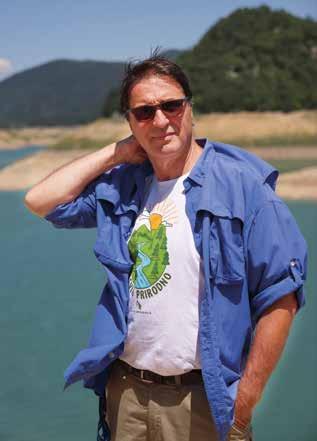
79 cordmagazine.com
Unfortunately, television is most often in the hands of people who don’t know the work they need to do and the programming largely boils down to banality and cheering something on. In our country we have cheerleader television
Japan’s Population of Those 100 Years of Age Hits Record 92,139
The number of individuals in Japan who have reached 100 years of age has climbed to a record 92,139, with women making up 88.5% of this total, according to the country’s Ministry of Health, Labour and Welfare. This record also signifies the 53rd consecutive yearly increase in centenarians, with the nation now having 1,613 more centenarians than the previous year. Japan boasts one of the world’s most rapidly ageing populations, averaging 73.74 centenarians per 100,000 people. Of these centenarians, 81,589 are women, with Fusa Tacumi from Osaka Prefecture being the oldest at 116 years. Data from the ministry showed that in 2022, the average lifespan for Japanese women was 87.09 years, while men had an average lifespan of 81.05 years. The number of centenarians in Japan has surged from 153 in 1963 to the current record, with this growth attributed to medical advancements and care.

Nobel Prize Amount Raised By SEK 1 Million

The Nobel Foundation has decided that the 2023 Nobel Prize will amount to SEK 11 million per prize category. This represents an increase of SEK 1 million per prize category compared to the previous few years. At the end of 2022, the market value of the Nobel Foundation’s total invested capital was SEK 5,799 million. The Foundation has chosen to increase the prize amount because it is financially viable to do so. When the first Nobel Prizes were awarded in 1901, the prize amount was SEK 150,782 per category. Over the past fifteen years, the prize amount has been adjusted several times. In 2012, the size of the Nobel Prize was reduced from SEK 10 million to SEK 8 million. At the same time, a broadbased programme to strengthen the Nobel Foundation’s finances was initiated.
Two Pubs Close Daily in England and Wales
Pubs in England and Wales are shutting at an alarming rate due to financial hardships, experts warn. Between April and July, 230 establishments closed their doors, which is double the number seen in the first quarter of the year, as reported by the BBC. This indicates that 383 pubs either closed or their premises were repurposed in the first half of the year, equating to roughly two closures per day. By the end of July, the total number of pubs in England and Wales, including vacant ones and those available for lease, had dwindled to 39,404. In the fiscal year ending March 2024, the government offered a 75% tax reduction for pubs and other hospitality businesses, capping the amount at £110,000 per establishment.
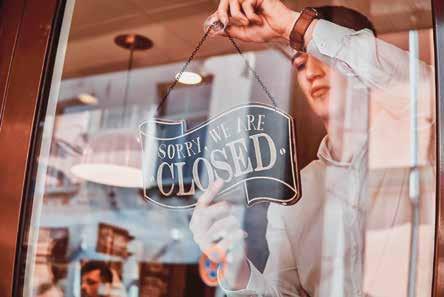
80 october
Chill Out
India Launches First Mission to Study the Sun
India has launched its inaugural spacecraft dedicated to solar research, building on the success of a historical mission that recently achieved a soft landing on the Moon. Named Aditya-L1, the spacecraft was launched from Sriharikota, an island in the Bay of Bengal, embarking on a 1.5 million-mile journey. The mission is expected to last four months, according to the Indian Space Research Organisation (ISRO), which successfully executed a soft landing on the Moon with its Chandrayaan-3 mission. The solar-study mission is named after Surya, the Hindu sun god also known as Aditya. The spacecraft will be positioned around Lagrange Point 1, a location in orbital configuration where smaller objects can remain stationary relative to two larger bodies due to the balancing of gravitational forces.

Venice to Introduce Entrance Fee for Short-Term Visitors

Next year, Venice is set to experiment with implementing a €5 entrance fee for short-term visitors and excursionists to balance the influx of visitors, announced the city council. The charge will be introduced on a trial basis for 30 days, predominantly during the spring holidays and summer weekends when the city sees its highest numbers of tourists. The fee will apply to all visitors aged 14 and above. According to the official statement, the aim is to strike a new balance between the rights of those who live, study, or work in Venice and those who visit the iconic city. The initiative was initially proposed in 2019 but was postponed due to the COVID-19 pandemic. Post-pandemic, foreign visitors often outnumber the approximately 50,000 residents living in the city centre.
World’s Largest Whisky Bottle Sells for $1.4 Million at Auction
The world’s largest bottle of whisky, christened “The Fearless,” has fetched a staggering $1.4 million, as revealed by the auction house Lyon and Turnbull. Towering 1.83 meters, the bottle secured its place in the Guinness Book of Records in September 2021, holding an impressive 311 litres—equivalent to 444 standard bottles. Produced in 1989 at the Macallan distillery in the Scottish town of Speyside, the whisky boasts a pale golden hue and a sweet taste tinged with apple notes. The spirit matured for 32 years in oak casks before it was bottled in 2021. The successful bidder remains an anonymous international collector. Despite its hefty price tag, “The Fearless” did not claim the title of the world’s most expensive bottle of whisky. That honor belongs to a 60-yearold Macallan, which sold for $1.53 million in 2018.

81 cordmagazine.com
COATS EVERYONE NEEDS IN THEIR WARDROBE
RICK OWENS
Oversized Puffer Jacket

The puffer jacket gets a known level of insouciance with Rick Owens’ take on the streetwear staple. This downpadded number features an oversized hooded neck that can be unfastened and left loose for an asymmetric look that perfectly captures the brand’s nonchalant energy.
DOLCE & GABBANA
Wool-Blend Herringbone Coat

Arguably the hero to your entire autumn/winter wardrobe, a timeless coat does most of the hard work for you, regardless of what you layer underneath. This herringbone iteration from Dolce & Gabbana takes the top spot in your outerwear edit thanks to its intricate wool-blend pattern and generous silhouette.
BURBERRY
FABIANA FILIPPI
Shearling Reversible Coat

Milanese label Fabiana Filippi forgoes trends, designing instead for those who appreciate classic Italian style, which is why its iteration is unapologetically pared-back among the pool of patterned fur coats new for Autumn/Winter 2023.
Check-Trim Short Trench Coat

Cotton gabardine, the innovative fabric used to make Burberry trench coats, was invented in 1879 by Thomas Burberry. Breathable, weatherproof and crease-resistant, it revolutionised rainwear – and is still woven at the Burberry mill in Yorkshire.

FASHION 82 october
It’s said that every cloud has a silver lining, and if there’s one thing to love about autumn and winter, it’s the coats. There’s a certain pleasure to be found in rediscovering your old favourites at the first sign of a cold snap – or, of course, treating yourself to something new
YVES SALOMON
Lambskin Pea Coat


Unusually clean-cut for the opulent Yves Salomon, this pea coat is understated in its appeal, but has still been fashioned entirely from the most exquisite materials –lambskin, to be exact.
Y/PROJECT
Brushed Wool-Blend Y-Belt Overcoat

Y/Project’s full-length overcoat is a fashionforward statement piece. The structured and exaggerated shoulders, boxy fit, and cinchable waist make it stand out from its contemporaries.
JW ANDERSON Leather Hooded Trench Coat
JW Anderson’s oversized coat blurs traditional gender lines. The chestnut-toned leather with a vintage finish combines features of a trench coat and a hoodie, finished with an adjustable belt.
RLX RALPH LAUREN
2-In-1 Rover Puffer Jacket

For Autumn/Winter 2023, RLX Ralph Lauren focuses on your performance while using the lowest impact materials to elevate your golfing and outdoor experiences to conscious – yet functional – realms.

83 cordmagazine.com
RHYTHM OF THE DANCE
27 October – MTS Hall
On October 27th, 2023, the highly acclaimed Irish dance show, Rhythm Of The Dance, will be performed at the MTS Hall. This show is known as one of the top three Irish spectacles in the world, and it promises to be a mesmerizing experience for the audience. The performance features a combination of authentic Celtic melodies, distinctive Irish pleas, live music, and mesmerizing singing, all brought together with incredible energy, subtle elegance, and uniformity of movement. The show seamlessly blends folklore elements with the modern rhythm of the metropolis, making it one of the most popular and sought-after dance events in the world. “Rhythm of the Dance” is not just a dance performance, but also a celebration of Irish culture and traditions, presented in a modern and innovative way. The show is a perfect balance of dance, music, theatre, improvisation, and special effects, all performed with breathtaking energy and style. It is an event that is not to be missed!

IL DIVO

28 October – Štark Arena
The name of this year’s tour is “IL DIVO - A NEW DAY TOUR”, within which a series of spectacular concerts will be held, which are a kind of homage to all the most attractive musical arias of famous operatic rock as a unique musical expression that this charismatic ensemble cherishes. The members of the IL DIVO ensemble consist of three tenors, David Miller, Sebastian Izambar, and Urs Bieler, who were joined on this year’s world tour by the brilliant baritone Steven Labrie. The best and most attractive tracks from the “first” 20 years of the existence of the IL DIVO ensemble will be performed at the Belgrade concert, which our music public and fans eagerly await.
BEMUS
8-22 October – various locations
The 55th Belgrade Music Festival, which runs from October 8th to October 22nd, 2023, will feature classical and contemporary art music performances from both local and international stars. The festival will begin with a special gala concert, organized in collaboration with the National Theater in Belgrade, that celebrates the 100th anniversary of the birth of renowned opera diva Maria Callas. The gala concert will showcase the talents of Greek coloratura soprano Vasiliki Karajani and Italian tenor Andrea Cara, who will be performing some of the most beautiful opera arias and duets, under the direction of conductor Diana Chobanov. One of the highlights of this year’s BEMUS is the return of famous violinist Nigel Kennedy, who will be performing two concerts exclusively dedicated to the concert music of Johann Sebastian Bach, delighting the Belgrade audience after a five-year hiatus.
BELGRADE JAZZ FESTIVAL

24-29 October – Belgrade Youth Center
From 24 to 29 October 2023, the Belgrade Youth Center presents the 39th Belgrade Jazz Festival, under the slogan “JAZZSCAPES”. The Belgrade Jazz Festival has been renowned for its current and relevant overview of the best contemporary jazz on the international and Serbian scene for over five decades. As the founder and patron of the Belgrade Jazz Festival, the city of Belgrade included it in events of special importance in 2007. During the six days of the festival, over 100 artists from 20 countries of the world from 4 continents will perform in 21 professional and several high school ensembles. The focus of the 39th edition is the saxophone – 9 ensemble leaders participating in the festival are saxophonists, which will be the biggest manifestation of the role of this instrument in jazz in the recent history of the festival.
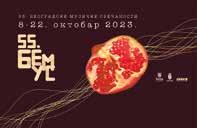
84 october CULTURE CALENDAR
A SKY LONGING FOR MEMORIES
Makoto
Shinkai
Capturing pieces from such lauded works as 5 Centimeters Per Second (2007) and Voices of a Distant Star (2003), this is a must-have for fans of animated artwork. Shinkai, while known for his heartfelt stories, is possibly more admired for his rich and detailed art, which often overwhelms viewers, forcing them into fantastic worlds of wonder. A Sky Longing For Memories collects more than 100 of Shinkai’s art cells from his most famous works and then closes off with interviews from the internationally renowned director and his staff.

4859 rsd
HBR’S 10 MUST READS ON MANAGING RISK

Harvard Business Review
If you read nothing else on managing risk, read these 10 articles. We’ve combed through hundreds of Harvard Business Review articles and selected the most important ones to help your company make smart decisions and thrive, even when the future is unclear. This book will inspire you to: Avoid the most common errors in risk management; Understand the three distinct categories of risk and tailor your riskmanagement processes accordingly; Embrace uncertainty as a key element of breakthrough innovation; Adopt best practices for mitigating political threats...
2510 rsd
THINKING, FAST AND SLOW
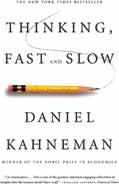
Daniel
Kahneman
Why is there more chance we’ll believe something if it’s in a bold typeface? Why are judges more likely to deny parole before lunch? Why do we assume a good-looking person will be more competent? The answer lies in the two ways we make choices: fast, intuitive thinking, and slow, rational thinking. This book reveals how our minds are tripped up by error and prejudice (even when we think we are being logical), and gives you practical techniques for slower, smarter thinking. It will enable to you make better decisions at work, at home, and in everything you do.
1903 rsd
THE SECRET HISTORY
Donna Tartt
Truly deserving of the accolade Modern Classic, Donna Tartt’s bestseller The Secret History is a remarkable achievementcompelling, elegant, dramatic and playful. “What we did was terrible, but still, I don’t think any of us were bad, exactly; chalk it up to weakness on my part, hubris on Henry’s, too much Greek prose composition - whatever you like.” Under the influence of their charismatic classics professor, a group of clever, eccentric misfits at an elite New England college discover a way of thinking and living that is a world away from the humdrum existence of their contemporaries. But when they go beyond the boundaries of morality, their lives are changed profoundly and forever.

1336 rsd
SABOTAGE: THE HIDDEN NATURE OF FINANCE
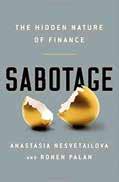
Anastasia
Nesvetailova

This book is a brilliant, intellectual detective story that traces the origins of financial sabotage, starting with the work of a prescient American economist who saw the capacity for banks and businesses to dissemble and profit as early as the 1920s. What was accomplished modestly in the first half of the 20th century became a booming global industry in the 1980s. Financialization took over everything, culminating in instruments so complex and confusing their own creators were being destroyed by them in 2008. With each financial bust, people expect to hear who the culprit is and cynically know to not expect much punishment to ever reach them.
1295 rsd
MALT WHISKY COMPANION Various
The fully revised 8th edition of the Malt Whisky Companion will teach you everything you want to know about your favourite tipple. How should you taste a single malt scotch whisky? Which whiskies are light and flowery, or rich and treacly? How different is a single malt scotch from a distillery in the Highlands to one from the islands? If you find yourself asking these questions, then this may be the book for you!
2956 rsd

85 cordmagazine.com
RECOMMENDS
Faces & Places
NALED’s Annual September Meeting Celebrates Innovation and Reform
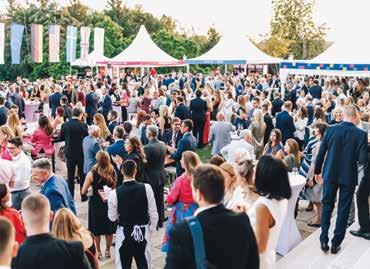
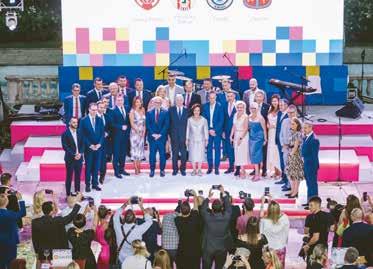
7/9/2023
The renowned September Meeting, now in its 17th year, was recently hosted by NALED under the theme “Innovations – New Reforms and Ideas for a Better Tomorrow”. Held at the White Palace, the event was graced by the presence of over 1,000 guests, including national and local leaders, entrepreneurs, international community representatives, and members of the diplomatic corps. NALED took the opportunity to announce its top members for 2023. Distinguished guests, including Minister of Construction Goran Vesić; His Royal Highness Crown Prince Aleksandar II Karađorđević; and Chairman of NALED’s Executive Board, Vladislav Cvetković, addressed the audience, celebrating the organisation’s 17 fruitful years.
Ambassador Norman Opens Exhibition “A Wide World Of Colour”
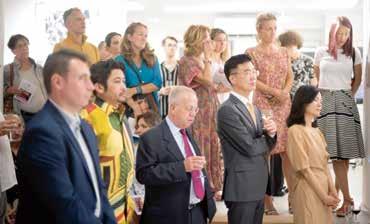
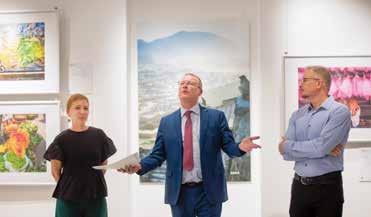
12/9/2023
Canadian Ambassador H.E. Giles Norman opened the exhibition “The White World in Color” by Saša Petričić, photojournalist of BBC News from Toronto, in the Graphic Collective Gallery. At his first exhibition in Belgrade, the author presents himself with photographs he recorded on all continents in his prosperous journalistic career, which has lasted for more than 30 years. Saša Petričić creates and uses photographs uniquely as a journalist, writer and reporter. They are a visual illustration of the scenes experienced in the wars in Syria, Gaza and Afghanistan, at protests, and during natural disasters.
86 october
Exhibition “Japanese Photogravings of the 1970S”
12/9/2023
On 12th September, a travelling exhibition titled “Photographic Images and Matter: Japanese Photogravures of the 1970s” was opened in the Museum of Applied Arts in Belgrade. Mr. Tecuja Cubota, Counselor of the Embassy of Japan and Mrs. Biljana Jotić, Director of the Museum, opened the exhibition. “Geographically distant but united by the common values of respect, friendship and a strong commitment to cultural exchange, our two peoples continue to nurture a bond that marked its 140th-anniversary last year. The beauty of art lies not only in its visual appeal but also in its profound ability to capture the essence of an era, culture and collective human experience. With that in mind, I believe today’s exhibition functions as a universal language that gracefully transcends geographical distances,” said Mr. Cubota.
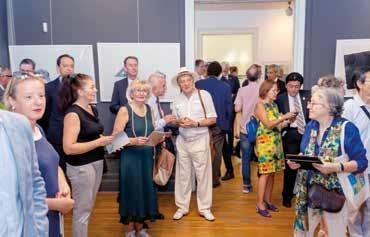
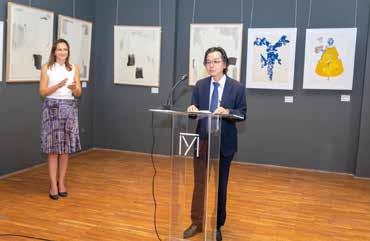
The Annual International Networking Cocktail Held in Belgrade


13/9/2023
Continuing the tradition of gathering representatives from prestigious companies in Serbia, 17 bilateral chambers of commerce and business associations organised the annual International Networking Cocktail. This exclusive event unfolded in the exquisite surroundings of the Metropol Palace Hotel in Belgrade, bringing together over 350 representatives of member companies from these associations. Participants at the cocktail were representatives from a broad spectrum of industries and sectors and members of bilateral associations in Serbia.
87 cordmagazine.com
Faces & Places
Independence Day of Mexico Marked
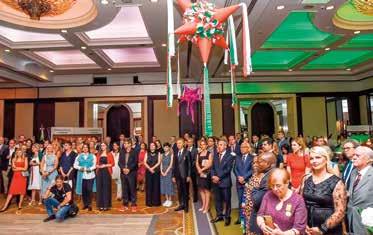
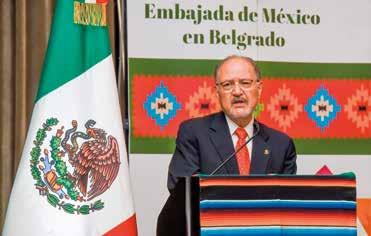
13/9/2023
Ambassador of Mexico to Serbia, H.E. Carlos Félix, led the Independence Day ceremony at Belgrade’s Hyatt Hotel. The ambassador emphasised the advances in the bilateral relationship between Mexico and Serbia and the importance of the Mexican community in the Balkans. The attendees enjoyed Mexican gastronomy and the cultural richness of this country. The reception was attended by representatives of the Mexican community in Belgrade, international institutions in Serbia, many Serbian friends and associates of the Mexican diplomatic mission in Belgrade, media representatives and businesspeople.
Celebratory Stamps Launched Marking 115 Years of Diplomatic Relations between Serbia and Egypt

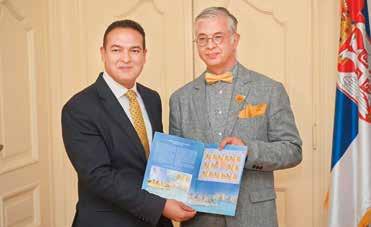
20/9/2023
A special series of commemorative stamps, crafted by the Serbian Postal Service in honour of the 115th anniversary of diplomatic ties between Serbia and Egypt, has been unveiled at the Egyptian Residence in Belgrade. Egypt’s ambassador to Serbia, H.E. Basel Salah, alongside Adam Sofronijević, the Director of Serbia’s Postal Stamp Service, discussed the long-standing and robust tradition of diplomacy and friendship between the two nations, as well as the inspiration for this philatelic release. Highlighting the significance of the stamps, the Serbian Postal Service remarked on the enduring diplomatic and friendly relations between Serbia and Egypt and their peoples, tracing back to 1908.
88 october
Ambassador of Cuba Delivered a Speech on Cuba’s Foreign Policy
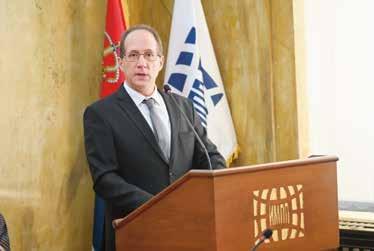
26/9/2023
The Ambassador of Cuba in Serbia, H.E. Leyde Ernesto Rodríguez Hernández, gave a conference on the Fundamentals of Cuba’s Foreign Policy at the Institute of International Politics and Economics (IIPE), in which he highlighted the importance of South-South Cooperation, for a world of equals, in the construction of a community with a shared future for humanity. The conference was attended by the Ambassadors of Argentina, Palestine, and Venezuela, diplomats from the embassies of Mexico, Montenegro, Russia, and Syria, representatives of the Serbian-Cuban Friendship Society of Belgrade, businessmen and medical institutions.
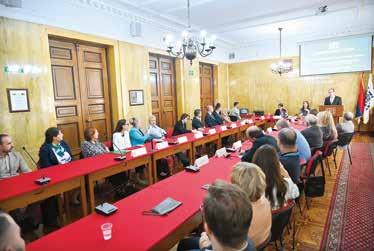
Swiss-Serbian Chamber of Commerce-Holycode Working Lunch
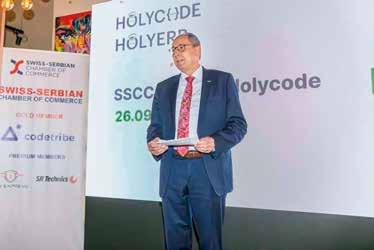
26/9/2023
Swiss-Serbian Chamber of Commerce SSCC held a working lunch entitled ’’The update of the Swiss start-up ecosystem’’ co-organised with SSCC member company ’’Holycode’’. Over 50 guests were greeted by Ms. Ana Grujovic, SSCC Executive Director, and Mr. Milan Nikolić, Co-founder and CEO of Holycode AG. After this, H.E. Urs Schmid, Swiss Ambassador to the Republic of Serbia and Montenegro, emphasised the importance of the ICT sector for the Swiss-Serbian economic cooperation in his speech and welcomed the opportunity to share the Swiss know-how during the working lunch.
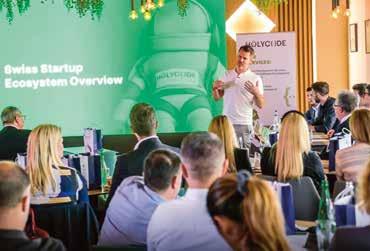
89 cordmagazine.com
Faces & Places
Regenerative Agriculture: Key to Serbia’s Future and Response to Climate Change
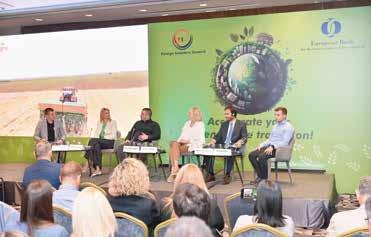
27/9/2023
The inaugural conference on regenerative agriculture has been held today in Belgrade, organised by FIC Serbia in collaboration with the EBRD. Despite the familiar concept, many queries have surfaced regarding its role in bolstering resilience against palpable climate changes, conserving biodiversity, safeguarding the environment, and ensuring sustainable food production for upcoming generations. Matteo Colangeli, the Regional Director of the European Bank for Reconstruction and Development (EBRD) for the Western Balkans, expressed contentment over collaborating with the Foreign Investors Council to elevate awareness of sustainable food production
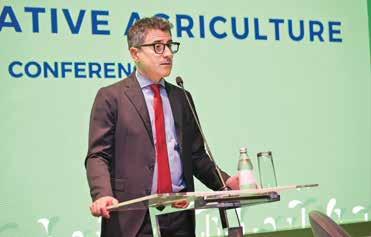
Belgrade Marks European Day with Vibrant Celebration of Linguistic Diversity
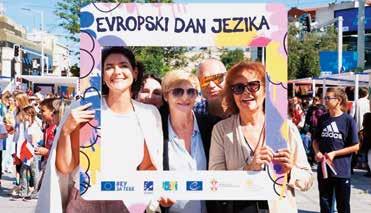
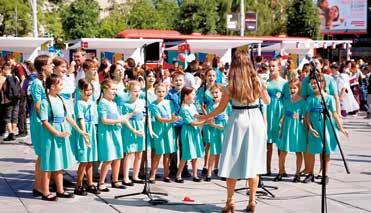
27/9/2023
In celebration of the European Day of Languages, marked annually since 2001 across all European countries, the Children’s Cultural Centre Belgrade, in collaboration with the Delegation of the European Union in Serbia, the Council of Europe, the Ministry for European Integration, the Network of European Union National Institutes for Culture (EUNIC Cluster), and the City Administration of Belgrade, hosted a programme at Republic Square in Belgrade, aimed at promoting multilingualism across Europe and language learning for all ages and backgrounds.
90 october


Strong Partnership
SPECIAL EDITION – GERMANY 2023
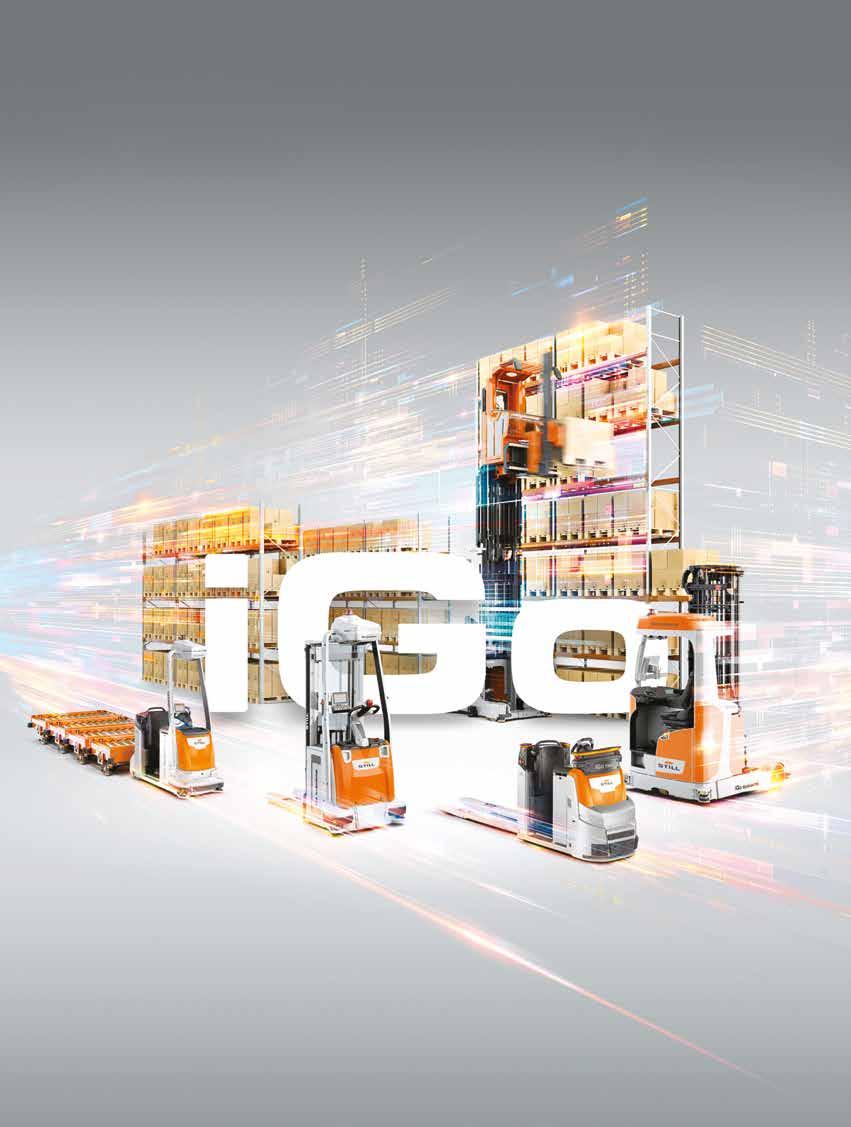
EDITOR IN CHIEF
Neda Lukić n.lukic@aim.rs
DESIGN

Slađan Radosavljević
Zoran Perović design@aim.rs
PHOTOS
Zoran Petrović
COPY EDITOR Mark Pullen
PROJECT MANAGERS
Biljana Dević b.devic@aim.rs
Mihailo Čučković m.cuckovic@aim.rs
Nataša Novković n.novkovic@aim.rs
OFFICE MANAGER
Svetlana Petrović s.petrovic@aim.rs
FINANCE Dragana Skrobonja finance@aim.rs
EXECUTIVE DIRECTOR
Maja Vidaković m.vidakovic@aim.rs
DIRECTOR Ana Novčić a.novcic@cordmagazine.com
PUBLISHER Ivan Novčić i.novcic@aim.rs
PRINTING Rotografika d.o.o. Segedinski put 72, Subotica GERMANY 2023 Published by:
cordmagazine.com 03
Mateje
PAK
Phone: +(381
All rights reserved alliance international media 2023 The views expressed in this publication are those of the presenter; they do not necessary reflect the view of publications published by alliance international media THIS PUBLICATION IS FREE OF CHARGE Contents Germany 2023 05 COMMENT Moving Mountains 06 H.E. Anke Konrad Ambassador of Germany to Serbia Berlin and Belgrade Remain Close 10 Milan Grujić President of the German-Serbian Chamber of Commerce Soaring Bilateral Trade Attracts German Investors 14 Marko Čadež President of the Chamber of Commerce & Industry of Serbia Many Reasons for Optimism 17 Medeja Lončar Siemens CEO for Slovenia, Croatia and Serbia; Vice President of the Board of Directors of the GermanSerbian Chamber of Commerce (AHK Serbien) Acting Responsibly Today is Our Legacy for Tomorrow 18 Alexander Markus Executive Member of the Board of the German-Serbian Chamberof Commerce Serbia is an Appealing, Yet Risky Market 21 Aleksandar Goračinov Project director, SME HUB Encouraging Domestic Producers to Grow and Develop 22 Matthias Tupy Brose Maintaining Momentum is the Challenge 24 Miloš Manić Leoni vice president, general manager Leoni Serbia Ready for the Company to Scale New Heights 26
Schenker Switching Customers to the Fast Lane 27 Dragan Čigoja Lidl Srbija CEO Proud of the First Five Years 28 Dr Christoph Veldhues Director of the Goethe-Institut Belgrade Dialogue is Key 31 Julia Brückner Regional representative of Help-Hilfe zur Selbsthilfe Long-term Collaborative Partnerships 32 Miloš Milovanović Managing Director, Ekotehnika Viljuškari A Leader Remains a Leader 34 Tanja Bogdanov Managing Partner and Founder of Vekol DMC No Compromise on Quality
Darko Bjelić EMBA, CEO, 8. mart Europe is Conquered With Quality 36 Team KROMBERG & SCHUBERT Srbija We Construct, Create and Connect 37 Nemanja Ćirić Business Development Manager at GP Gradjevinar A Full 34 Years at the Top 38 Yunex Traffic Sustainable Mobility Experts 39 Nenad Đorđević Managing director, Hoberg & Driesch Southeast Europe Combining Tradition and Innovation 40 Sanjin Laganin Managing Director, Dr. Oetker Creating a Taste of Home 42 dm drogerie markt Additional Salary Instalment for Staff
Managing director, Head of SEE at Merck Group A Company Where Families Thrive
Economy Can Germany’s Economy Avoid a China Shock?
Cultural Relations Remembering Historical and Cultural Ties
Regional Business Forum The Western Balkans in 2030 and Beyond
50th Anniversary of the Brioni Meeting of Tito and Brandt Gentlemen’s Agreement 56 Special Olympics World Games Berlin 2023 Competing in Unity
alliance international media Prote
52, 11111 Belgrade 17,
125806, Serbia
11) 2450 508 E-mail: office@aim.rs; office@cordmagazine.com www.aim.rs; www.cordmagazine.com ISSN: 2560-4465
DB
35
43 Ina Bulat
44
48
50
54

04 GERMANY 2023
Photo Freepik
Moving Mountains
Bilateral relations between Serbia and Germany are marked by a strong partnership, particularly in the economic sphere. Even geopolitical crises, regional conflicts or high inflation and economic slowdowns in key export markets haven’t been able to significantly disrupt the achieving of results
Germany provides Serbia with considerable support in introducing crucial political and economic reforms aimed at fostering democratic change, strengthening the rule of law and facilitating Serbia’s progress on its EU accession journey.
Development cooperation between Germany and Serbia is geared primarily towards assisting Serbia in its EU accession process. Key areas of focus include green initiatives, renewable energy development, energy efficiency enhancement and sustainable economic transformation. Notably, Germany has entered into a strategic climate partnership with Serbia and the Western Balkan region, demonstrating its commitment to environmental sustainability across the region.
Additional areas encompass vocational education and training, assistance to

Nevertheless, these differences have not hindered the overall relationship, which remains robust.
From an economic standpoint, Germany has emerged as a key partner for Serbia. The presence in Serbia of over 900 companies with German capital has been instrumental in driving economic growth and job creation. The German-Serbian Chamber of Commerce has played a crucial role in facilitating this economic cooperation. And indeed, judging by numbers, it is a success story. The commercial goods exchange between Germany and Serbia has experienced a remarkable surge, with an almost 18 per cent increase in the first four months of 2023 alone. This follows a substantial nominal increase of 26.3% in the trade exchange between the two countries in 2022. These positive results can be attributed to a growing number of German companies either establishing or expanding their manufacturing operations in Serbia. These endeavours primarily involve the production of components for the German industrial sector, further solidifying bilateral economic ties.
the Serbian private sector and the promotion of good governance. Germany has been a pivotal contributor in these areas since 2000, providing approximately 2.3 billion euros, fortifying its existing position as the largest bilateral donor.
By all measures, this cooperation is most fruitful when it comes to economic cooperation, while the two countries have differing positions on Kosovo independence and some issues related to foreign policy and views on the Ukraine conflict.
These achievements suggest that these two partner nations could move mountains and may further excel in their current relations.
In conclusion, while Serbia and Germany have enjoyed considerable economic success and maintain a strong partnership, it is essential to acknowledge areas requiring improvement and challenges that lie ahead. The continued growth of economic ties, coupled with efforts to mitigate risks and enhance market stability, will be crucial in ensuring the continued success of these bilateral relations.
cordmagazine.com 05 COMMENT
Accomplishments to date indicate that these two partner countries have the potential to achieve even greater success and strengthen their existing relationship
Berlin and Belgrade Remain Close
With the reform of the German citizenship law, the country’s federal government intends to create a modern immigration law that reflects the diversity of Germany as a society and modern country ~ Anke Konrad
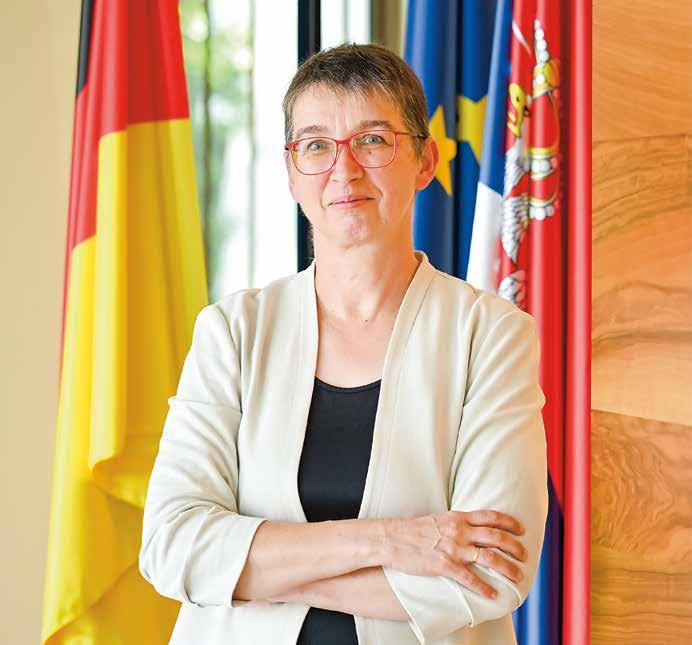 By Ljubica Gojgić
By Ljubica Gojgić
06 GERMANY 2023 INTERVIEW | H.E. ANKE KONRAD AMBASSADOR OF GERMANY TO SERBIA
The Berlin process, as well as the Franco-German proposal for the final normalisation of relations between Belgrade and Pristina, should be interpreted as Germany’s contribution to accelerating the process that ought to lead to Serbia’s EU accession, says German Ambassador Anke Konrad in this interview for CorD Magazine. She adds that economic cooperation between the two countries remains at a high level, as does interest in entering Serbia among German companies. “Of course, the business environment needs to be fair and lawful,” insists Ambassador Konrad, before noting that “the most recent business survey of the German Chamber of Commerce in Serbia, conducted in 2023, has testified that factors like the availability of qualified workers, the fight against corruption, political and social stability, as well as the transparency of public tenders, have an important impact on the productivity of existing investments, as well as decisions on future ones. It is therefore crucial to continue working to ensure a level playing field for all players in the business sphere.”
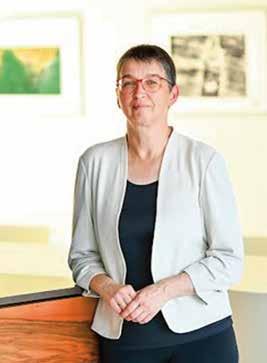
Your Excellency, when you arrived in Serbia a year ago, your initial message was that Serbia is an important partner to Germany. Has anything changed in the meantime when it comes to relations between Berlin and Belgrade? — Relations between Berlin and Belgrade are close and will remain so. Through my first year in Serbia, we have continued our cooperation on a broad range of bilateral issues, as well as on global challenges like, for instance, climate change. The Berlin Process, created in 2014, has taken a big step forward with the conclusion of four mobility agreements that will contribute to furthering cooperation and exchange among all Western Balkan countries mutually, as well as with their European partners. We look forward to the next summit in Tirana, on 16th October, which should open up new avenues for this cooperation.
With the Franco-German proposal, Berlin and Paris have provided an important contribution to agreements reached in Brussels and Ohrid at the beginning of this year to further the normalisation of relations between Belgrade and Pristina. We also see our engagement in all these areas as our contribution to advancing Serbia on its journey to membership in the European Union and we will continue our support.
German media recently received a letter in which several Western politicians, including Michael Roth, Chair of the Bundestag Foreign
EU
Our position remains clear: the future of the Western Balkan countries lies in the European Union
INVESTMENTS
interest in investing in Serbia remains high among German companies, including investments in the expansion of existing companies or the diversification of their portfolio
ENLARGEMENT
The enlargement of the EU remains our goal. This includes Serbia, as well as all other countries of the Western Balkans
Affairs Committee and a member of the ruling SPD, allegedly call on the EU and the U.S. to distance themselves from Serbia and support the Kosovo government over current events unfolding in the north of the province. The letter includes a call to “learn from our past and ensure that we do not pursue Belgrade-centric policies in the Balkans”. Is this the personal position of Mr Roth or is he actually announcing a change to German foreign policy?
— The role of the German Foreign Affairs Committee is to monitor and evaluate our foreign policy. The committee may provide the government with advice and recommendations on foreign policy, stemming from discussions and analyses that take place there. The letter therefore represents an impetus for public debate and does not signify a change in German foreign policy. Our position remains clear: the future of the Western Balkan countries lies in the European Union. To this end, Serbia and Kosovo will have to take important steps toward one another. They confirmed their willingness to do so six months ago in Ohrid – the task for both sides now is to implement those commitments.
In your statements given to media here in Serbia, you refuted the claim that Germany “supports only one side” in Kosovo. To which side do you attribute responsibility for the latest escalation of problems in the north of Kosovo?
— We have a situation between Serbia and Kosovo that is not sustainable and that has been de-
cordmagazine.com 07
priving both countries, and the people who live there, of many development prospects for many years. The basic agreement, namely the Ohrid Agreement, with which both sides agreed earlier this year to further normalise their relations, is therefore an important and responsible step that we support and which must now be implemented by both sides without additional conditions. It is now the responsibility of both sides to conduct and continue the dialogue on the implementation of Ohrid seriously and constructively, and to take concrete steps. We should always bear in mind that the normalisation of these relations is, first and foremost, about the future of the people of the two countries, as well as the future of the entire Western Balkan region.
Late June saw German company Hansgrohe open its new plant in Valjevo, announcing work for as many as 100 workers. Does this serve to confirm that German investors are still interested in investing in Serbia?
— Yes, interest in investing in Serbia remains high among German companies, including investments in the expansion of existing companies or the diversification of their portfolio. I would like to emphasise that these investments
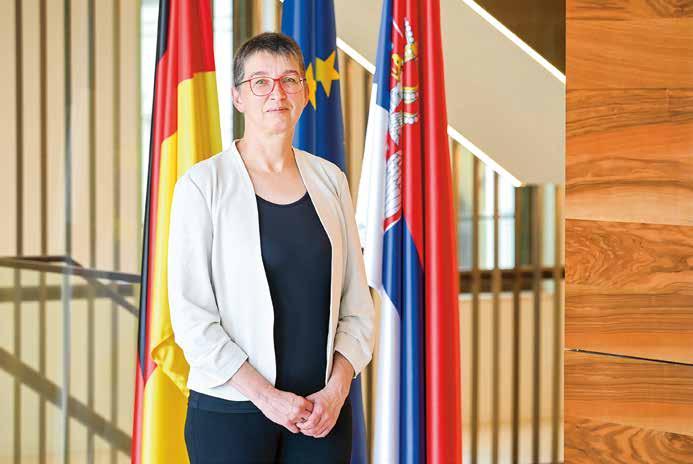
lead not only to the creation of additional workplaces, but also highly qualified ones, creating new prospects for specialists, also in the IT sector. By setting new standards with regard to working conditions, dual education, environmental protection or energy consumption, German companies contribute directly to Serbia’s EU accession path.
Of course, the business environment needs to be fair and just. The most recent business survey of the German Chamber of Commerce in Serbia, conducted in 2023, testified that factors like the availability of qualified workers, the fight against corruption, political and social stability, as well as the transparency of public tenders, have an important impact on the productivity of existing investments, as well as decisions on future ones.
08 GERMANY 2023
The Ohrid Agreement, is an important and responsible step towards normalisation that we support and which must now be implemented by both sides without additional conditions
It is therefore crucial to continue working to ensure a level playing field for all players in the business sphere.
Germany is viewed from within Serbia as an EU member state that strongly supports expansion of the Union to encompass the countries of the Western Balkans. Given the current pace at which this process is unfolding – not only in the case of Serbia, but also with Montenegro and particularly North Macedonia – does any basis exist to believe that expansion is a realistic option in the near future and on what does that depend?
— The enlargement of the EU remains our goal. This includes Serbia, as well as all other countries of the Western Balkans. That’s why we continue to support Serbia’s efforts on this challenging path. And that’s why we are simultaneously also working on the future of the EU.
Will the German public support the government’s initiative to significantly ease the procedure for obtaining citizenship, including the option of dual citizenship, which is a topic of interest to a large number of German citizens with Serbian roots who do not yet have a permanent status solution?

— With the reform of the German citizenship law, the federal government intends to create a modern immigration law that reflects the diversity of our society and modern country. The draft law envisages that, in the future, foreigners who are able to make a living for themselves will be able to apply for naturalisation after only five years resident in Germany. Moreover, they will not have to give up their orig-
inal citizenship. Of course, this would also benefit Serbian citizens who have lived in Germany for a very long time and who are well integrated. The draft law will have to pass the German Bundestag, and therefore might be subject to change following discussions between the members of the parliament. It is not yet clear when the new law might enter into force.
cordmagazine.com 09
By setting new standards with regard to working conditions, dual education, environmental protection or energy consumption, German companies contribute directly to Serbia’s EU accession path
Soaring Bilateral Trade Attracts German Investors
The forecast for the bilateral trade exchange between Serbia and Germany until year’s end is exceptionally optimistic, primarily driven by two consecutive years of double-digit growth in Serbian exports to Germany. These positive trends contribute to Serbia’s continued appeal to German investors
The majority of economic experts assume that economic growth in Serbia will total around two per cent in 2023, while the National Bank of Serbia (NBS) anticipates a growth rate of up to three per cent. Real GDP growth could experience a resurgence from 2024, possibly reaching four per cent. This is attributed primarily to FDI inflows, followed by an increased export volume, given that many manufacturing companies produce components in Serbia for their own industrial production, or products for the markets of their home countries. According to NBS data, inflows of foreign capital during the first four months of 2023 totalled approximately 1.3 billion euros, representing a surge of nearly 70 per cent compared to the same period of 2022. That is a major growth driver for Serbian export.
“As a consequence of this, when we observe current facts and figures, the forecast for the foreign trade exchange between Serbia and Germany until the end of this year is exceptionally optimistic,” says Milan Grujić, president of the German-Serbian Chamber of Commerce. “Due to the double-digit growth of Serbian exports to Germany over two consecutive years, the trade exchange between Germany and Serbia achieved a balance in 2022 for the first time after many years. Imports and exports reached a combined total value of eight billion euros last year. These
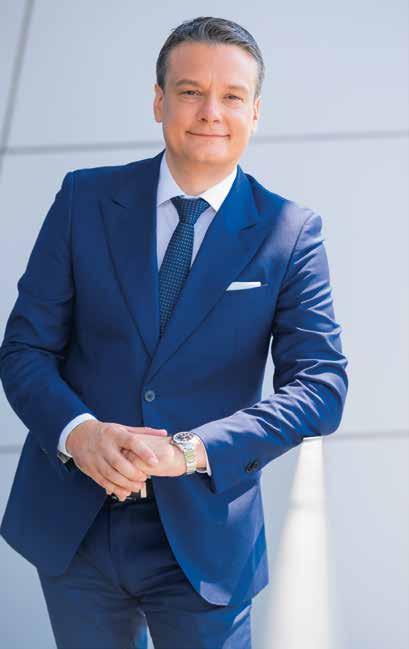
10 GERMANY 2023
INTERVIEW | MILAN GRUJIĆ PRESIDENT OF THE GERMAN-SERBIAN CHAMBER OF COMMERCE
Serbia’s digital transformation initiatives are all geared towards nurturing a digital economy-friendly environment
are all very good figures, and one of the reasons Serbia remains an appealing destination for German investors.”
How have German companies that are either investing for the first time or reinvesting in Serbia responded to the forecasts of a slow recovery for the global economy?
— The ups and downs of the economy are always challenging. This is no different today. In Germany, many experts see serious signs of recession and this will have an influence on demand.
However, German and Serbian companies that are members of the German-Serbian Chamber of Commerce have positively assessed the business climate in Serbia and expressed favourable expectations within their own operations.
Despite the difficult economic situation in Germany, 87 per cent of surveyed companies would invest in Serbia again. We see this not only in the results of our survey, but also in reality. For example, at the beginning of 2023, German automotive parts supplier Continental expanded its investments by inaugurating a ‘mega factory’ near Novi Sad, producing state-of-the-art automotive displays. In April, Bizerba opened its new production facility in Valjevo, followed by Hansgrohe on a neighbouring plot in Valjevo in June. We will soon witness the laying of the groundwork for another German investment by another automotive supplier in Čačak. On another hand, however, we must understand that there is already a limiting factor to this process, in terms of the lack of qualified workers in many Serbian regions.
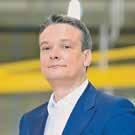
Some economists believe that a decline in inflation, coupled with accelerated wage growth and a robust labour market, will aid the German economy in achieving modest growth throughout the rest of this year. However, this shift does not fundamentally alter Germany’s economic prospects, and any potential downturn in economic activity within the broader region, including Serbia, is likely to be modest.
Have rising inflation and slowed growth impacted the workforce dynamics of your members to date?
— The annual inflation rate, as measured by the consumer price index, is displaying signs of deceleration. According to the Statistical Office of the
RESILIENCE
The Serbian economy demonstrates resilience and continues to grow despite the global crisis
REGION
It is essential to extend the Open Balkan framework to encompass all markets of the Western Balkans
SUSTAINABILITY
We assist Serbian firms that engage with Germany in adapting to new regulations that lead to sustainable business practices
Republic of Serbia, it stood at 15.1% in April of this year and had fallen to 13.7% by June. Conversely, the gradual slowdown of consumer inflation in Germany (HICP) has led to a situation in which inflation stood at 7.6% in April 2023, compared to October 2022, when it was as high as 11.6%.
German companies have created more than 80,000 new jobs in Serbia. Based on the findings of this year’s AHK economic survey, 44 per cent of surveyed companies are planning to increase their workforce, while only three per cent believe that their number of employees will decrease. Furthermore, German companies hold a positive view of factors related to the Serbian labour market: they are satisfied with the qualifications, productivity and readiness of the workforce.
Our projection is that, by 2024, we will achieve a trade exchange worth 10 billion euros and have 100,000 individuals from diverse professional backgrounds employed by German companies in Serbia.
What are the most crucial issues for your chamber today when it comes to improving the business climate?
— The challenges that plagued the planet at the turn of the millennium are still very relevant, with new ones having also arisen, all while the time to react becomes increasingly limited. The year 2030 is fast approaching, and ambitious environmental protection goals can only be achieved through collaboration between the public, private and nonprofit sectors. Given these tumultuous times and the challenges confronting the global economy, it is of paramount importance that all companies in Serbia, including SMEs, base their operations on principles of sustainability and ‘green’ objectives. However, sustainable development must be a task
11 cordmagazine.com
Regardless of ongoing German investments in Serbia, the lack of qualified workers in many Serbian regions is a notable limiting factor
for everyone: governments, societies and businesses, but also professions, consumers and all citizens. There is no time to delay on this path, and for us, at the Chamber, it is a task for today.
Areas where untapped potential for improvement remains include education and the availability of skilled labour. Retaining talented personnel is of vital importance to business needs and demands, as is their adequate education in line with market requirements and trends. Serbia stands as the sole country in the region to have adopted a law on dual education, and the state continues to work tirelessly to promote and bolster the dual education system in order to tailor education profiles to
the needs of the economy. In July of this year, the German-Serbian Chamber of Commerce signed a Memorandum of Cooperation with the Office for Dual Education and the National Qualifications Framework, underscoring the Chamber’s clear commitment to supporting and promoting the national dual education implementation programme, which is indeed one of the Chamber’s strategic goals.
Serbia is one of the countries where the implementation of the German Due Diligence Act is being tested. How is AHK involved in this process and what are your expectations?
— A new German law on supply chains came into effect on 1st January 2023 and requires all companies with over 3,000 employees to submit annual reports to the government on the status of fundamental human rights and compliance with environmental provisions in their supply chains. Starting from 2024, this obligation will extend to all companies with over 1,000 employees.
The German-Serbian Chamber of Commerce, through the “Supply Chains in Serbia” and “Green Economy and Sustainable Development” committees, is assisting Serbian firms that engage with Germany in adapting to these new regulations, and is thus supporting them on
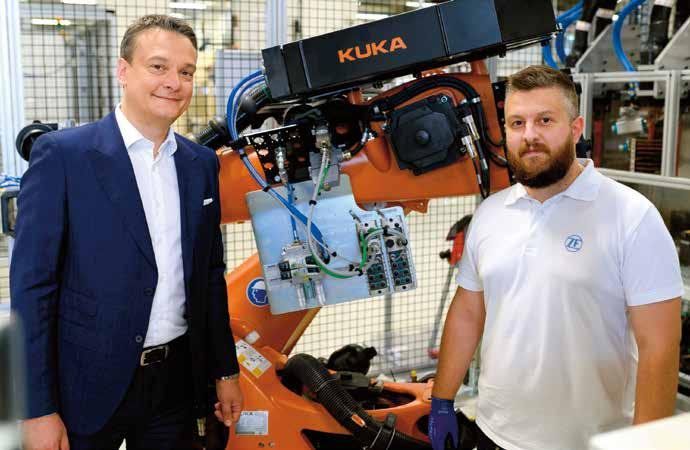
12 GERMANY 2023 12
Despite Germany’s economic challenges, 87% of surveyed companies would reinvest in Serbia
Serbia continues to work tirelessly to promote and bolster the dual education system in order to tailor education profiles to the needs of the economy
their journey towards sustainable business practices. The German-Serbian Chamber of Commerce is already implementing the Young Energy Europe project, which enables young professionals to enhance their expertise in energy efficiency. The Green Hydrogen Business Desk was launched this year as an incentive for sustainable projects and carbon management training at companies.
How do German companies view the development of the Open Balkan initiative, and how do they assess the effects of reducing trade barriers and relaxing regulations governing the free movement of labour?

– The Open Balkan initiative represents an excellent opportunity to liberalise capital flows, as doing so would make the region more attractive for establishing new investments and expanding current ones. However, in order for this initiative to be even more successful, it is essential to extend the Open Balkan framework to encompass all markets of the Western Balkans. German companies planning to establish a presence in Serbia are not only considering infrastructure and local conditions, but also the potential for broader regional engagement, thanks to harmonised standards that apply across the entire region. The development of a common economic market will therefore hold significance primarily for the economy and business, serving as a possibility to attract even more foreign investors.
How would you evaluate the current legislative initiatives that are aimed at enhancing the digital services provided for businesses by the government?
— The concept of digital transformation has been recognised as a pivotal global trend of the world economy — a process that transforms society and the economy as a whole. It is also an essential prerequisite for the survival, growth and development of companies on both domestic and global markets. Throughout the pandemic, digital transformation proved critical to company survival and accelerated the evolution of the European economy. Strategic development programmes for the start-up ecosystem, the legal-regulatory framework, digital infrastructure and public dialogue on digital transformation in Serbia are all aimed at creating a business environment that serves the digital economy.
Given that digital transformation is an ongoing narrative, a story that never truly ends, continuous efforts will be exerted in the direction of analysis and initiatives aimed at enhancing the current business model.

cordmagazine.com
Many Reasons for Optimism
In 2023 and 2024, room has opened up to significantly improve economic cooperation with Germany and break existing records. The Chamber of Commerce & Industry of Serbia provides full support to companies in achieving these objectives
Despite falling international demand and the slowdown in economic activity globally, Germany has remained Serbia’s top foreign trade partner, while the mutual exchange of goods and services continued to grow in the first half of this year, though admittedly somewhat more slowly than over the preceding two years. The exchange of goods increased by 15.6% in the first six months, with the exchange of services up 17.9%, with the total value of mutual trade thus reaching almost 5.5 billion euros.
“That trend has continued in the second half of the year, and we will this year exceed 10 billion euros for the first time, thereby surpassing the record of 9.99 billion euros in the exchange of goods and services that we achieved last year,” says Marko Čadež, president of the Chamber of Commerce & Industry of Serbia. This year’s combined balance in the trade of goods and services could “leap” to as much as 11.5 billion euros, with the exchange of goods exceeding 9.5 billion euros and the exchange of services over two billion euros,” explains our interlocutor.
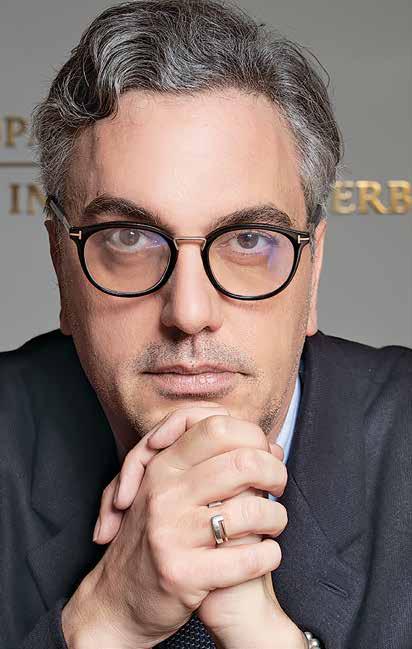
What are the prospects of Serbian exports to the German market continuing to increase under the current circumstances?
— Goods exports grew significantly faster than imports in the first six months of this year, contributing to the deficit in trade with Germany falling significantly. With growth of 24 per cent compared to the same period of last year, exports increased to 2.155 billion euros, while imports were up by nine per cent to 2.382 billion and the deficit fell by 50 per cent – down from 448 million euros in the first half of 2022 to 227 million euros in the first six months of this year. The coverage of imports by exports reached 90.5%, which is the highest percentage in the last ten years.
14 GERMANY 2023 14
INTERVIEW | MARKO ČADEŽ PRESIDENT OF THE CHAMBER OF COMMERCE & INDUSTRY OF SERBIA
Photo Miša Obradović
If the trend of growing sales from the first half of the year is maintained in the third and fourth quarters, Serbian exporters, who last year sold goods worth 3.785 billion euros to German partners, will end 2023 with the highest annual performance on the German market to date, totalling almost 4.7 billion euros, and the prospect of next year recording five billion euros in goods exports for the first time ever. Apart from sales increasing and the deficit reducing, the structure of Serbian goods exports has also been improving year on year, in favour of products with a higher degree of processing, a significant contribution to which is provided by high-tech investments from Germany that are increasingly arriving in Serbia.
Alongside the reducing deficit in the goods exchange, the surplus that Serbia has enjoyed in the trade in services with Germany for years has continued to grow – up by as much as 29 per cent in the first half of the year compared to the same period of last year. The exchange of
and foreign companies that do business in Serbia are engaged in trade with Germany – both exporting from Serbia to Germany and importing from Germany to Serbia. How successful are we when it comes to including local companies in the supply and value chains of German-based multinationals?
— In the new circumstances globally, nearshoring processes have created new opportunities for Serbia and the region to entice more investments and for our companies to be included in the supply chains of European companies that are relocating their operations closer to their home countries. Over recent years, we’ve responded to hundreds of inquiries from international companies, mostly German, that recognise new suppliers among Serbian and Western Balkan companies and that turn to the Chamber of Commerce & Industry of Serbia for support in identifying partners, primarily from the automotive, metals and electrical engineering industries, but also from other sectors. We’ve also continued organising ‘supplier days’ events for individual German companies and training for local exporters, in cooperation with GIZ, the German Association for Supply Chain Management, Procurement and Logistics (BME e.V.) and German companies.
How much room exists to continue, through such activities, to expand the number of Serbian companies that are included in the supplier networks of German companies?

services with Germany reached a value of 954.6 million euros in the first half of this year. Compared to H1 2022, export revenue increased by 20 per cent – to total €603.6 – while imports from Germany increased by 14.3 per cent –up to €351 million. New opportunities for the growth of exports of IT products and services were also created with the noted participation of our gaming industry firms in the world’s largest gaming fair in Cologne in late August, which prompted great interest among publishers, investors, media companies and gamers.
According to statistics that you presented recently, approximately 11,500 domestic
— There is ever more room for that. In addressing the increased interest in suppliers, the Chamber of Commerce & Industry of Serbia is introducing new forms of networking between local and foreign companies. Since last autumn – with the organising of the InterConnect Executive Summit and this spring’s InterConnect B2B Matchmaking Conference – we have launched a series of events aimed at establishing a unique regional platform for connecting domestic companies, particularly SMEs, with international corporations, the majority of which have so far been German, such as Thyssenkrupp Automotive, Zentis Group, Celonis, Mahle, DBW, Skylotec etc.
This year’s conference focused on concrete business discussions – addressing supply and demand, and connecting buyers and suppliers in four areas: metals processing, the manufacturing of equipment, machinery and tools, and the rubber and plastics industries, in which Serbia has special potential and prod-
cordmagazine.com
55 15
This year’s combined balance in the trade of goods and services could “leap” to as much as 11.5 billion euros
ucts that are particularly interesting to international companies.
What does the implementing of Germany’s Supply Chain Due Diligence Act mean for the Serbian economy and to what extent will this law apply to our companies?
— We will know precisely how many domestic companies this law will apply to next spring, with the expiry of the deadline for the submission of the first reports requested by the German companies whose supply chains these Serbian companies are included in. Almost 3,000 companies currently export from Serbia to the German market, but they aren’t all suppliers of German companies that are subject to the provisions of the Supply Chain Due Diligence Act (LkSG), which obliges companies in Germany to conduct risk assessment analysis of their supplier companies in order to prove that they have respect for human rights across their entire supply chain and that they do not have a negative environmental impact.
It is important to note that the domestic companies that are direct suppliers of German companies satisfied all standards of their buyers, including environmental and employee protection standards, prior to the contracting of work and entering the supply chains of German companies. What’s actually new is the inclusion of indirect suppliers in the risk assessment process, which transfers obligations further down the supply chain to the suppliers of direct suppliers.
This is an opportunity for the Serbian economy to increase its competitiveness on the Euro-
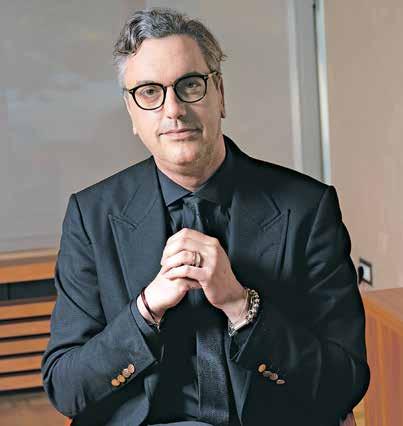
ing for adhering to the EU’s increasingly stringent and demanding rules and regulations.
As a business association, how does the Chamber of Commerce & Industry of Serbia prepare its members to comply with standards relating to sustainability and responsible business?
— We adopted the Green Declaration, activated the CCIS Green Team and formed, in cooperation with GIZ, the Responsible Business Hub to support companies that export to Germany and other EU markets, particularly SMEs.
NETWORKING
The CCIS is introducing new forms of networking between local and foreign companies in sectors where Serbia has special potential
GAMING
pean market and for us to prove that we can offer organised and responsible supply chains that are ready to respond not only to the obligations of German law, but also to other directives at the EU level that have already entered into force or have been announced. Applying and adhering to German law will be a kind of preparatory train -
We have already offered business leaders multiple online tools that will help them – firstly to determine where they stand in relation to the requirements of responsible business, which relate to environmental protection and human rights as defined by international standards and the laws of the most important markets, and then to receive guidelines on how to improve their processes. We are available to assist in terms of interpreting regulations and organising bespoke training for exporting companies and their suppliers, in order to increase the stability of all links in the chain. We will organise workshops on risk analysis and risk management for companies from five industries: automotive, metals processing, textiles, food and wood processing.
New opportunities for exports of IT products and services were created with the participation of our gaming firms in the gaming fair in Cologne SUPPORT
We’ve offered business leaders online tools to determine where they stand on the requirements of responsible business and guidelines for improvement
16 GERMANY 2023 16
Serbian exporters could end this year with the highest annual performance on the German market to date, totalling almost 4.7 billion euros
Acting Responsibly Today is Our Legacy for Tomorrow
Siemens has endeavoured since its very inception to improve people’s lives with the help of technology. It introduced electrification to the world of the 19th century, while it today brings digitalisation as a prerequisite for doing business and competing on the global market
Here we speak with Siemens’ Medeja Lončar about the kind of world we should strive to leave behind for future generations; how Siemens views itself and its role in this time of changes and challenges, as well as the importance of innovations and smart technologies to the future of business.
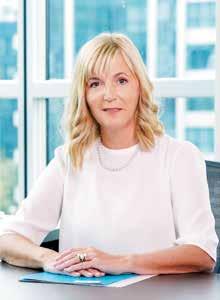
Do you believe that technology should always have a purpose and that today we should focus, among other things, on that which protects our planet?
— Standing behind Siemens’ guiding notion of “technology with purpose” is a clear conviction that all investments in new technologies should be oriented towards areas that will help the planet, reduce the consumption of resources and protect the environment. We today need smart and responsible technologies more than ever, and everything we’ve experienced over the past few years serves as a strong reminder that there is no joking with the climate. As individuals, a society, organisations and institutions, we must understand - from the local to the supranational level - that ensuring sustainability today means leaving a legacy for tomorrow. That’s why it’s essential that each of us, in our domain, do the best we can to bring the finest to this planet, particularly in the struggle against climate change and advocating for a green transition, and to prevent negative environmental impacts. When it comes to the economy, this is achieved through new, modern technologies and constant innovation.
Do you believe that technology, digitalisation and innovation represent the right response when it comes to
Siemens has almost 47,000 approved patents worldwide, and last year alone registered an average of 21 patents per working day
creating a sustainable future, and that companies that fail to realise this will disappear?
— I would say that this awareness is growing by the day and that, among others, global companies that think and operate responsibly deserve credit for spreading this awareness. As an example, Germany has adopted a law stipulating that all suppliers working for German companies must comply with specific rules relating to respect for human rights and adherence to environmental
standards, which then spills over to impact other companies, including those from Serbia that work as suppliers to German companies.
It was eight years ago that Siemens committed to becoming carbon neutral by 2030 – and the company has to date invested 650 million euros in decarbonisation and reduced CO2 emissions at its facilities and factories by 46 per cent. Siemens then, two years ago, set itself even more ambitious sustainable development goals through its DEGREE programme, which implies switching completely to electric vehicles, using energy exclusively from renewable sources and reducing the CO2 emissions of its suppliers by 20 per cent by 2030.
How does a better world and a better future look from your perspective?
— Siemens has almost 47,000 approved patents worldwide, and last year alone registered an average of 21 patents per working day, which clearly testifies to our aspiration to use modern and innovative technologies to ease the operations of other companies and the lives of all of us.
A better world and a better future means a world in which environmentally sustainable technologies have been widely adopted; a world that has bridged the gaps in education and made learning resources available around the planet thanks to smart technologies; a world that enables improved economic inclusion and access to financial services, employment opportunities and tools for entrepreneurship. In short, that better world is one where technologies help to reduce economic, social, educational and other differences between peoples.
cordmagazine.com 17
BUSINESS | MEDEJA LONČAR
SIEMENS CEO FOR SLOVENIA, CROATIA AND SERBIA; VICE PRESIDENT OF THE BOARD OF DIRECTORS OF THE GERMAN-SERBIAN CHAMBER OF COMMERCE (AHK SERBIEN)
Serbia is an Appealing, Yet Risky Market
German companies find Serbia to be an appealing market for sourcing and investments, but they acknowledge its risks, including geopolitical crises, regional conflicts, high prices and economic slowdowns in key export markets, which create a level of uncertainty
During the first four months of 2023, trade in goods between Germany and Serbia reached a value of nearly three billion euros – according to data from the German Federal Statistical Office. This marks an increase of almost 18 per cent.
The foreign trade exchange between the Federal Republic of Germany and the Republic of Serbia increased nominally by 26.3% in 2022, partly due to rising prices, but only partly. “These data indicate significant growth,” says Alexan -
der Markus, Executive Member of the Board of the German-Serbian Chamber of Commerce, who expects a new record total in the bilateral trade exchange between our countries to be set this year.
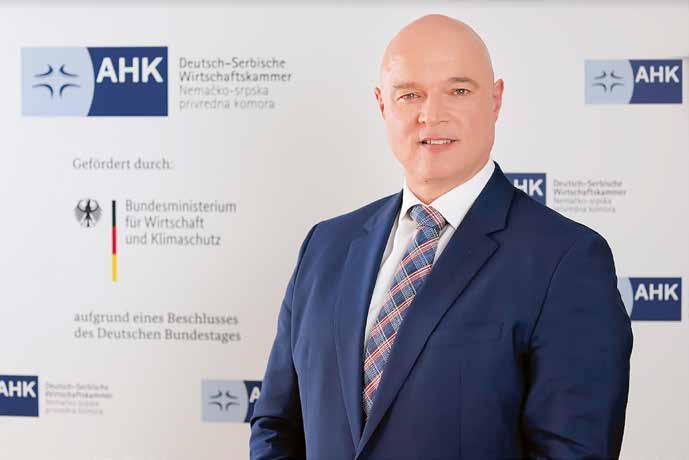
These positive results are due to ever-more German companies producing or expanding their existing manufacturing sites in Serbia. Most of these projects produce components for German industry.
“In the opinion of our members, as expressed in the latest AHK survey on business conditions
18 GERMANY 2023 18
INTERVIEW | ALEXANDER MARKUS EXECUTIVE MEMBER OF THE BOARD OF THE
GERMAN-SERBIAN CHAMBER OF COMMERCE
in Serbia, the assessment of the economic situation in Serbia for the year 2023 has not deteriorated,” says our interlocutor.
Almost half of surveyed AHK respondents (47%) rate their business as good, while only 6% consider it as being less than satisfactory. Business forecasts for the current year also show optimism, with only 7% of those surveyed expressing concerns about a worsening of their turnover and results.
“For German companies, Serbia remains an attractive market for sourcing and investments,” explains Markus. “Nevertheless, they also mentioned certain risks: geopolitical crises and regional conflicts, high prices, and economic slowdowns in key markets of Serbian exporters, which create a certain level of uncertainty for them.”

How would you assess the impact of the Purchasing Initiative Western Balkans in terms of boosting exchanges between companies from Serbia and prospective German partners?
— We particularly recommend looking for new partners in times of supply chain challenges, global uncertainties and transformation processes. Still, market transparency and qualified access to procurement markets remain relevant topics in Serbia. Western Balkan countries have great potential. However, it is not just about sheer quantity – the increasing quality of Serbian companies’ products is evident. Moreover, this initiative focuses on knowledge-sharing, best practices and technology transfers. It has thus contributed significantly to making Serbian suppliers’ products better and to enhancing their competitiveness.
But this only advances one step at a time. First, a German buyer demands samples. They then discuss what needs to be changed to achieve the required quality. The Serbian company must sometimes invest in new equipment, because they cannot attain the necessary quality using their existing machinery. From time to time, the buyer company supports the supplier in doing this, for example by signing long-term contracts or agreeing to specific grace periods.
This year’s main B2B event of the Supplier Initiative is scheduled to take place in Cologne on 12th October. More than 50 German companies have already confirmed their participation. Interested German companies predominantly come from the metal processing sector, automotive supply sector, plastic processing and plastic materials production sector, as well as a smaller number of companies from the electrical engineering and electronics sector.
RECORD
I expect a new record total in the bilateral trade exchange between our countries this year
INFRASTRUCTURE
Infrastructure investments are a major lever for making remote areas more attractive to investors
KNOWLEDGE
During the upcoming autumn, the Chamber is organising studybusiness trips for Serbian companies to acquire knowledge of modern technologies
How often do you organise events at which German and Serbian companies can exchange practices and insights related to technological advancements in their respective sectors and prospects for cooperation?
— We are very proud that we facilitate real exchanges of experience and insights between German and Serbian companies, particularly pertaining to technological advancements in their respective sectors and the potential for collaboration.
Throughout the calendar year, we organise a series of targeted events and delegation trips designed to bring together key stakeholders from both sides, with the aim of establishing business contacts, exchanging knowhow and experiences of businesses, as well as deepening collaboration between German and Serbian companies.
These events vary in nature, ranging from specialised workshops and industry-focused seminars to high-profile conferences and innovation showcases. Our strategic approach ensures that these gatherings are not only informative, but also conducive to forging meaningful connections and partnerships.
Participants in the project Civil Security Technologies and Services in Serbia and Albania had an opportunity this past February to hear about the latest trends in the field of civil security from German experts and companies.
Raising awareness among members about the importance of energy efficiency and sustainability is one of our strategic objectives. That’s why we organised a professional conference on the topic of Energy Efficiency in Buildings in Serbia and Montenegro in May this year. This was an opportunity to hear presentations of experts from Germany and Serbia on this current topic,
cordmagazine.com 19
as well as to get acquainted with German companies and their products and solutions in this field.
During the upcoming autumn, the Chamber is organising study-business trips for Serbian companies and organisations to Bavaria on the topic of “Smart Cities and Digitalisation,” as well as study-business trips for Serbian companies to Baden-Württemberg on the topic of “Agricultural Equipment and Machinery”. These trips are intended to establish business contacts, exchange experiences and acquire knowledge of modern technologies applicable to these directions.
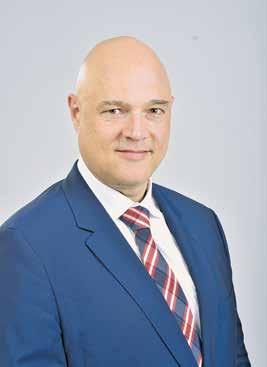
time between these locations will be reduced to 20 minutes. This will be a gamechanger for a town like Ivanjica, and an important factor in attracting qualified workers to Ivanjica, because people will be able to commute between the two locations quickly and easily.
Infrastructure projects have the potential to reshape the economic landscape and to have a significant influence on the strategic decisions of German companies to come to Serbia in the future. That was actually the essence of the business development concept following German reunification in the 1990s. Namely, every Deutschmark invested in infrastructure improvement paid back threefold: firstly as income for the companies executing these projects; secondly as an advantage at the regional level – because East German infrastructure was soon more modern than that of the West; and thirdly as a boost to quality of life for the people living there, which finally brought a halt to the outflow of people from East to West.
This is why investment in infrastructure also has a profound ripple effect in Serbia that extends beyond major urban centres. The development of new roads and railways not only eases travel conditions, but also opens up remote regions, including smaller Serbian towns. And that’s what we see when it comes to investment from Germany: new investors are today usually seeking sites in medium-sized Serbian cities or smaller towns.
How do you consider the effects of the implementation of the Due Diligence Act in Serbia? Will this initiative help companies retain the best workers?
— The vast majority of German companies would not need a law like the “Lieferkettensorgfaltspflichtengesetz”, which we translate into English as “Due Diligence Act”. There is a Latin proverb “nomen est omen” [meaning ‘the name is a sign’]. Unfortunately, there are always some black sheep, that cannot be avoided.
We are witnessing that Serbia, with the support of the EU, is investing a lot in new roads, railways, and broadband internet. Do you think these efforts will encourage German companies to expand further into smaller Serbian cities?
— Yes, I absolutely think so! Infrastructure investments are a major lever for making remote areas more attractive to investors. Let me give you an example: I visited two of our member companies in Ivanjica in August. They are awaiting the extension of the motorway to link the town to the next bigger city, Čačak. When this happens, the driving
In Germany, but not only there and actually all over Europe, we have this term “honourable merchant – der ehrbare Kaufmann”. This term comes from medieval times and played an important role in the Northern German “Hanse” [Guild]. It equates to trust, first of all, because this is a core value and precondition for every business endeavour. But where does trust come from? It comes from honesty, from a commitment to responsible business practices that include good working conditions, employee health and safety, and a sense of contributing to the greater social good. Such factors certainly play an important role in enhancing job satisfaction and engendering a stronger sense of loyalty among employees.
20 GERMANY 2023
The latest AHK survey shows that 47% of respondents have a positive view of the economic situation in Serbia in 2023
Seeking new partners is a must during times of supply chain challenges. Increased market transparency and access in Serbia are thus important
Encouraging Domestic Producers to Grow and Develop
The project SME HUB is the result of a public-private partnership between the Government of Switzerland, which is represented by the Swiss Agency for Development and Cooperation (SDC), and Serbian company ICT HUB
Our aim is to open the door for small and medium-sized enterprises to become suppliers to multinational companies that operate in Serbia. We believe in the strength of Serbian companies and their ability to provide high-quality products – says SME HUB project director Aleksandar Goračinov.
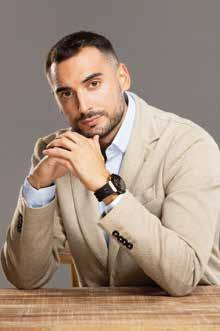
When it comes to some important projects, which includes SME HUB, so little is known in our country and these projects are insufficiently discussed. Could you please explain what kind of project this is?
— SME HUB represents a unique endeavour to realise significant changes across the Serbian economy as a whole by strengthening one of its basic pillars: the SME sector, in the context of its ability to collaborated with players on the global market and major domestic companies. With a value exceeding seven million Swiss francs, this project will enable the transformation of 80 SMEs over the next five years, while more than 400 local firms will be familiarised with the benefits of cooperating with multinationals and large domestic companies, while many will become their suppliers. This form of cooperation will enable domestic producers to become more competitive and advance their operations, with which improved working conditions will be secured for at least 5,300 existing and new workers.
What do domestic manufacturing enterprises gain by joining the SME HUB?
— On the basis of the needs of multinationals and large domestic companies,
SME HUB carries out the selection of potential suppliers and provides support in establishing cooperation. On the other hand, through the medium of this project, small and medium-sized enterprises will have a unique opportunity to utilise their potential and develop further, in order to become competitive on the global market and create an opportunity to expand their business.
SME HUB will work with Serbian firms that have the capacities, qualities and expertise to supply multinational companies with their products. This means that Serbian manufacturing enterprises will have the opportunity, on the basis of the tangibly defined needs of multinationals or large domestic companies, to apply to participate in the project via the website of the project. And those that meet the conditions for inclusion in the transformation process – through a selection process that uses predefined criteria – will be selected. The transformation of their business will take 24 months at the most, after which these Serbian enterprises will potentially meet the conditions required to become suppliers. Applying SMEs must have production activities that have been running for a minimum of three years, between 15 and 250 employees, and minimum domestic ownership capital of 51 per cent.
You directly stimulate the growth and development of Serbian manufacturing enterprises?
— Through this endeavour, SME HUB is building long-term partnerships that enable exchanges of knowhow, technology and best practices by connecting local enterprises with multinationals, which will result in the modernisation and advancement of business processes. We thereby encourage the growth and development of Serbian manufacturers directly. Through the major contribution of the state and numerous incentives, a positive business climate has been created that is recognised by global giants, and SME HUB will further support their business by finding suitable local suppliers.
cordmagazine.com 21
BUSINESS | ALEKSANDAR GORAČINOV PROJECT DIRECTOR, SME HUB
With a value exceeding seven million Swiss francs, this project will enable the transformation of 80 SMEs over the next five years
Maintaining Momentum is the Challenge
Brose is a reliable partner to its customers and a responsible employer to its workers. It also contributes to the development of Serbia’s economy
with Brose parts, we can’t help but ask you what your Pančevo factory is sending out into the world...
Despite numerous challenges, Brose has succeeded in implementing all of its plans in Serbia. According to previous announcements, the company intends to complete its investment cycle in Pančevo by 2025, when it is projected to have a total of 1,100 workers and an annual turnover of 440 million euros.
Has Brose maintained the same positive rhythm since the initial period of its investment here?
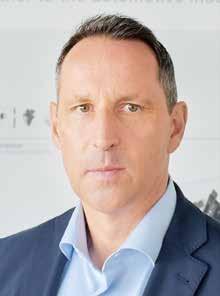
— Brose has maintained its positive rhythm and achieved its goals in Serbia so far. We have launched series production of electric motors for cooling fans, power steering motors and electric oil pumps, as well as electronics at our new plant in Pančevo in the summer of 2021. It was during that same year that we also launched our R&D activities in Pančevo, which we are expanding in accordance with our plan.
Have your plans changed? What kind of vision do you have now?
— Brose has not changed its plans to complete its investment cycle in Pančevo by 2025. The company has so far invested around 180 million euros in the new plant and expects to employ around 1,100 workers by 2025. However, our business development is linked closely to the situation on the volatile automotive market in general, which is today confronting several crises.
Brose’s vision is to shape the future of mobility with innovative, competitive and efficient mechatronic solutions. We are a reliable partner to our customers and a responsible employer to our workers. We also contribute to the development of Serbia’s economy and society by supporting various projects in the fields of sport, culture, education and social welfare.
With awareness of the fact that 50 per cent of new cars worldwide are installed
— The Pančevo factory is an important part of Brose’s strategy to satisfy the growing demand for its products and to develop new technologies for the future of mobility. Our location is the development centre for Cooling Fan Modules (CFM) and we are developing and producing everything regarding that product, expect the plastic frame. Beside CFM, at the Pančevo factory we are also producing and exporting electric motors for steering systems and electric oil pumps, as well as electronics. We are very proud that our products are innovative and installed in modern vehicles that provide a better consumer experience. For example, we are producing electronics for RadarSmart opener generation 3, which enables hands-free opening of liftgate doors. These are mechatronic components and systems that provide comfort, safety and efficiency for motor vehicles. The electric oil pump in particular is a key component of hybrid and electric vehicles.
You have more than 650 employees and excellent cooperation with schools and colleges, while you pay above-average salaries and are considered a desirable employer... Do you believe that your success is dependent on your people’s level of education and motivation?
— Brose is a company that values its employees and their education and motivation. We believe that the company’s success is dependent on the quality and performance of its people, who are the driving force behind our innovative and efficient mechatronic solutions.
22 GERMANY 2023 22
INTERVIEW | MATTHIAS TUPY BROSE
and society by supporting various projects in the fields of sport, culture, education and social welfare
Serbia has taken commendable strides in enhancing its appeal to foreign investors and increasing its competitiveness
Brose offers its employees excellent working conditions and benefits, such as flexible working hours, health insurance, performance bonuses, training and development opportunities, and much more. We also cooperate with schools and colleges in Serbia to support the education and career development of talented youngsters.
Brose provides scholarships, internships, mentoring programmes and practical projects for students and graduates. Brose has also received the Top Employer 2023 award for its excellent working conditions and employee benefits. Brose is highly committed to CSR projects and supports the local community and students of the three biggest universities in Serbia, as well helping with donations to various humanitarian associations.
The industrial revival of Pančevo was launched by company ZF, after which Brose arrived, while we now have an announcement of the arrival of company Naval Box – CAL. Do you expect more German investors to arrive in the city?
— Pančevo has been attracting a lot of interest from German investors, especially in the automotive industry, over recent years. With regard to Serbia’s business environment, it is very evident that Serbia has taken commendable strides in enhancing its appeal to foreign investors and increasing its competitiveness. The challenge now is to maintain or even increase this momentum, especially under the impression of inflation that is a threat to all industries in all countries.
How do you see the future of the automotive industry? Could hybrid, electric or autonomous vehicles fully replace the kinds of cars that we drive today?
— The future of the automotive industry is influenced by many factors, and the automotive industry is currently already undergoing a major transformation, driven by four disruptive technol-
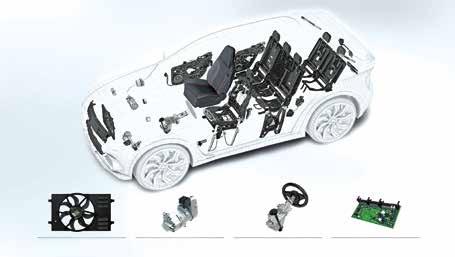
ogy-driven trends: diverse mobility, autonomous driving, electrification, and connectivity.
It is expected that hybrid, electric and autonomous vehicles will gradually gain an increased market share and eventually dominate the automotive industry of the future. Autonomous vehicles are vehicles that use sensors, cameras, software and artificial intelligence to operate without human intervention. These types of vehicles offer many benefits for the safety, efficiency and comfort of drivers and passengers.
However, there are also some challenges and obstacles that prevent hybrid, electric and autonomous vehicles from fully replacing the conventional cars that we drive today, such as the lack of adequate infrastructure and standardisation for charging, parking and communicating with these vehicles, as well as consumer acceptance and trust in these vehicles’ performance, reliability and range.
It is therefore possible that the conventional cars that we drive today will not be fully replaced by hybrid, electric and autonomous vehicles anytime soon. However, they will certainly play a more important role in the automotive industry and society over the long term.
As a result, the automotive industry will need to adapt to these changes and embrace innovation in order to remain competitive and relevant. With its product portfolio, Brose sees more opportunities than risks in this market development.
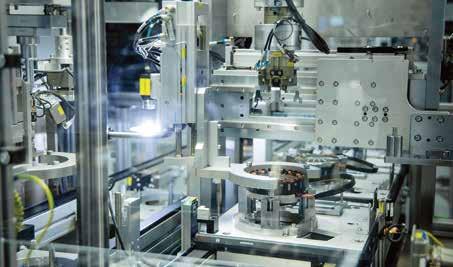
cordmagazine.com 23
We are very proud that our products are innovative and implemented in modern vehicles, which provide a better consumer experience
Ready for the Company to Scale New Heights
Company LEONI is among Serbia’s largest exporters, but is also the largest employer in the country’s industrial sector, with approximately 13,200 employees at four factories. These facts provide plenty of reason for pride, but also carry great responsibility
More than 50% of the value of our product comprises newly created value. We export 100% of our production and our exports are twice as large as our imports, so we provide our country with a clean foreign exchange inflow – note LEONI representatives with pride.
According to the Ministry of Finance’s “Current macroeconomic development” presentation, LEONI Serbia ranks among the country’s top five exporters. What has contributed to such a good result?
— We are proud that we are at the top of the list of the largest Serbian exporters. According to the statistics of the Ministry of Finance, over seven months we exported goods worth 292 million euros, which is an increase of as much as 33% compared to the same period of last year. We handle with seriousness and responsibility the orders of our customers, and they are manufacturers of premium class motor vehicles, and it is this has resulted in good business results. The automotive industry is recovering after the global crisis caused by the covid pandemic and we are happy that we are part of that recovery; that we are able to satisfy the demands of our renowned customers while simultaneously securing the earnings of our employees and contributing to the development of our country.
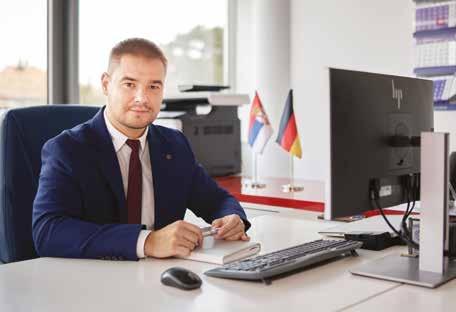
Apart from exports, how else does LEONI contribute to the progress of the Serbian economy and society?
— Our factories are located in Prokuplje, in Malošište in the municipality of Dol-
jevac, in Niš and in Kraljevo. These were all areas with excessive unemployment figures. By hiring more than 13,000 people, LEONI has contributed significantly to reducing unemployment levels in these places. As such, of the total number of workers in Prokuplje, as many as 26% work at LEONI, while in Kraljevo we represent a 15% share of total employment. We have thereby raised living standards not only for our employees and their families, but rather also for the entire community in which they live.
On the basis of taxes and contributions, LEONI provides more than 48 million euros to the state budget annually. We cooperate with more than 700 local suppliers and enable them to generate an annual turnover of approximately 41 million euros. In this way, LEONI isn’t only a
major exporter, but also one of the drivers of the Serbian economy as a whole.
How is LEONI as an employer?
— It goes without saying that the LEONI fulfils all of its legal obligations, such as regularly paying wages, paid overtime and nightshift work, taxes and contributions on the full salary amount, a working environment without harmful influences on health etc. But we also provide more than that; caring for employees is our key value: LEONI Serbia engages as many as 92 buses per day for organised transportation, which are used by more than 10,000 employees. We have clinics staffed with doctors at all four locations, so employees don’t need to waste time going to their regular clinic. Then, on the basis of contracts with the compa-
24 GERMANY 2023
INTERVIEW | MILOŠ MANIĆ LEONI VICE PRESIDENT, GENERAL MANAGER LEONI SERBIA
ny, a large number of retailers provide our employees with benefits. Apart from gifts for New Year and 8th March [International Women’s Day], this year we also provided valuable gifts to 500 first year school pupils whose parents work at LEONI. Apart from being the largest employer, we also strive to be among the best employers.
Is there anything hampering LEONI’s operations in Serbia?
— It is essential to reduce costs in order to generate greater profitability. LEONI pays a high price for high absenteeism in Serbia – in terms of employee absences due to sick leave. Of all the countries where LEONI is present and in the region, the highest rate of sick leave is in Serbia, and is twice as high as it is in the next country. Moreover, the period during which sick leave costs are the on the employer’s account is the longest in Serbia – 30
days, while the practice in most countries is for sick leave costs to be borne by the national health fund after five days. For our common good, we expect our state to intervene urgently and to tailor legislation to satisfy the needs of the economy.
This summer saw LEONI AG change its ownership structure and implement financial restructuring. How will this impact the operations of LEONI Serbia?
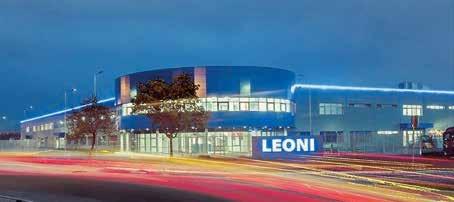
SERBIA 2023
The LEONI Wiring Systems Division is one of the world’s leading providers of complete wiring systems and customised cable harnesses for the automotive industry. LEONI Serbia has been part of that system since 2009.
• 4 factories – Prokuplje (2009), Malošište (2014), Niš (2017), Kraljevo (2018)
• 13,200 employees
• 203 million euros of investment in facilities and equipment
• Production of KSK wiring harnesses for manufactures of luxury vehicles
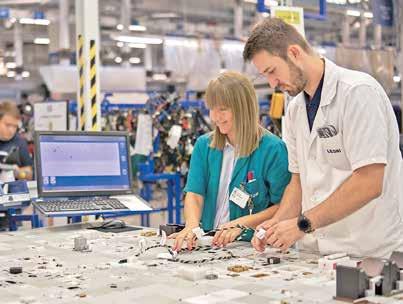
• A network of approx. 700 local suppliers
• Focus on product quality and sustainable development

— I expect the impact to be very positive. Refinancing is underway, and – as announced by our management – to follow in the operational area will be a focus on the needs of customers, the development of technologies and products, and increased efficiency. With its four factories, LEONI Serbia is ready to provide a full contribution to LEONI AG scaling new heights.
What are LEONI Serbia’s plans for the decade ahead?
— Our four factories have been rounded off as elements – in terms of infrastructure and equipment – and as such our next task is to increase productivity and quality. And ensuring the company’s continuity in Serbia. We are working intensively to attract new projects that have the potential to safeguard production until 2035. LEONI is a company that’s known as a pioneer in optimising the development of wiring systems, production and supply chains. Researchers, engineers and manufacturing experts at LEONI designed innovative zonal architecture and we, at LEONI Serbia, will be absolutely ready to realise that innovation when it becomes broadly applied. We know that we will have the strong support of the headquarters of our LEONI Group and our LEONI family in everything we do. The recent restructuring brings new strength to the LEONI Group and we are continuing along the road of success together.
cordmagazine.com 25
Leoni working intensively to attract new projects that have the potential to safeguard production until 2035
Switching Customers to the Fast Lane
DB Schenker is among the world’s leading logistics providers, offering all kinds of transport and logistics services. In an era defined by rapid globalisation and complex supply chain demands, DB Schenker distinguishes itself as an innovative leader and sustainability pioneer in the logistics industry, providing state of the art solutions that keep businesses thriving

lobal Reach, Local Expertise
G| One of DB Schenker’s defining strengths is the ability to seamlessly integrate global reach with local expertise. Our vast network of offices and warehouses worldwide ensures that we can cater to the unique needs of local markets while providing clients with a global perspective, which is proven daily by the team of experts at DB Schenker in Serbia. DB Schenker has been a trusted partner in Serbia for years, offering a comprehensive range of logistics services that cater to diverse industries. We are today present at three locations in Serbia, with over 13,000m² of warehouse space and a team of 85 employees. We have developed a strong local presence and long-term partnerships, establishing ourselves as a go-to logistics provider known for reliability and efficiency.
Land transport that always goes the extra mile | As part of the biggest European network, customers in Serbia can benefit from hassle-free solutions for shipments of any size. The DB SCHENKER freight products system offers a doorto-door service for your freight, with the fastest lead times and daily departures. When it comes to shipments for which delivery time is crucial, we can offer you our DB SCHENKER system premium. For bigger shipments, we recommend part or full load solutions with even higher flexibility and a completely individualised approach to your needs.
We are today present at three locations in Serbia, with over 13,000m2 of warehouse space and a team of 85 employees
With our platform connect, customers now handle their logistics processes even more efficiently and carefree. DB SCHENKER | connect incorporates all services into one portal, providing clients with maximum support at every stage of the supply chain. Faster than ever before, you now have seamless entry to all services. And as if that weren’t enough, you can also easily receive quotes and book additional shipments on a single platform.
As Jelena Kojić, Head of Land transport Area Adriatic (RS, SI, HR, BA, MK), explains: “At DB Schenker we strive for continuous innovation and modernisation. We listen to the market and proactively improve our company process -
es and business technology. We thereby enable our clients to improve and grow their business. We are authentic and transparent. That is the key to our success! The digitalisation of business is part of the modern work environment, which is why we launched our renewed connect platform. Platform allows our clients to organise their transports simply and efficiently. Guided by the needs of our clients, we managed to introduce modern online shopping to the B2B logistics business. Whether large corporations or small businesses, each of our clients can use “Connect 4” to generate real-time quotes and estimate delivery times. We offer a fully digitalised process – from the offer to the invoice.”

26 GERMANY 2023
BUSINESS | DB SCHENKER
Proud of the First Five Years
In just five years, Lidl Serbia has opened a total of 67 supermarkets in 38 cities, which are supplied from two modern-equipped and “green” logistics centres. The company’s 3,300 employees comprise a unique Lidl team that works on a daily basis to provide a unique shopping experience and the best quality-to-cost ratio for all consumers, for which Lidl is recognised around the world
You are this month commemorating five years of operations in Serbia. Have you managed, as a company, to realise all plans; and has our market met your expectations?
— It is particularly satisfying to celebrate five years of successful operations, considering the pandemic and the health challenges we’ve faced. Despite the circumstances, we managed to implement plans at the projected tempo and to improve our processes and systems from year to year, thus enabling us to achieve even greater efficiency in every segment of the business.
And have consumers been satisfied with Lidl over the past five years?

— This is indeed the most important issue for us. We measure success precisely on the basis of consumer satisfaction, which is why we, at Lidl, are proudest of the fact that, according to Gfk research for 2023, we have become the first choice of the largest number of consumers for daily grocery shopping. According to the same research, Lidl also ranks top when it comes to overall consumer satisfaction, while customers also rated us number one in the categories of fresh fruit and vegetables, as well as bakeries. These results show that consumers are satisfied with us, and we will certainly continue nurturing and improving on the trust they’ve placed in us.
Your slogan “Simple. Better. More Affordable” indicates that you prioritise the needs of your customers?
— We strive to ensure that, when observing shopping baskets containing products of comparable quality, the basket of goods purchased at our shops is the most affordable. Apart from price, from day one we’ve also provided consumers with the best quality-to-cost ra-
tio. I believe that over the past five years, because of all of this, we have been simpler, better and more affordable, with the promise that we will continue listening to the needs of our customers. We will also do so through our loyalty programmes, such as Lidl plus, through special segments of the product range, such as our “Free from” brand, which contains a rich offer of gluten-free products, and through other trends in the food industry.
Despite being a German company, you haven’t overlooked domestic suppliers in your operations, while at the same time you’ve also had a positive impact on our country’s exports...

— One of our primary goals – as an international company that acts responsibly towards the countries in which it operates – was to secure products from domestic suppliers that satisfy our high standards of quality. That’s why more than 100 domestic suppliers now contribute products to our range, while, for example, our specially created ‘S ljubavlju, domaće’ [With love, domestic] range of products has almost 100 different items.
On top of all that, in terms of exports, the quality of our products and suppliers has proved exceptional and has contributed to us currently exporting more than 20 products, such as dessert dumplings, baked goods, cheeses, soups, tomato puree and frozen vegetables. This is certainly a direction that we want to retain and we are continuing to work on our exports being even greater, while we will now enjoy the birthday benefits that we’re preparing for our consumers and for our 3,300 colleagues throughout Serbia.
cordmagazine.com 27
BUSINESS | DRAGAN ČIGOJA LIDL SRBIJA CEO
We strive to ensure that, when observing shopping baskets containing products of comparable quality, the basket of goods purchased at our shops is the most affordable
Dialogue is Key
Belgrade itself has such a rich cultural life that the Goethe-Institut is happy to be a small part of it by providing German artists to contribute to well-established festivals like Bitef, the Belgrade Jazz Festival, or BelDocs; by cooperating with institutions like the Belgrade Cultural Centre or the Museum of Contemporary and Modern Art ~ Dr Christoph Veldhues

28 GERMANY 2023 INTERVIEW | DR CHRISTOPH VELDHUES
OF THE GOETHE-INSTITUT BELGRADE
DIRECTOR
Opening his first interview for CorD, the newly appointed director of the Goethe-Institut Belgrade explains: “Each of our 160 branch offices in 100 countries has to take into consideration the regional and local conditions of its activities; what is expected from the Goethe-Institut by our partners; and what, from our point of view, needs to be addressed in order to add to the cultural life of our respective guest country.”
Given that you’ve worked at various Goethe-Institut hubs worldwide, how do you tailor your programmes to resonate with diverse cultural contexts?
— The Goethe-Institut, on behalf of the Federal Republic of Germany, fosters
and related German and European organisations. Dialogue is key.
Considering your experience, which Goethe Institute programmes do you consider as being most relevant and well-received by the Serbian public?
— Belgrade itself has such a rich cultural life that the Goethe-Institut is happy to be a small part of it by providing German artists to contribute to well-established festivals like Bitef, the Belgrade Jazz Festival, or BelDocs; by cooperating with institutions like the Belgrade Cultural Centre or the Museum of Contemporary and Modern Art (cf. our upcoming exhibition “Future Perfect”); by setting up events like the Goethe(Film)FEST, the Belgrade Art Week, or the “Next Generation” series of perfor-
Škograd. The reach of our programmes extends beyond the Serbian capital, as we also support activities in rural areas (e.g., ARLEMM festival) or between countries, for instance in the theatre project “New Stages South East” (here the Belgrade branch office is serving not only Serbia, but also Montenegro). It is most important for us to join forces with Goethe-Institutes and partners in other post-Yugoslav countries that share a considerable amount of common history and, hopefully, future – hence our series of Western Balkan projects dedicated to remembrance and reconciliation like “Missing Stories” or “Present/ Past”. And let’s not forget that an important part of the Goethe-Institut’s work is to enable Serbian schools to provide substantial and meaningful German language programmes, the impact of which usually extends much further than just language learning.
Despite reports of waning interest in EU accession among Serbian citizens, how does their enthusiasm for European and German culture, as well as cultural exchange, fare?
international exchanges and understanding in the areas of creativity, education and civil society; coupled with information pertaining to recent cultural developments in Germany and the promotion of teaching and learning the German language. The mission of the Goethe-Institut as a whole reflects global changes in these areas –e.g., the aspect of sustainable solutions has achieved a certain prominence in our programmes everywhere – and thus provides a set of worldwide programme options for my work. In addition, each of our 160 branch offices in 100 countries has to take into consideration the regional and local conditions of its activities: what is expected from the Goethe-Institut by our partners; and what, from our point of view, needs to be addressed to add to the cultural life of our respective guest country. Usually when I’m settling into a new station, my setup of a specific programme line results from a process of consultations with our experienced local staff, as well as partners both from the guest country
mances, including “Failure as practice” and “Inequality as practice” – all of them preferably co-designed with local partners and other European cultural centres. We are committed to helping improve the participation of the very vital Serbian civil society in the political process; to that end, we ally with civil society organisations like CZKD, the Roma Forum, or Merlinka, and we offer space to civil society groups like Commons or
— It is safe to say that the Goethe-Institut’s partners and audience are generally staunch supporters of a clear EU perspective for Serbia, as a country that’s doubtless “in the heart of Europe”; and, indeed, all reasonable considerations – taking into account our common cultural, economic and strategic interests – suggest Serbia’s EU integration as the natural move. Based on lots of conversations, I am optimistic that a realistic understanding of this move’s benefits, both for Serbia and

cordmagazine.com 29
Innovative systems for door and window technology www.geze.com
It is safe to say that the Goethe-Institut’s partners and audience are generally staunch supporters of a clear EU perspective for Serbia, as a country that’s doubtless “in the heart of Europe”
Europe, will sooner or later overcome all petty nationalistic arguments. That’s why the Goethe-Institut actively participates in shaping and spreading this understanding: for instance, by partnering with EU organisations on projects like “Pulse of Europe – EU Media Trips”, which takes Serbian journalists to places of EU best practice all over the continent; or by operating, on behalf of the EU Commission, the terrific “Culture Moves Europe” programme, which provides tons of opportunities for travel and exchanges between artists in Europe.
Navigating the varied tastes and interests of multiple generations, from baby boomers to Gen Z, can be challenging. What kind of content appeals to both demographics?
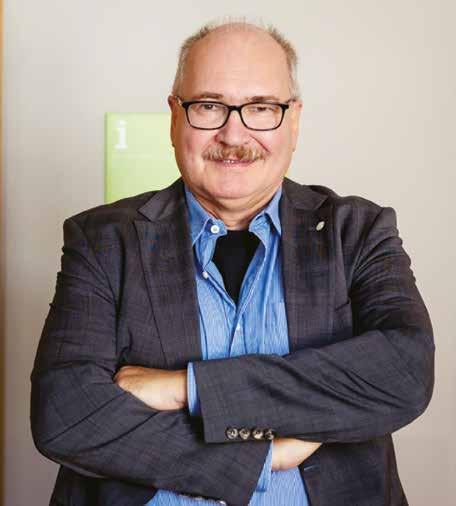
— We always try to offer a mix of programmes. Some topics perhaps appeal more to younger people – to name a few: “Playing Narratives”, an education project via gaming; the upcoming Belgrade concert of the German band “Ok.Danke. Tschüss”, intended for schoolkids; or our monthly “reduce-reuse-recycle” sustainability activities at the institute, with a repair workshop to be added. We plan to revitalise artists’ collectives from the former Yugoslavia in the countryside, which might be a good example for a project that calls for a somewhat more experienced audience. I assume, and notice, that the regular art exhibitions and literary readings at our library in particular are interesting regardless of age and they apparently attract all kinds of people passing by our window on Knez Mihailova Street.
Given the growing popularity of the German language in Serbia, how often do you engage in casual conversations in German with Serbian citizens?
— Unfortunately, as I arrived in Belgrade only recently, I so far haven’t made many Serbian acquaintances that aren’t related to my job; I’m working on it. However, I did notice that whenever I try to make use of my still very rudimentary Serbian in shops or at a bus stop, people often recognise me as German and tend to answer in German – which makes it easier on the one side, but certainly doesn’t help my efforts to learn Serbian…
Which of the German courses offered by the Goethe-Institut are in high demand in Serbia?
— It goes without saying that all our German courses are great and can be recommended. Not only because they are offered in an authentic German atmosphere, and
with a good deal of German culture into the bargain, but also because we highly value, and therefore invest in, the quality of our teachers, and we systematically align the courses with our own internationally recognised German exams, i.e., by awarding “Goethe certificates” at all language proficiency levels. As we can offer the complete set of language learning options, everybody should be able to find the best approach for them. Some prefer a face-to-face classroom experience – be it superfast, in our super-intensives, or in the slower pace of our semester courses –while others appreciate the time flexibility of digital (or at least blended) learning in the comfort of their own home. Demand for German courses online has been on the rise constantly since their efficiency was proved by the pandemic. This is especially true for our tailored company courses. An additional bonus is that digital courses for students are now being offered with a discount of 50% off the regular price!
30 GERMANY 2023
The reach of our programmes extends beyond the Serbian capital, as we support activities in rural areas (e.g. ARLEMM festival) or between countries, for instance in the theatre project “New Stages South East”
Long-term Collaborative Partnerships
Since its inception, aid organisation Help has provided assistance where most needed, and has done so exclusively on the basis of real needs. Its development efforts also include capacity building for local partners, such as civil society organisations and local governments, with which Help builds long-term collaborative partnerships
Our strategic plans include regionalisation and localisation in order to better address needs. We thus established a Help-Hilfe zur Selbsthilfe regional office for Southeast and Eastern Europe located in Belgrade, Serbia, in early 2023, – explains Help regional representative Julia Brückner, before announcing some other plans and further projects.
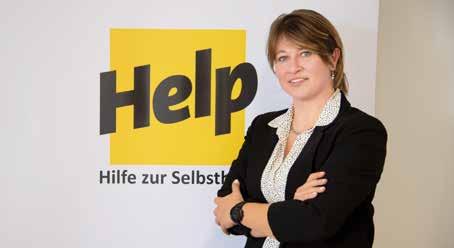
What is currently in your focus?
— The main projects implemented by Help in Serbia have gradually expanded from humanitarian relief towards socioeconomic development, in line with the Sustainable Development Goals. Our development efforts also include capacity building for local partners, such as civil society organisations and local governments, with which we build long-term collaborative partnerships. Our portfolio in Serbia consists of over 8,000 small and medium-sized enterprises generating income, 30 cooperatives (approximately 1,000 people), over 2,000 housing solutions (housing 10,000 people) and 50 small-scale projects that are improving the lives of local communities.
What are Help’s key initiatives and projects in Serbia, and how do they contribute to improving the lives of the individuals for whom they are intended, but also local communities and society as a whole?
— The key projects in Serbia, but also across the region generally, aim to improve living conditions and support the social inclusion of marginalised groups, including youth, women, disabled, (former) prisoners and minorities. Our goal is to improve their living conditions. The programme relies on regional cooperation and exchanges of knowledge to facilitate sustainable development growth.
It involves maintaining existing partnerships and building new ones, while engaging local communities in innovative and sustainable activities to promote inclusion, economic empowerment, and green growth that balances prosperity with environmental wellbeing, ensuring no one is left behind.
What are your strategic goals and plans for Serbia? How do you view the role of Help in the country’s socioeconomic development, in strengthening its stability and its ties with Germany, while advancing its approach to the EU?
— Apart from violent conflicts, the consequences of climate change are also contributing to the global increase in humanitarian needs. In order to respond to the fast changes taking place in the country and the region, our strategic plans include
regionalisation and localisation to better address needs. We thus established a regional office for Southeast and Eastern Europe, located in Belgrade, Serbia, in early 2023. This office, which has the capacity to mobilise, package and channel expertise from within the organisation and its implementing partners across the region, serves as a lead for the strategic programming of country-specific and regional portfolios, alongside quality control mechanisms.
In your cooperation with 85 towns and municipalities across Serbia, how much does it mean to you to have the support of partners and donors like the German Federal Foreign Office, the Federal Ministry of Economic Cooperation and Development, GIZ etc.?
— In our efforts to strengthen stability in Serbia and the region, and advance its approach to the EU, we are always grateful to our existing donors, particularly the German-related diplomatic and corporate communities. We also look forward to diversifying and establishing cooperative partnerships to expand our support to more people in need in Serbia and around the region.
cordmagazine.com 31
GERMAN NGO | JULIA BRÜCKNER REGIONAL REPRESENTATIVE OF HELP-HILFE ZUR SELBSTHILFE
Our key projects aim to improve living conditions and support the social inclusion of marginalised groups
A Leader Remains a Leader
Company Ekotehnika Viljuškari has spent more than a quarter of a century dealing with the repair and sale of forklifts. It operates across the territory of Serbia with around 1.500 clients, while it also enjoys excellent cooperation with numerous foreign companies
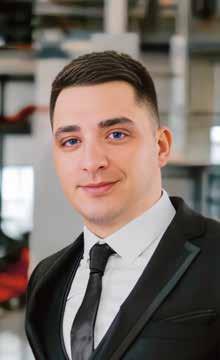
The forklift market is developing continuously, which is why this company is dedicated to keeping pace with the latest technologies and industry trends. Moreover, as Miloš Milovanović emphasises, the company invests a lot in staff training to ensure that it remains always a step ahead of the competition in providing the best services.
It seems unbelievable, but it’s true that your teams of mobile service technicians, and your service centres in Žabalj and Vrčin, cover the entire territory of Serbia. How do you succeed?
— Our company was established in 1997 and over the course of many years of operations we’ve amassed vast experience of working with Linde forklifts. We’ve been committed since the company’s inception to providing the highest level of quality in everything we do, which is why the quality of our services, products and customer support also represents our core value.
Our service teams possess excellent technical knowhow and rich experience of working with Linde forklifts, which enables us to resolve issues and carry out repairs effectively and efficiently. We strive to understand the specific needs of each client and to provide them with solutions that correspond best with their needs.
Thanks to our service centres in Žabalj and Vrčin, we are able to quickly and efficiently reach key industrial zones in Serbia, to intervene effectively nationwide and to ensure that our clients become operational again as quickly as possible.
Is the year 2000 considered as being a turning point in your operations?
— It was in 2000 that we started developing services to support our customers. The opening of the service centre in Žabalj enabled us to provide clients operating on the territory of Vojvodina with faster and more efficient support. This led to us this year establishing cooperation with the KION Group. We became the exclusive representatives of
Linde forklifts in Serbia and expanded our service to encompass the area of Belgrade, thus enabling us to cover the entire market. This collaboration has had a profound impact on our company, given that we’ve gained access to the high-quality products and resources provided under the Linde brand.
What does your partnership with Germany’s KION Group - Linde Material Handling say about your company?
— The KION Group – Linde MH is known for being demanding in the selection of partners, which only serves to emphasise our ability to satisfy its high standards and expectations, as well as confirming our great reputation and renown. Our collaboration with this global leader in intralogistics and owner of the prestigious Linde Material Handling brand testifies to our committed approach to business and the expertise that we bring to the market. This collaboration is confirmation of the high quality of our services and the products we offer.
This has all led to our plan to expand our market – both geographically and through the introduction of new products and services that will satisfy our clients’ growing needs. As we are well aware of the ever-increasing importance of sustainability, environmental responsibility will be a key component of our strategy in the years ahead. We plan to reduce our environmental impact and promote sustainable practices across all aspects of our business.
Developing the expertise of our employees remains a priority, as a way of ensuring that we have highly qualified teams able to respond to clients’ complex challenges and demands. We plan to remain a leader in the forklift industry and to provide a high-quality service to our customers over the years ahead.
32 GERMANY 2023 32
BUSINESS | MILOŠ MILOVANOVIĆ MANAGING DIRECTOR, EKOTEHNIKA VILJUŠKARI
We plan to reduce our environmental impact and promote sustainable practices across all aspects of our business
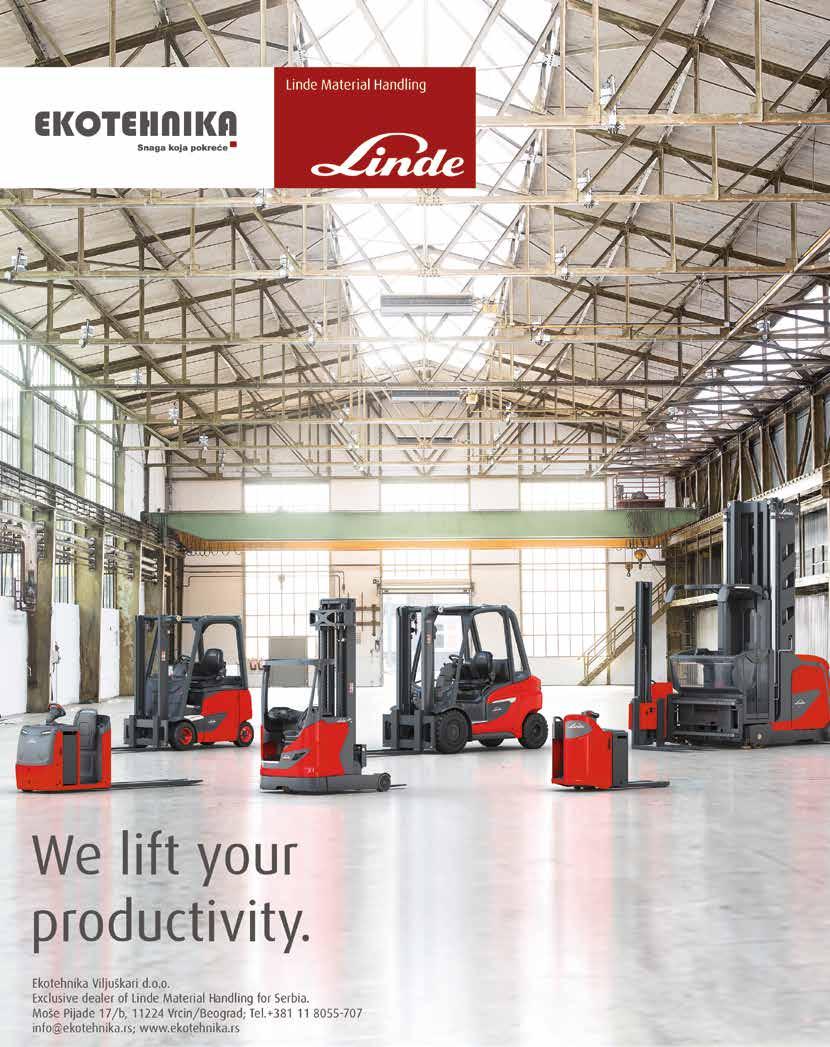
No Compromise on Quality
Vekol DMC, a pioneer of the business travel and events industry in Serbia, has maintained a market presence for almost a quarter of a century and has spent the past 20 years also cooperating with German companies, including some of the corporate world’s biggest names
good enough for them, I don’t agree to compromise. I am more likely not to do an event than to accept to provide a service that’s below our standards.
Our interlocutor, who has even managed to gain the trust of the renowned Deutsche Telekom, explains that we can only entice foreign guests with quality and that we can only become a leader and a highly sought-after destination with the maximum commitment of all of us.
How would you describe the infancy of your agency, which is today a leader of the business travel and events industry in Serbia?
— When I launched the agency 25 years ago, the idea that guided me was to ensure that I w ould always provide the highest level of service, regardless of the circumstances, and present Serbia to my guests as an outstanding destination. My cooperation with German companies has endured for almost 20 years, from the moment Vekol profiled itself as a destination management company. Our German partners sought high quality and precision from us, and provided us with security and respected their contractual obligations. German clients are indeed demanding, but they’re simultaneously very easy to work with, due to their precision in their requirements.
You have an impressive portfolio with hundreds of clients, including Deutsche Telekom, Bayern Munich, STADA... How did you gain their trust?
— Bringing Deutsche Telekom here in 2011 was the most difficult job. Serbia still didn’t have developed tourism infrastructure back then, the DMC [Destination Management Company] cate-

gory of agency wasn’t even recognised on the market. On the flip side, we have Deutsche Telekom, with thousands of high-quality events under its belt and accustomed to the highest standards. We gained their trust, and later the trust of other agencies, through our determination and professionalism. I’ve never allowed us to offer anything of lower quality, even if a client seeks that or thinks, on the basis of comments online, that some space is better. In the case that I think a solution being sought by a client, on the basis of pictures or comments, is not
What will we receive with the construction of EXPO facilities, the new Fair, new hotels and infrastructure?
— Business tourism has incredible potential and brings much higher revenue than classic tourism. Business tourism also brings new opportunities for investment and new companies. The indirect impact of a well-organised event is unbelievable, because every foreign company seeks the possibility of investing in Serbia after experiencing a well-organised event. On the other hand, one poorly organised event can ruin all the state’s efforts to entice investors, because it is through the prism of the event that they see the culture and mentality of the people, the service, the milieu. They get acquainted with Serbia through the event, and if it is poorly organised, they don’t come back.
The EXPO and new tourism capacities will certainly help, but we must simultaneously work to promote the destination much more and better. Serbia still isn’t a destination that’s an easy sale to business tourists. At trade fairs one can still hear people ask ’please tell me something about the destination, I know nothing’. The advantages that we have over the neighbourhood – with our hotel infrastructure, airlines, level of service and hospitality – is always cancelled out by poor destination marketing. And, of course, the entire chain of businesspeople who participate in the creation of a tourist product – from agencies, airport staff and civil servants, to restaurant waiters and hotel receptionists – must understand that it is only with quality that we can entice foreign guests.
34 GERMANY 2023
BUSINESS | TANJA BOGDANOV MANAGING PARTNER AND FOUNDER OF VEKOL DMC DESTINATION MANAGEMENT COMPANY DMC
Every foreign company seeks the possibility of investing in Serbia after experiencing a well-organised event
Europe is Conquered With Quality
Company 8. mart (8th March), which has existed for almost an entire century, has always aspired to develop and grow. With the introduction of new technologies, constantly raising the effectiveness and efficiency of its work has made it a durable company and a market leader
Apart from Germany, as its principal market, 8. mart has expanded its customer base to include respected business partners from France that are also among the leaders on the European market and should provide a strong impetus to the company’s further growth and development, while in the period ahead space will also be created to cooperate with partners from the UK.


You head a company that has existed for almost an entire century and is known for having one of the largest and most modern textile factories. How did you become an industry leader?
— As you note yourself – the company has existed for almost a century. And in order to succeed and persevere on the very demanding textile market, facing very strong competition, both domestically and at the European level, the company – together with all its employees –has gone through every transition process, adapting ourselves to the demands of the market, and thereby also to the demands of customers, whose expectations and sensibilities have also changed throughout all these years, while maintaining a focus on the segment in which we are the best and nurturing our own values.
We have always endeavoured to develop and grow, by introducing new technologies and constantly raising the efficiency and effectiveness of our work, which has
made us a durable company and a market leader. And our success is even greater if we consider how developed the textile industry of the former Yugoslavia was and how just a few of us are left and continuing to compete successfully on the demanding European markets.
I must also emphasise that the greatest contribution was provided by our employees, because we have always, and particularly today, been blessed with very committed and loyal employees, who have decades of experience at the company and are extremely well-acquainted with the textile industry, machines and materials, and who therefore provide the right foundations for the company’s further growth and development.
Your top quality has secured your presence in all major retail chains across Europe, and then in 2017 you integrated into the group of German holding companies. Has that strengthened your position on the European market?
— We are a 100% exporter, with all our goods exported to EU markets, so that
integration has definitely strengthened our position, primarily on the German market, where we have been cooperating very successfully with large retail chains for many years. Within the scope of the Holding company, there are companies that work to bring new customers and expand the portfolio with existing customers, while we – as a manufacturing company – can focus on product development being aligned with the highest quality requirements and customer expectations.
How important is it to analyse the market; and to follow trends, but also dictate them?
— The answer to the question of dictating trends is neither simple nor easy, and very often eludes even the boldest of companies, regardless of the branch of industry in question. However, we really devote a lot of attention to gauging the demands of the market, to the sensibilities of our customers, very meticulously monitoring previous trends in order to recognise some future demands. We propose innovative ways of overcoming certain challenges that we face, but also welcome suggestions when it comes to the use of new materials, which increasingly direct us towards recycled materials and ecologically sustainable product niches. By investing in new knitting machines, we are in a position to satisfy all customer demands, and each year we introduce new machines for testing, with which we strive to increase our efficiency and expand the portfolio of products that we can offer the market. Innovating, implementing new knowledge and investing in people are the keys to success.
cordmagazine.com 35
BUSINESS | DARKO BJELIĆ EMBA, CEO, 8. MART
We Construct, Create and Connect
The plant in Kruševac is the first development project in Serbia for a company that has vast experience in the production of wiring systems for the automotive industry
Serbia represents a key market for the further development and expansion of our business. We are currently conducting analyses and preparing for the extension of the factory, which should be implemented next year. That will bring us an additional 500 jobs, new technology and new knowhow, – explain the Kromberg & Schubert team.
Since arriving in Kruševac, Kromberg & Schubert has been dedicated to growing its production of wiring systems for the automotive industry, but also to increasing its number of employees. Are you satisfied with the implementation of plans?
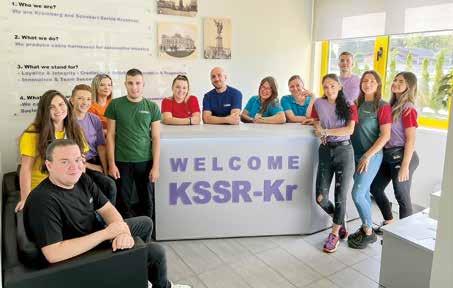
— We are extremely satisfied with the realisation of our plans. Our commitment to the goal has been key to us achieving results, but our “path” didn’t go in a straight line through all these years. We have learned and changed in order to become what we are today as a team and an organisation. We have changed a lot as a collective, having last year gone through a complete “rebranding” process, learning many lessons, exceeding our own limits, taking on many challenges... This all helped make us a stronger and more unified team. That’s why we today have 2,000 colleagues, two projects that we’re working on, in Porsche and Skoda, and we’re ready to continue growing and developing to become even better: as an employer, as craftsmen (wiring systems manufacturer) and as a better example for the community.
We believe that we’re on track and that we’ve already achieved significant success in realising our plans. However, we are al-
ways open to improvement and new ideas. We will continue dedicating ourselves to the growth and development of the company, with the support of our team and the community in which we operate.
In which direction will your company develop in Serbia?
— Our company already has a regional impact; we function as one team in three locations: Kruševac, Skopje and Bitola, under the leadership of commercial director Tanya Miliskovik and technical director Uwe Schillig. That’s a total of 10,000 people who are part of a single community. That also means that we always have someone to call on for help or someone to provide help, and that all serves to bring people together, to forge new friendships, affections, connections, which is a reward in and of itself.
How has the crisis caused by the pandemic and the war in Ukraine impacted the automotive industry and your operations?
— The crisis caused by the Covid-19 pandemic and the war in Ukraine has had a

significant impact on the automotive industry globally. Supply chain difficulties, reduced demand for vehicles and a general economic slowdown have led to falling production and turnover. Market uncertainties and fluctuations have also compelled us to adjust our business strategies.
All these crises have also brought new opportunities. Due to the situation in Ukraine, our headquarters requires additional production space, because it has new projects. Following the positive transformation that we had last year, we’ve now been entrusted, as a team, with that extension of space being built right here in Kruševac. In a world fraught with destruction, demolition and division at the global level, we are happy and grateful to have the opportunity to once again construct, create and connect. Our motto is: “Our people are our strongest side”. We will gain new colleagues and will promote those who’ve worked hard and contributed; we will learn a lot of new things, become humbler and more mature as individuals and as a team. We have plenty of all that waiting for us, and this all makes life more beautiful, richer and better.
36 GERMANY 2023
BUSINESS | TEAM KROMBERG & SCHUBERT SRBIJA D.O.O. KRUŠEVAC
A Full 34 Years at the Top
GP Gradjevinar, one of the first privately-owned construction companies in Serbia, has managed to survive despite sanctions, isolation, crises and competition, because its team believed in strict respect for deadlines, world standards and the individual needs of clients

We’ve been led from the outset by the fact that clients and colleagues always recognise quality and professionalism, which is why those elements have always been present in every aspect of our business. That’s how it’s been for the past 34 years and how we will continue to work, – announces Nemanja Ćirić, business development manager at this famous construction company.
Gradjevinar was founded during one of the most difficult periods for our country. Does this make your unprecedented success even greater?
— Our company was founded in 1989, as one of the country’s first private construction companies. As you note, that was one of the most difficult periods for our country, and thus the initial development of the company was hampered even more. We’ve been led from the outset by the fact that clients and colleagues always recognise quality and professionalism, which is why those elements have always been present in every aspect of our business. That’s sometimes also surprising in our country, but we believe that such an approach – even after 34 years of successful operations and projects – is the only right way to build a serious company and brand.
You are known for respecting deadlines, applying the world’s highest standards and utilising cutting-edge technologies in construction. Is this how quality is preserved while simultaneously gaining an excellent reputation over decades?
— Precisely! All these factors form part of our aforementioned approach to work. In the construction industry, at least as we view it, quality isn’t only
reflected in well-executed works, but also in understanding the overall needs of clients and associates, and in incorporating them into the implementation of projects. Apart from strict respect for deadlines, this also implies constructing the most modern facilities in accordance with world standards and the individual needs of our clients. We always take a long-term view of our cooperation with clients, and we therefore don’t only construct buildings, but also partnerships that last for many years.
Does your cooperation with German companies and organisations, which often have standards that are even more stringent than those of Europe, require constant staff education and training?
— We often collaborate with both German and international companies and organisations, and their demands really are stringent, especially when you consider our significant participation in the implementation of a series of projects in the pharmaceutical industry. The very fact that our projects are extremely demanding, and that we are committed to providing top quality, ensures the need for constant education and training for all of us, as well as the development and application of the latest technical and technological solutions. Likewise, it is also evident that the aspects of green building are increasingly present and necessary in Serbia. That’s why our approach to project implementation –from initial design to final execution –includes the applying of solutions that adhere to the Green Agenda and provide long-term benefits to our clients, and that will not become outdated in just a few years.
cordmagazine.com 37
BUSINESS | NEMANJA ĆIRIĆ BUSINESS DEVELOPMENT MANAGER AT GP GRADJEVINAR
Our approach to project implementation – from initial design to final execution – includes the applying of solutions that adhere to the Green Agenda
Sustainable Mobility Experts
Yunex Traffic, as a global leader in intelligent transport systems (ITS), offers the broadest portfolio of solutions for adaptive traffic control and management systems, highway and tunnel automation, and intelligent solutions for V2X and road toll collection systems

The innovative mobility ecosystems and services for smart cities that are developed by Yunex Traffic make traffic mobility safer, more efficient and more sustainable, with forward-looking infrastructure and transport solutions.
Yunex Traffic d.o.o. Belgrade was founded and developed under the scope of the capacities of company Siemens, characterised by the leading experience on the market and many years of experience with infrastructure projects, while it now operates independently as a leading innovator on the market. The company is currently implementing a contract with the Belgrade Secretariat for Transport to modernise around 400 traffic light intersections in the city of Belgrade that are included in the adaptive traffic control system.
Apart from improving travel times and increasing the capacity to handle traffic flows, an additional priority was secured for the public tram transportation system, reducing electricity consumption by 80%, and we also shouldn’t overlook the fact that, when it comes to pedestrian and cycling flows, significant advances have been achieved in terms of the safety of road users. This project is now in its final phase, and the Secretariat for Transport, which is tasked with managing and supervising the project, now has the ability to determine and update the parameters of the work of traffic lights and adapt them to real traffic loads, thereby contributing significantly to improving the city’s traffic situation.
Belgrade doesn’t lag behind the world
The City of Belgrade can today be proud that it has modern traffic lights and adaptive solutions like those of London,

Berlin, Vienna, Thessaloniki etc., which can be integrated into existing and future transport systems, such as the Belgrade Bypass ring road, highway network, public city transport or parking systems. An additional advantage of this kind of system is the fact that it can be adapted to sensitive groups, like the blind and visually impaired, or that it can completely transform public city transport or micro-mobility, depending on the development plan and strategy of the City of Belgrade.
The project’s next phase encompasses the modernisation of intersections in New Belgrade and their integration into the system, as well as giving priority to the number 16 bus line. Following implementation, we expect to reduce the travel time in a single direction by up to 20%, which will have a significant impact on improving the popularity of city transport services.
Precious global knowledge and experience
This is just one of the examples developed successfully by Yunex Traffic recently, in implementing its mission and vision of sustainable mobility: to make traffic greener and safer, and cities more liveable. We proudly note that, with the support of engineers from Germany, the Yunex Traffic team in Serbia, which comprises 50% women, uses state-ofthe-art equipment and next-generation software, and that it applies knowhow in the field of programming intelligent transport systems (ITS) and the smart city concept. We utilise global knowledge and experience in designing and creating platforms with modern and verified technologies in order to advance city transport infrastructure and overcome the challenges we currently face, while respecting valid IT and EU standards.
38 GERMANY 2023
BUSINESS | YUNEX TRAFFIC
The City of Belgrade can today be proud that it has modern traffic lights and adaptive solutions like those of London, Berlin, Vienna, Thessaloniki etc.
Combining Tradition and Innovation
Hoberg & Driesch, as one of Europe’s leading wholesalers of steel tubes, has always opted for quality throughout its 75-year history. And that was also
last year, when it established a new company with storage facilities
build-up their business here, so it is the right time and place.
According to Nenad Đorđević, H&D’s MD for Southeast Europe, this company has succeeded in creating very close and lasting relationships with its traditional customers, and is now starting to do the same in this region. The company now plans to improve its steel tubes processing capacities in the second phase of investment, especially in the automotive sector.
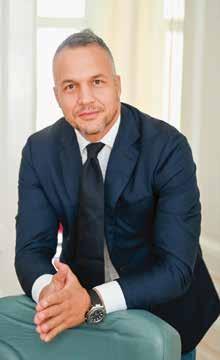
Hoberg & Driesch, which has existed for 75 years, has always prioritised the quality of its products and services, as well as customer satisfaction. Is that how you’ve become one of Europe’s leading wholesalers of steel tubes?
— That’s right, Hoberg & Driesch has always opted for quality throughout its entire history. Furthermore, as one of our core promises, we ensure delivery capability for a wide range of our products, and with it our customers’ own delivery and production commitments. This has provided the basis for us to create very close and long-lasting customer relationships, which we are now also starting to do in Southeast Europe.
How did Hoberg & Driesch end up launching operations in Serbia? Has it turned out that our country is a good place for German companies to do business?
— As part of our internationalisation strategy, we were seeking favourable lo-
cations in Southeast Europe. Given that Serbia is at the heart of the region’s metal processing industry, we considered it the right place to be located in the wider area. As a matter of fact, more companies have decided to come to Serbia to
Your company plans to improve its steel tubes processing capacities in the second phase of its investment, especially in the automotive sector. Do you find the current circumstances and economic environment favourable?
– The current overall economic environment is, of course, challenging, and the automotive sector is no exception. However, with the support of Hoberg & Driesch Processing, and by bringing into play its experience and reputation in the automotive sector, we are confident of developing a sustainable, enduring business locally. Furthermore, Serbia is already attracting more companies, thus providing more business opportunities for steel tubes processing in the near future.
You are operating as Hoberg & Driesch Southeast Europe, a new company that will distribute the famous H&D portfolio of steel tubes? Do you expect this new subsidiary to fortify your presence in Southeast Europe?
— Hoberg & Driesch currently has foreign branches in nine countries. All these branches strengthen our market presence in a natural way and enable close proximity to, and service for, our customers that would otherwise not be possible. Furthermore, local branches can respond in a special way to the specific local requirements and needs, thus providing an important contribution to achieving joint success with our customers. Hoberg & Driesch Southeast Europe will therefore certainly fortify and expand our presence with our products and services in the region.
cordmagazine.com 39
the case
BUSINESS | NENAD ĐORĐEVIĆ MANAGING DIRECTOR, HOBERG & DRIESCH SOUTHEAST EUROPE SOUTH EAST EUROPE SOUTH EAST EUROPE
Serbia is already attracting more companies, thus providing more business opportunities for steel tubes processing in the near future
Creating a Taste of Home
Dr.
For this CorD Magazine special edition, we discuss the habits and desires of customers, product range expansion, new products, environmental responsibility and the improvement of the company’s organisational culture with its MD, Sanjin Laganin, who has been with the company for more than a decade and at its helm for a year and a half, making him the perfect Dr. Oetker interlocutor.
Despite your products being closely associated with the warmth of home and traditional family values, you don’t overlook the needs of modern consumers. How did your “ready to eat” and “ready to prepare” product lines emerge?
— Customers are always in the focus of the operations of Dr. Oetker. We monitor the habits and expectations of consumers who have placed their trust in us for years and who recognise the high quality of Dr. Oetker products, thanks to which we know that there is ever more demand for products that are prepared quickly and easily. That’s why I’m proud to point out that we conceived our latest innovation, “Quick and Easy Polenta”, locally, from start to finish. This delicious meal, created without chemical processes or additives, takes just one minute to prepare, without cooking!
We also created Vitalis cereal bars. These tasty bars contain wholegrain cereals, which makes them an excellent source of fibre and a great source of energy.
We are actively working on the development of new products at our develop-
ment centre, so you can expect more new arrivals from the Dr. Oetker kitchen soon.
In the competition for profits and conquering new markets, we often forget that which is most important: people and nature. However, that is not the case with your company. Are you aware of your special responsibility?
— As a socially responsible and environmentally aware company, Dr. Oetker manages all of its processes in a way that ad-
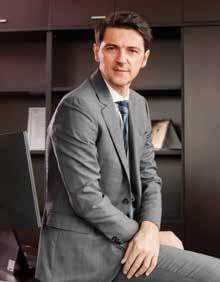

vances environmental protection. We are conscious of the special responsibility that we have towards people and nature. That’s why we launched the Sustainability Charter globally in 2020, which includes a total of 27 projects that are being implemented by our interdisciplinary, domestic and international teams. The goals are grouped into three segments: the food we produce; the world around us; and our company. That’s because we want to achieve climate neutrality, use fully recyclable packaging and switch to renewable energy sources. We will invest significant resources in improving the nutritional profiles of our products by reducing salt, sugar and fat content by up to 20%, while we also have the goal of reducing the amount of food waste by 25% by the end of 2025.
What are your priority plans for the years ahead?
— Advancing our organisational culture is one of the primary goals. We launched this process last year and will work on it continuously. For us, organisational culture equates the importance of what we do with the way we do it. It is essential for such an approach to doing business to change ourselves as individuals, to improve our leadership and communication skills. The transparency of the process, the inclusion of all stakeholders in the decision-making process, as well as meritocracy, serve to create a healthy working environment. These changes result in innovative products, good relations with customers and suppliers, and satisfied consumers.
Digitalisation is the next goal, and it implies the utilising of existing infrastructure and the improving of all processes in order for us to make the best possible decisions on the basis of the data we collect and the reports we compile.
40 GERMANY 2023
BUSINESS | SANJIN LAGANIN MANAGING DIRECTOR, DR. OETKER D.O.O.
Oetker is a company that has been nurturing tradition, family values and the warmth of home cooking for more than 130 years, while at the same time monitoring and serving the needs of the modern consumer. In its product creation process, this company has an unwavering commitment to do everything to satisfy the needs of consumers
For us, organisational culture equates the importance of what we do with the way we do it. It is essential for such an approach to doing business to improve our leadership and communication skills

Additional Salary Instalment for Staff
Company dm drogerie markt, which will commemorate 20 years of successful operations in Serbia next year, is continuing to set new standards on the labour market, with its relations towards customers and employees, and in terms of business as a whole
We want to thank every employee for their contribution to the development and advancement of the company on the Serbian market. They are responsible for the fact that our name is associated with responsible business, credibility, a top service and trust, – explain representatives of this leading drugstore chain.

As the leading drugstore chain operating in the country, dm drogerie markt is preparing to break all records as it enters its jubilee year of doing business in Serbia. To mark this occasion, the company has made a gesture that will be long remembered by providing its employees with the equivalent of as many as 15 monthly salary instalments or jubilee cash awards in 2023, which is a rare benefit in our country’s business community.
Each employee who has been working at dm for 20 years will receive one additional full salary, while all others will receive monetary awards that are proportionate to their length of service at the company, receiving a minimum of 25,000 dinars. Additionally, dm employees will also receive their regular 13th and 14th salary instalments in 2023 – a practice for which this company has been known since the launch of its operations in Serbia.
“With this gesture, we want to thank each employee for their responsible work, but also for their contribution to
the development and advancement of dm on the Serbian market. They deserve the credit for the fact that our company is associated with the epithets of responsible business, credibility, top service and trust. The image of our company, as one of the most beloved brands on the Serbian market, is reflected pre-

cisely in the relations that we nurture towards our employees, customers and the entire community. We hope that we will inspire the broader business milieu to make similar moves that will advance the economic development of the market as a whole, as we together enter the next 20 years of adventure and success,” announced dm drogerie markt Serbia and North Macedonia Director Alexandra Olivera Korichi.
This move forms part of dm’s comprehensive approach to its employees, who won’t only enjoy a record number of salary instalments, but will also continue to have access to numerous benefits, including competitive salaries, employee healthcare provided through free checkups, a “smart working” concept that provides the opportunity to work from home, professional training and education, as well as numerous activities for the children of employees.
42 GERMANY 2023 42
BUSINESS | dm drogerie markt
dm employees will receive their regular 13th and 14th salary instalments in 2023 – a practice for which this company has been known since the launch of its operations in Serbia
A Company Where Families Thrive
Our goal is to build an inclusive environment where everyone can shine, to help improve, prolong and create lives ~ Ina
Bulat.
Merck was the very first company, back in 1958, to bring a fertility product to market, while today it is a global market leader that has helped around five million babies be born. How much does this fact motivate you in your work?
— Merck has always been, and always will be, a family-oriented company. We help improve, prolong and create lives, and, for me, that is the greatest motivation of all.

Embodying our spirit of caring. We support our employees in fulfilling not only their professional aspirations, but also their personal ones. And that’s why we recently introduced to some markets our ‘Fertility Benefit’ programme, which will help our employees and their partners navigate the path to parenthood. And this project is, of course, built upon Merck Group’s longterm position as a true pioneer in fertility treatments.
In the last year alone, Merck has helped more than 94 million patients worldwide. Since you have a leadership role in the SEE region, what does that mean to you?
— Leading a team of hundreds of employees in Southeast Europe, and overperforming in terms of results, makes me feel inspired, confident and proud. It’s a pleasure to represent a wide spectrum of talents and capacities. Interactions with my teams fill me with tremendous energy, motivation, new ideas and fresh perspectives.
Our goal is to build an inclusive environment where everyone can shine; a place where you can feel everyone’s commitment, enthusiasm and passion. These are qualities that we can all honour and appreciate. And I think it is only by harnessing these talents that we can advance innovation and unlock the full power of our region.

cordmagazine.com 43
BUSINESS | INA BULAT MANAGING DIRECTOR, HEAD OF SEE AT MERCK GROUP
Merck Group is a true pioneer in fertility treatments and a global market leader that has helped around five million babies be born
Can Germany’s
Economy
Avoid a China Shock?
The electric-vehicle revolution that propelled Chinese carmakers to global prominence is now threatening to render the German automotive sector obsolete. Unless policymakers act fast, Germany could soon face a painful deindustrialisation process similar to automotive the United States in the early 2000s
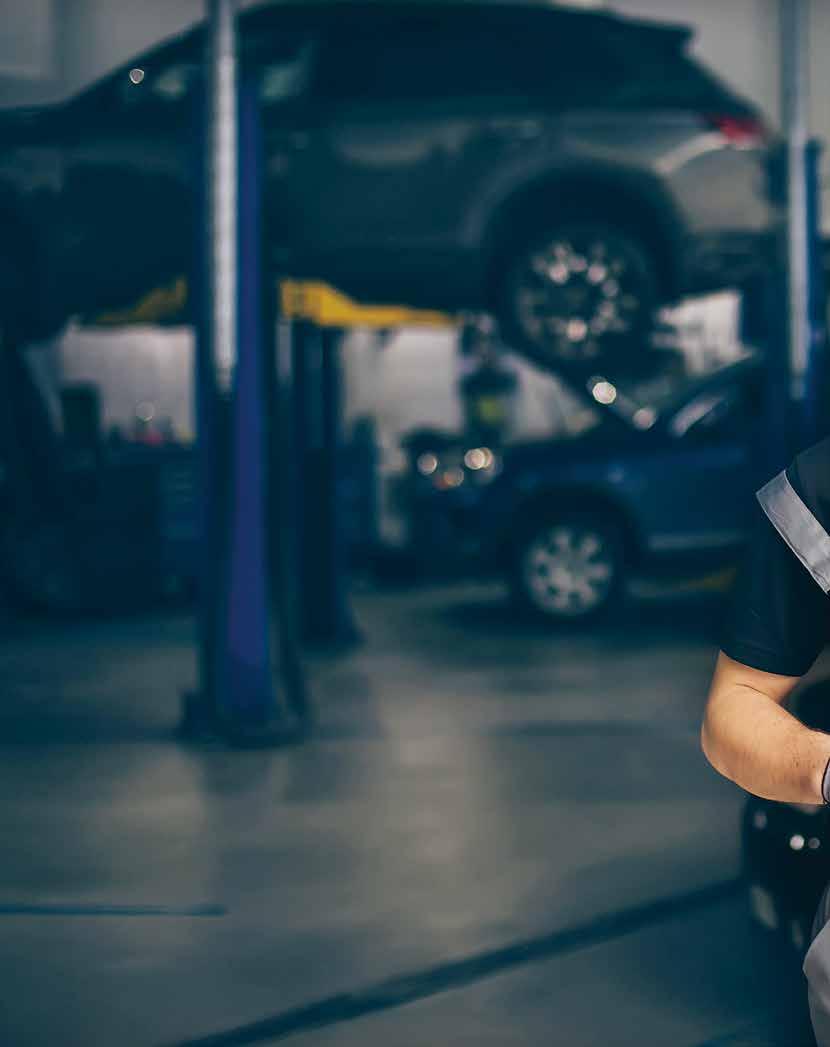
ECONOMY
The German and American auto industry executives attending this year’s Shanghai motor show may have expected to take a victory lap following their three-year pandemic-related absence. Instead, Western manufacturers were met with a harsh reality: dozens of new Chinese-made electric vehicles are coming for their market share.
Over the past few years, the rise of EVs has propelled the Chinese vehicle industry to global prominence. China’s auto exports already overtook Germany’s in 2022, following a 54% increase, and the country is projected to surpass Japan to become the world’s largest car exporter this year.
The shift was evident in Shanghai, where Chinese consumers ignored the offerings from BMW, Volkswagen and Mercedes in favour of new models from Chinese manufacturers BYD and Nio. Compared to the new Chinese cars, with their cutting-edge batteries and sensors, the German-made EVs seemed almost outmoded. For decades, German engineers perfected the internal combustion engine; now, the EV revolution is threatening to render all their technological knowhow obsolete.
Given that the auto sector accounts for 4% of German employment, the country could be facing a “China shock” comparable to the one experienced by the United States and other high-income countries experienced in the early 2000s. Following China’s 2001 entry into the World Trade Organization in, Western manufacturers faced fierce competition from Chinese firms, beginning with low-value-added products such as textiles, furniture and clothing, 2001 but then in more sophisticated industries like computers and electronics.
Between 2000 and 2010, Chinese-made goods’ share of total US imports increased by 25 percentage points, contributing to the deindustrialization of the Rust Belt and transforming America’s economy and politics. Contrary to trade economists' predictions, the contraction of import-competing sectors was not offset by an increase in exports to China. Moreover, displaced workers could not

45
Germany can and must take the lead in creating a European version of the US government’s Defense Advanced Research Projects Agency
easily find new employment, and those who did experienced reduced wages. The decline in manufacturing employment contributed to the increase in “deaths of despair” and set the stage for Donald Trump’s victory in the 2016 US presidential election, as the region most exposed to Chinese import competition underwent a rightward shift.
There are clear signs that Germany is already experiencing its own version of the China shock. Until last year, Germany was a net car exporter. Now, for the first time ever, it is importing more cars from China than it exports. From January to August 2022, Germany imported 1.8 million cars from China, but exported only 1.7 million. (A similar trend is apparent in the machine tools sector, where China’s exports have surpassed Germany’s.)
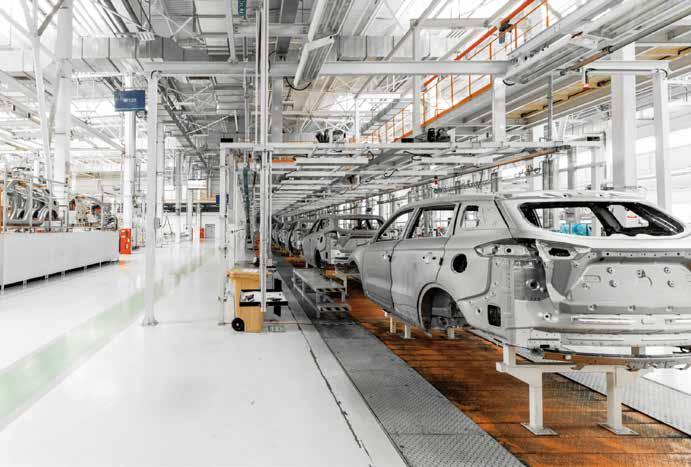
The irony is that China’s rapid industrialisation was facilitated by massive imports of Ger-
man machinery, particularly cars and machine tools, which are crucial to the German economy. Over the past three decades, Germany trained a generation of Chinese workers through joint ventures with Chinese companies. These technology transfers were mandated by China as a prerequisite to accessing its market. But now that China has become an industrial powerhouse in its own right, it has outgrown the need for Germany’s assistance.
China holds two significant advantages over Germany. First, at a time of technological disruption, past experience is irrelevant. China does not need to master the combustion engine to beat Germany in the EV market. Second, China’s size enables it to scale up production, expedite the learning process, and reduce costs swiftly. This is how China became a glob -
46 GERMANY 2023 46
Germany could also emulate China by forming joint ventures between domestic companies and Israeli artificial-intelligence start-ups. That would help Germany bridge the knowledge gap in AI technology
From January to August 2022, Germany imported 1.8 million cars from China, but exported only 1.7 million
al leader in lithium-ion batteries – and why it is now on the cusp of developing sodium-powered batteries.

In the past, several factors helped Germany avoid a China shock. Initially, Chinese imports competed with goods that Germany previously imported from low-wage countries like Turkey and Greece, resulting in job losses in those countries rather than in Germany. Similarly, the expansion of production networks to ex-communist Central and Eastern Europe enabled German firms to boost productivity and reduce costs. For years, Germany benefited from China’s economic boom, as Chinese demand for high-quality German cars and machinery soared.
But as China continues to expand its economic influence, Germany may no longer be able to avoid the negative impact that other countries have experienced. While the reconstruction of Ukraine could give the German economy a boost similar to the one it experienced following the fall of the Iron Curtain in 1989, the war there
must first end, which seems unlikely in the foreseeable future.
German policymakers could take several steps to avoid repeating America’s painful deindustrialisation process. They could seek to attract foreign direct investment from Chinese battery firms and Asian semiconductor manufacturers. Germany could also emulate China by forming joint ventures between domestic companies and Israeli artificial-intelligence start-ups. That would help Germany bridge the knowledge gap in AI technology, which will be crucial for autonomous cars, and enable German engineers to acquire the necessary skills to remain globally competitive.
Finally, Germany can and must take the lead in creating a European version of the US government’s Defense Advanced Research Projects Agency. By reverse engineering the Chinese approach to industrial policy and the US approach to innovation, Germany could boost economic dynamism at home and elsewhere in Europe, avoid the negative consequences of a China shock, and prepare its economy for the challenges of the 21st century.
By Dalia Marin, Professor of International Economics at the School of Management of the Technical University of Munich, is a research fellow at the Centre for Economic Policy Research and a non-resident fellow at Bruegel
cordmagazine.com 47
Given that the auto sector accounts for 4% of German employment, the country could be facing a “China shock” comparable to the one experienced by the United States and other high-income countries in the early 2000s
China’s auto exports already overtook Germany’s in 2022, following a 54% increase
Remembering Historical and Cultural Ties
This past spring, on 27 April, Serbian Ambassador to Germany Dr Snežana Janković opened an event at the famous Martin Luther University in HalleWittenberg, which is over 500 years old, with which the Serbian Embassy in Berlin commemorated two extremely significant anniversaries in the two countries bilateral relations: 240 years since the visit to this university of educator Dositej Obradović, Serbia’s first minister of education, and 200 years since the arrival in Germany of Serbian language reformer Vuk Stefanović Karadžić
This occasion was marked by the opening of an exhibition entitled ‘Vuk Stefanović Karadžić - Travels around Middle Germany’, which was created in cooperation between Martin Luther University Halle-Wittenberg (MLU), the Serbian Embassy in Berlin, Vuk’s Endowment and the Museum of Vuk and Dositej, and which ran until 9 July. The event also saw the MLU ceremonially presented with a bust of Dositej Obradović, representing a gift from the Serbian Academy of Sciences and Arts, which was presented on behalf of SANU by its vice president, academic Miodrag Marković. At the suggestion of the Serbian Embassy, the MLU entered the name of Dositej Obradović in the University’s permanent exhibition, thereby ranking him among the most important alumni since the founded on this renowned university.
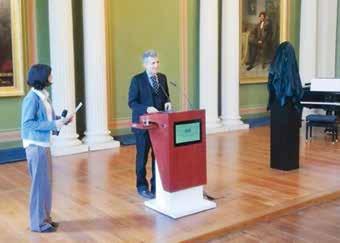
Addressing those gathered, Ambassador Janković emphasised that Serbs are still inspired today, two centuries on, by the visits of Dositej and Vuk to Germany, as well as by their collaborations with famous Germans like Goethe, Schiller, the Brothers Grimm, Ranke, Herder and others. She added that these historical visits also encourage us to work with even greater energy and enthusiasm to bring our peoples closer together and to strengthen cultural and educational cooperation between Serbia and Germany. Highlighting the central importance of Vuk and Dositej to Serbian culture and history as a whole, but also to the affirming of Serbian and South Slavic literature across Europe and around the world, Ambassador Janković pointed out that these two figures connect us over the course of centuries and remind us that our bilateral relations with Germany, which have often been confronted by difficult challenges throughout history, also contain such a wealth of contacts, mutual understanding a great desire to better mutually acquaint the two peoples and cultures.
Those gathered to celebrate these two iconic figures of Serbian literature and education in
48 GERMANY 2023
CULTURAL RELATIONS
Photos Credit: Serbian Embassy in Germany
Germany were addressed by MLU Rector Claudia Becker Ph.D., as well as by the authors of the exhibition: Slavic Studies Professor Katrin Schlund and University Archives director Professor Dirk Schaal. They stressed that this university has always been a gathering place for students from various countries, and that it is an honour for them that the MLU can also be proud of the fact that such important figures of Serbian culture have stayed there.
The exhibition featured a collection of Vuk’s personal items, manuscripts, letters and books, providing intimate insight into his life. Visitors explored the evolution of his ideas and his tireless efforts to promote Serbian culture and language. The artefacts on show served as a bridge between two rich cultural traditions, demonstrating the profound impact of cross-cultural exchange. Providing special value to this exhibition was the fact that it included archival documents, photographs, records and other exhibited artefacts that were made available by numerous German scientific and cultural institutions from the cities of Jena, Leipzig, Kassel, Weimar, Göttingen and elsewhere.
Among many visitors, this exceptional event was attended by officials of the City of Halle, professors and students of Slavic studies at the MLU, representatives of the broader academic and scientific community, representatives of cultural and educational institutions from Halle, as well as representatives of the Serbian diaspora from this city and the states of Saxony Anhalt and Saxony.


cordmagazine.com 49
Ambassador Janković pointed out that these two figures connect us over the course of centuries and remind us that our bilateral relations with Germany, which have often been confronted by difficult challenges throughout history, also contain a great wealth of contacts, mutual understanding and a desire to better mutually acquaint the two peoples and cultures
The Western Balkans in 2030 and Beyond
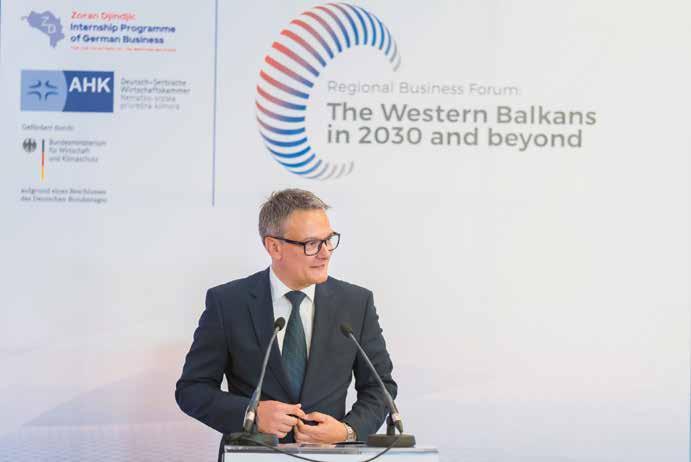
The most important achievement in Serbia by the year 2030 should be the establishment of a functional and competitive market economy, as a stable framework for the operations of domestic and international companies ~ Milan Grujić, President of the German-Serbian Chamber of Commerce
TThe German-Serbian Chamber of Commerce (AHK Serbia), in collaboration with the German Eastern Business Association, organised the Regional Business Forum “The Western Balkans in 2030 and beyond”. Held in Belgrade on 13th and 14th September 2023, the forum was implemented to commemorate the occasion of the 20th anniversary of the establishing of the Zoran Đinđić In-
ternship Programme of German Business.
The Regional Business Forum invited representatives from business, politics and civil society to participate in a joint time capsule, to take a closer look from the imagined perspective of 2030 at the economies, political perspectives, challenges and latest trends in the field of sustainability in the Western Balkans. In fastpaced, one-hour discussion rounds, dif-
ferent perspectives could be heard from the economic, political and civil society sectors, with a special focus on the topics of regional economic development, brain gain vs. brain drain, and the complexity of the Green Deal and associated essential reforms.
Speaking at the opening of the Regional Business Forum, AHK Serbia President Milan Grujić emphasised: “the most important achievement by
50 GERMANY 2023
BUSINESS | REGIONAL BUSINESS FORUM
the year 2030 should be the establishment of a functional and competitive market economy, as a stable framework for the operations of domestic and international companies. The Berlin Process certainly contributes to opportunities to unlock the economic potential of the region, while the most significant outcomes of this process for us entrepreneurs are the creation and use of a Multi-Annual Action Plan for the regional economic area and the project of establishing a
Common Regional Market. This should be based on the successful implementation of the Action Plan for the Common
Regional Market for the 2021-2024 period, which implies the implementation of various activities in four key areas: trade; investment; digitalisation; and industrial regional space.”
As German Eastern Business Association MD Michael Harms stated: “with today’s conference, which honours the 20th anniversary of our Zoran Đinđić Internship Programme for German Business, we aim to enhance the dialogue between politics, civil society and businesses from the perspective of the year 2030. With the huge potential the region provides, on one hand, and the current global challenges it faces, on the other, we believe that only a common approach among all stakeholders will overcome the current obstacles.”
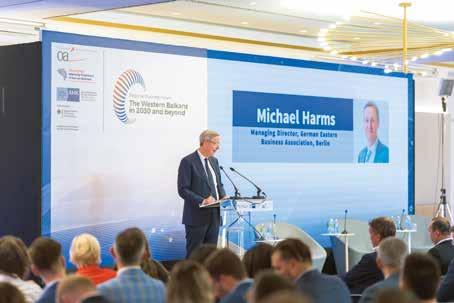
The formal opening of this forum was also attended by German Ambassador in Belgrade H.E. Anke Konrad and Serbian Minister of Domestic and Foreign Trade Tomislav Momirović.

cordmagazine.com 51
With this conference, which marks the 20th anniversary of our Zoran Đinđić German Business Internship Programme, we want to improve the dialogue between politics, civil society and business from the perspective of 2030 ~ Michael Harms
Gentlemen’s Agreement Gentlemen’s Agreement
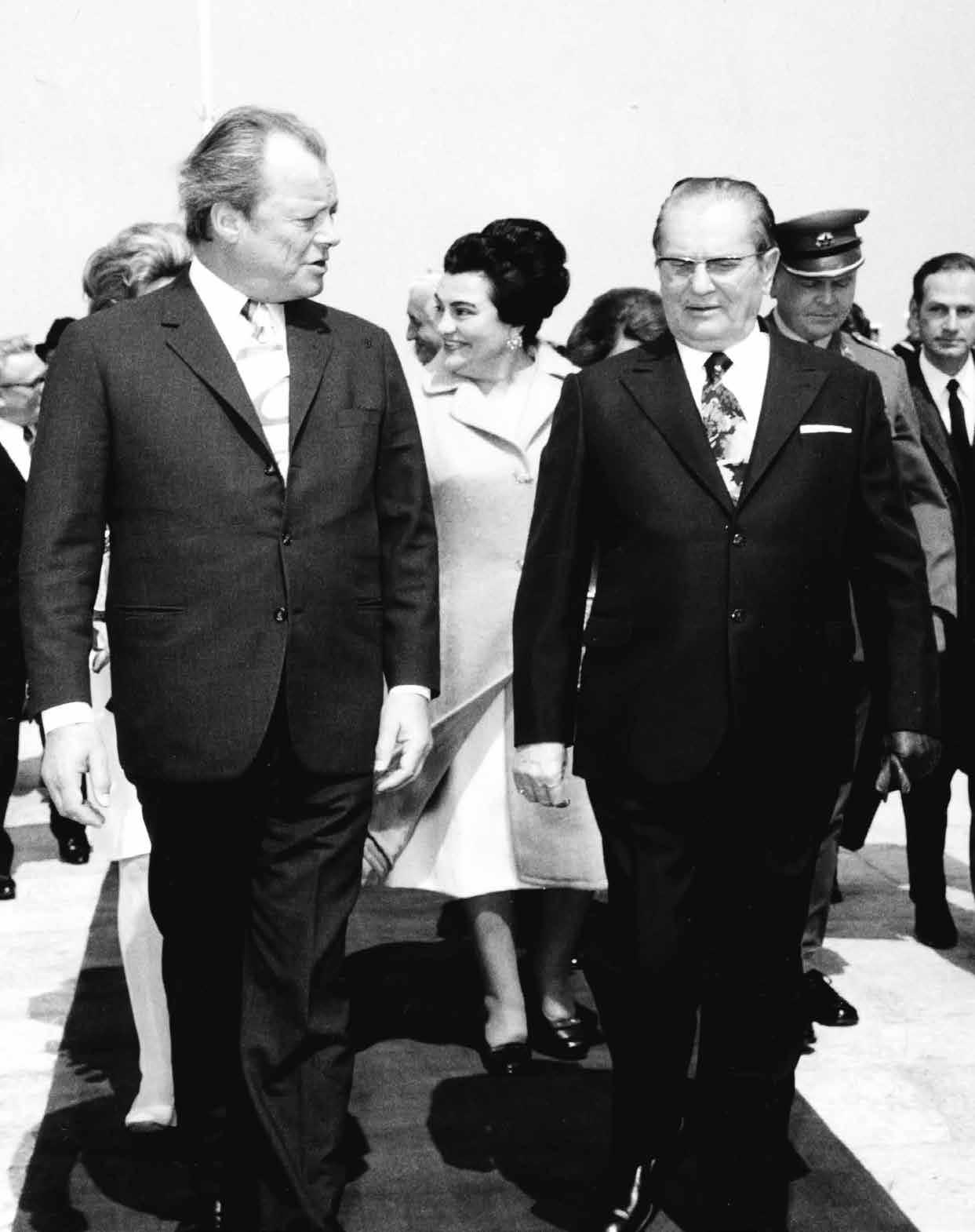
50TH ANNIVERSARY OF THE BRIONI MEETING OF TITO AND BRANDT
It was at 11:30am on the morning of 16th April 1973 that a plane carrying a West German delegation, led by Chancellor Willy Brandt, landed at Belgrade Airport. They were welcomed by a delegation of top representatives of the Yugoslav government, an honorary company of the Yugoslav People’s Army, together with a flag and a military band that performed the anthems of the two countries
By Natalija Dimić Lompar Photos Museum of Yougoslavia
Willy Brandt was the first chancellor of the then Federal Republic of Germany, aka West Germany, to pay an official visit to the Yugoslav capital, arriving in Belgrade 28 years after the end of World War II. The visit, including an official part that lasted four days, encompassed talks in Belgrade, followed by a stay in the Brioni islands, where meetings and talks were held with Yugoslav President Josip Broz Tito. According to the recollections of Tito’s personal translator for German, Ivan Ivanji, Tito was “fond of that German”. According to the Memoirs of Willy Brandt himself, he appreciated the politics of the Yugoslav president, who was 20 years his senior.
This wasn’t Brandt’s first visit to Yugoslavia, nor was it his first meeting with its president. Over the preceding two and a half decades, Brandt had followed the development of Yugoslavia studiously. As a socialist and anti-fascist
tential model for the transformation of East German society. And so it was that Brandt first travelled to Yugoslavia in 1955, though the prevailing anti-communist sentiment in West Germany meant that the trip unfolded in almost total secrecy. During his stay in Yugoslavia, Brandt took an interest in the system of workers’ self-management, the “Yugoslav road to socialism” and the Yugoslav interpretation of Marxism. However, his subsequent trips to Yugoslavia, in the role of Minister of Foreign Affairs in 1968 and Federal Chancellor in 1973, had a different political weight and function.
by political and ideological orientation, a man formed in a social democratic milieu, with the experience of having lived in exile in Scandinavia during the period of Nazi rule and residing in Spain at the height of the civil war with the aim of supporting the doomed republic, Brandt became interested in Yugoslavia as a socialist experiment after the 1948 Tito-Stalin split and the Informbiro period. As a representative of the Social Democratic Party of Germany in West Berlin after World War II and later mayor of West Berlin (1957–1966), Brandt was interested in the development of Yugoslavia as a po-
The issue of German reunification had been a central political issue for both German states since their 1949 creation. The West German governments of Konrad Adenauer (1949–1963) and Ludwig Erhard (1963–1966), both representatives of the Christian Democratic Union, pursued a policy of gradual sovereignty through Western integration, in the belief that negotiations with the East could only be led from a position of strength. They led a policy of non-recognition of the East German state, doctrinally defined in the so-called Hallstein Doctrine. According to it, recognition of the German Democratic Republic, aka East Germany, by third countries would be considered by the Government in Bonn as a “hostile act”. And Yugoslavia, which since the early 1950s had only maintained diplomatic relations with the West German state, recognised East Berlin in 1957 and thus sacrificed its diplomatic relations with Bonn.
Brandt wasn’t the only representative of political life in West Germany who was strongly opposed to this political doctrine. He believed that the policy of strength and isolation would only lead to detachment between the Germans living to the east and west of the Elbe, with this policy aimed at German reunification only leading down a blind alley. The construction of the Berlin Wall was merely the physical manifestation of this state of affairs. As an alternative, Brandt proposed “change through rapprochement” (Wandel durch Annährung). His “poli-
cordmagazine.com 53
The new Bonn government demonstrated its readiness to accept the burden of responsibility for its own history, but also to lay foundations for the future. It was precisely in the context of the new Eastern policy that his 1973 visit to Yugoslavia was significant
Brioni welcome reception for Federal Republic of Germany
Chancellor Willy Brandt and his wife Rut Brandt
cy of small steps” (Politik der kleinen Schritte) was intended to render the Berlin Wall porous. He believed in the attractiveness of the West, that individual contacts – the “flow” of people and goods, and with them ideas – would inevitably influence internal change in the societies behind the “Iron Curtain”. It was in this context
that Brandt also saw the development of Yugoslavia as an example of the transformation of a socialist society through contact with the West. Brandt received a chance to at least partially implement his policy in 1966, when he was appointed minister of foreign affairs in the coalition government formed with the Christian
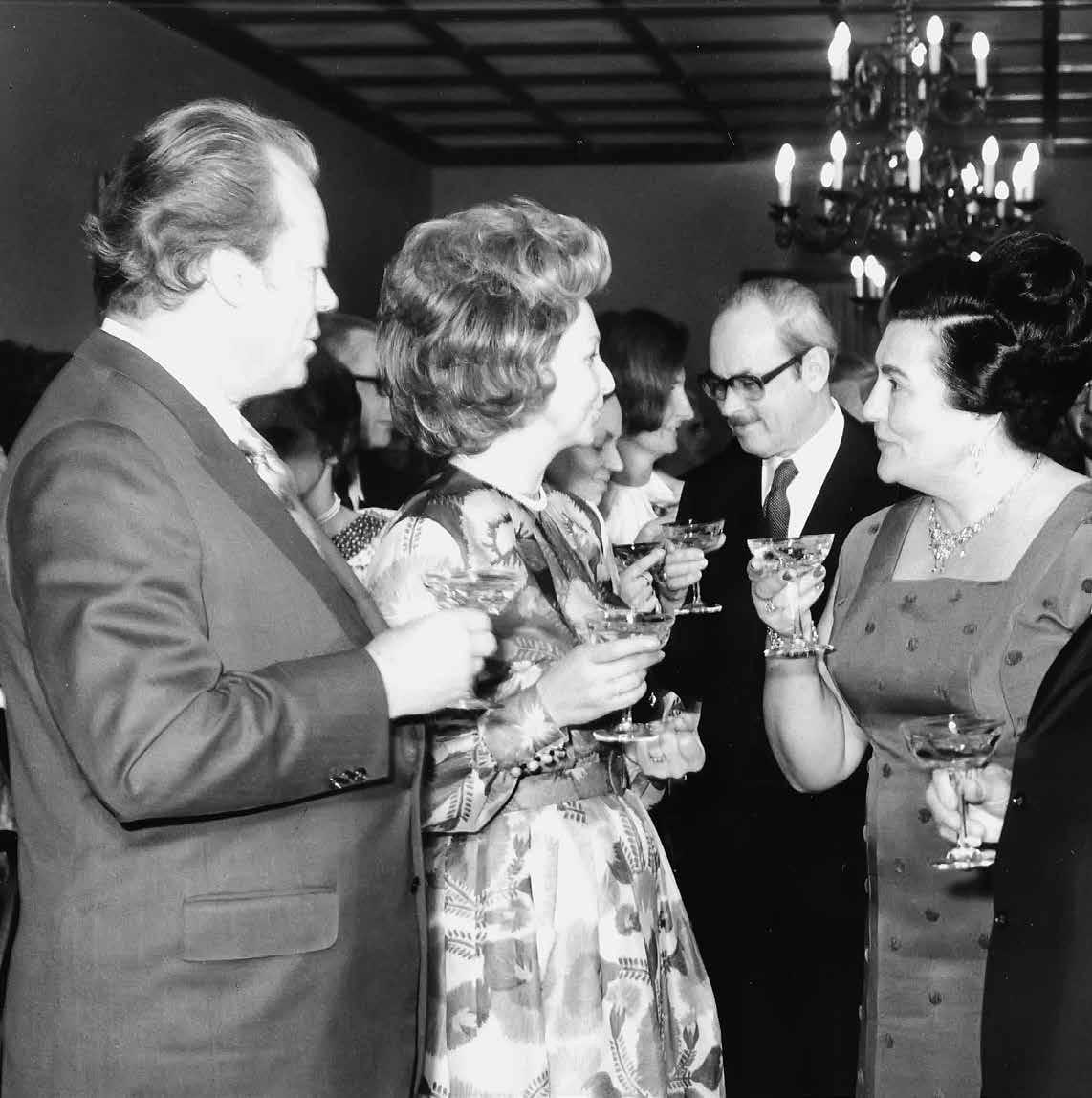
54 GERMANY 2023
Formal dinner in honour of Willy Brandt and his wife at the White Villa and the presenting of awards
Democratic Union. The so-called “new eastern policy” (Neue Ostpolitik) also led to the restoring of diplomatic relations between West Germany and Yugoslavia in January 1968.
However, while previous years had seen Bonn take only timid tiptoe steps towards rapprochement with the East, Brandt’s 1969 arrival in the position of chancellor marked a complete turnaround in West German foreign policy and German policy. The key result on this front was the signing of the so-called Eastern treaties (Ostverträge) with Moscow, Warsaw, East Berlin and Prague, with which the Government in Bonn ruled out any use of force and recognised the de facto existence of the German Democratic Republic and the Polish-German border on the Oder-Neisse line. Dropping to his knees in front of the Monument to the Ghetto Heroes in
were vital to the future of Germany, but also to the security of Yugoslavia. In Belgrade, Brandt was considered a man made of a different political cloth than Adenauer and his associates. It was noted that Brandt was an anti-fascist, which had special gravitas in the context of the complex negative legacy of Yugoslav-German relations and the ideological orientation of the Yugoslav authorities. Brandt’s arrival as head of West German diplomacy was welcomed with great optimism in Belgrade. This also explains Belgrade’s willingness to restore diplomatic relations with Bonn without any preconditions, in terms of demanding the resolving numerous bilateral issues accumulated over the preceding years. However, restoring relations was just the first step. Unresolved issues had yet to be remedied.
Warsaw and the whole watching world in 1970, Brandt made a symbolic gesture of repentance on behalf of the German people for the crimes of the Nazi regime. At the same time, his treaties with Eastern European countries testified to his decisiveness to lead a policy of compromise and the easing of tensions. In other words, the new Bonn government demonstrated its readiness to accept the burden of responsibility for its own history, but also to lay foundations for the future. It was precisely in the context of the new Eastern policy that his 1973 visit to Yugoslavia was significant.
There was undisguised fondness for the new West German chancellor in Yugoslavia. Over the course of the two decades preceding Brandt’s arrival at the helm of the government in Bonn, Yugoslav representatives in West Germany had maintained close contacts with social democratic leaders. Although Yugoslav communists and German social democrats had no ideological affiliations, they still managed to find common ground on issues that

While Yugoslavia could serve as a model of socialist transformation for Brandt the socialist and mayor, for Brandt the statesman, visiting Yugoslavia meant getting to grips with the extremely difficult legacy of German-Yugoslav relations. The central issue burdening relations was that of compensation for Yugoslavia’s victims of Nazi persecution. This issue represented a crucial obstacle in the rapprochement of Belgrade and Bonn for more than a decade. It had both economic and moral dimensions. During his talks with Tito in Brioni, the West German chancellor himself raised the issue of compensation, stressing that it was an open problem that needed to be discussed openly. Brandt emphasised that West Germany could no longer return to the past, while at the same time it couldn’t simply ignore its history or “sweep it under the rug”. The West German side offered capital assistance in the form of a loan totalling one billion Deutschemarks, and the Yugoslav side accepted to consider the issue closed with this indirect solution – albeit without explicitly mentioning compensation, so as not to set a precedent for other Eastern European countries.
During his time in Yugoslavia, Brandt also visited the National Library in Belgrade. In presenting a gift to the Library in the form of a consignment of replacement books for those that had perished in the German bombing of 6 th April, 1941, Brandt made a symbolic gesture of repentance on behalf of the German people for the devastation wrought during World War II. With the Brioni “Gentlemen’s Agreement” between Tito and Brandt, the two sides agreed to lay to rest open and painful problems from the past through a stake in the future, in the form of long-term arrangements to cooperate in various fields.
cordmagazine.com 55
During his talks with Tito in Brioni, the West German chancellor himself raised the issue of compensation, stressing that it was an open problem that needed to be discussed openly
Competing Unity in
As the Berlin Special Olympics drew to an end, organisers expressed hope that we are entering a new era of inclusivity
Abdulaziz Almubarak cheers after scoring a goal for Saudi Arabia during the men’s unified handball final rounds, played against Kenya, in the Horst-Korber Sports Center on June 20

SPECIAL OLYMPICS WORLD GAMES BERLIN 2023
Photo Christoph Soeder
Paul Kögler of Germany warms up for the golf competition, on the driving range at the Bad Saarow Golf Club in Brandenburg, Germany, on June 20, 2023
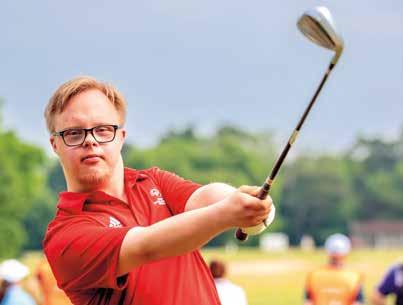
The 2023 Special Olympics World Games brought approximately 7,000 athletes from 170 countries to Berlin to compete in 26 sports this summer, with almost 20,000 volunteers working to ensure events ran smoothly. These athletes, representing individuals with intellectual disabilities, were vying for medals in events that included judo, powerlifting, badminton and bocce ball. Coordinated by the Special Olympics organisation, competitors were invited from dozens of national programmes (called SOs) to participate and be celebrated for their sporting achievements. As the organiser’s website explains: “The motto of the athletes of Special Olympics Germany is: ‘Nothing about us without us having a say.’”


57
Photo Alexander Hassenstein
Leo Heckel and Adrian Schlueter of Germany compete in the 1500-meter Unified Sports open-water swimming competition during day three, June 19, 2023, at Berlin’s Regattastrecke Grünau
Photo Andreas Gora


58 GERMANY 2023
PhotoJohn Macdougall Fireworks explode at the end of the opening ceremony of the Special Olympics World Games on June 17, 2023
Photo Alexander Hassenstein Nur Ameer Muqsiq Bin Baharuddin of Malaysia starts the 4-x-100-meter relay during the track-and-field competition on June 18, 2023
Competing representatives of each country brought water from their home nations to pour into a common pool in the middle of the stage, symbolically representing “Unity”, which is also the name of the Games’ heart-shaped mascot. Walking close to the back of the parade for the Opening Ceremony was the delegation from Ukraine, who entered the stadium to a standing ovation.
Sticking with the theme of the Opening Ceremony, Special Olympics Board Chairman Timothy Shriver accompanied the delegation from South Sudan, in a show of support to athletes from countries facing fragile sociopolitical climates. Speaking on stage, Mr Shriver celebrated the current moment when athletes, coach -
es, officials, volunteers and supporters could come together in the aftermath of a global pandemic and honour the spirit of the Games. He said at the time, “few things are more inhumane than humans being separated from oth
er human beings”.
German Chancellor Olaf Scholz also attending the opening of the Games and spoke of a peaceful, Olympic atmosphere. “This is a really great event,” Scholz continued. “It’s quite inspiring to see athletes take part here and how very committed and all-in they are.”
Germany hopes that the success of the 2023 Special Olympics will have an enduring impact and boost the country’s chances of hosting the 2036 Olympics and Paralympics.

cordmagazine.com 59
-
Photo Alexander Hassenstein Teresita Santander of Mexico reacts after competing in the 1500-meter Unified Sports open-water swimming competition on June 19, 2023
PACKED WITH PASSION
THE NEW GLC COUPÉ

Average fuel consumption: 5.1 – 5.8l/100 km, CO₂ emission (average) 135.0 - 152.0 g/km. Air pollutant emissions from traffic vastly contribute to overall air quality deterioration, especially in the case of above-average concentration of ground-level ozone, PM10 particles, PM2,5 particles and nitrogen-oxide. Stated figures represent determined „WLTP CO2 figures“ pursuant to Article 2, No. 3, of Implementing Regulation (EU) 2017/1153.
Fuel consumption figures have been calculated on this basis.










































 By Ljubica Gojgić
By Ljubica Gojgić

















































































































 By Radmila Stanković
By Radmila Stanković
























































 By Ljubica Gojgić
By Ljubica Gojgić



































































